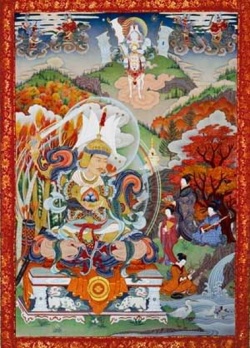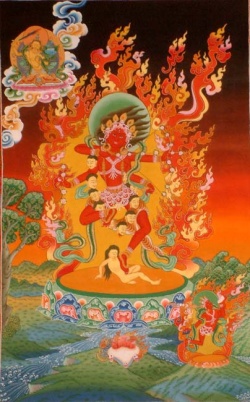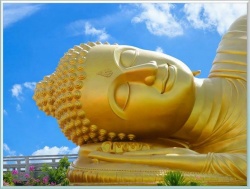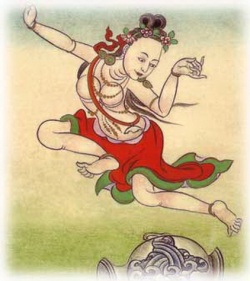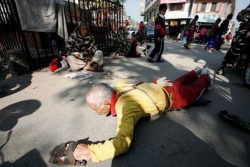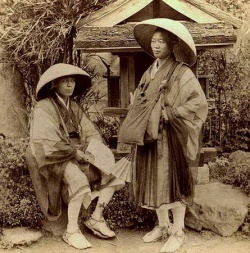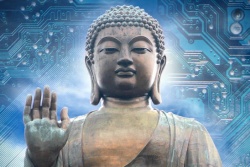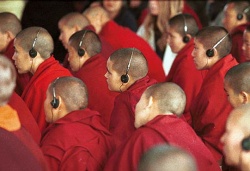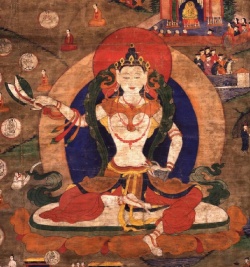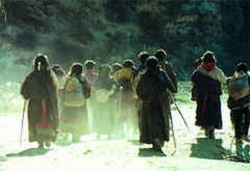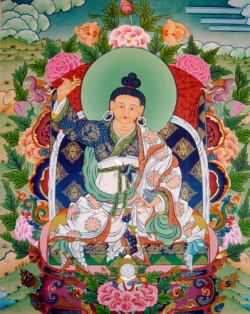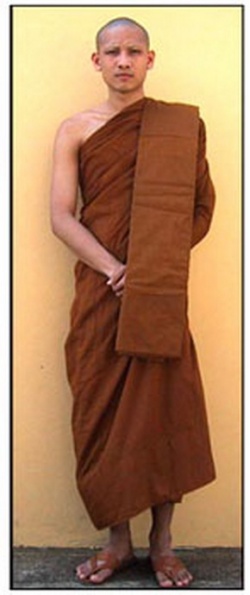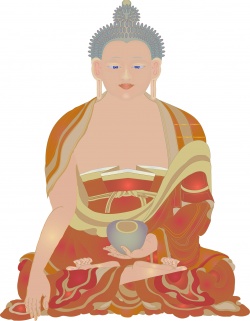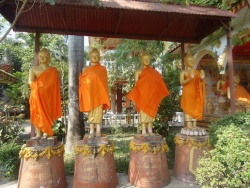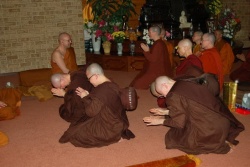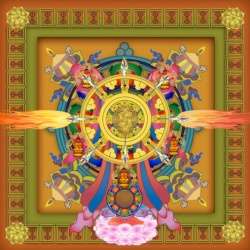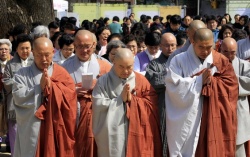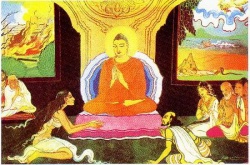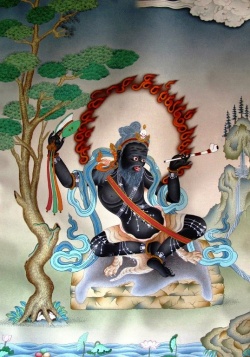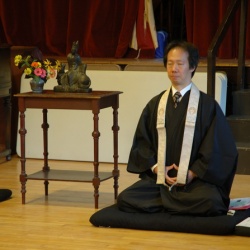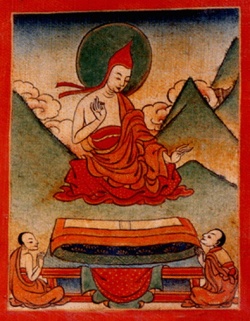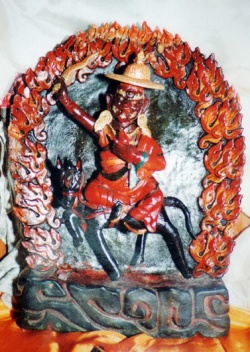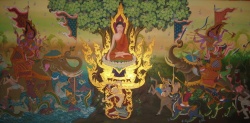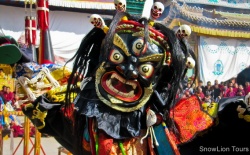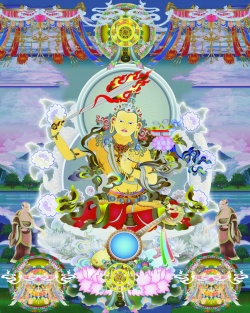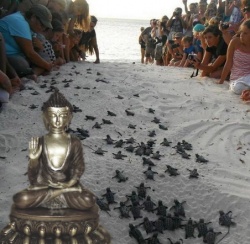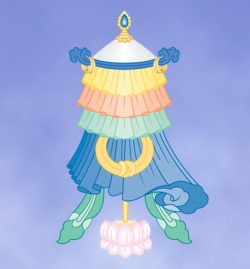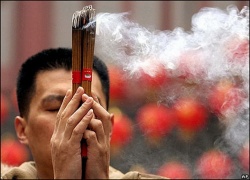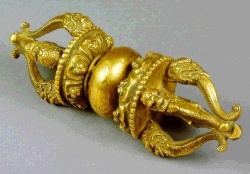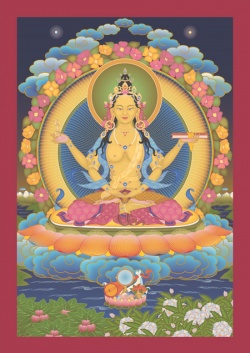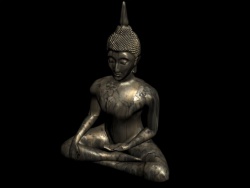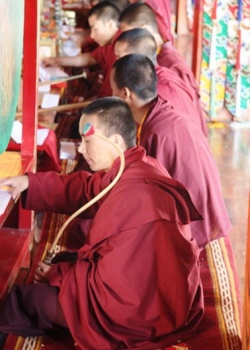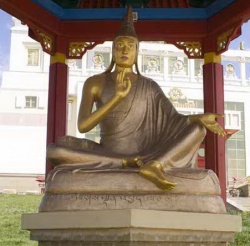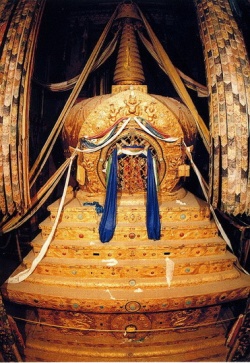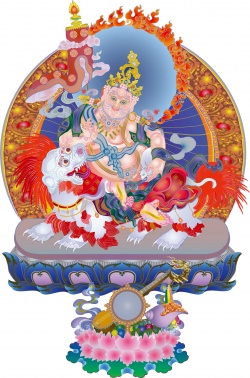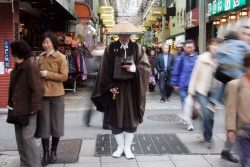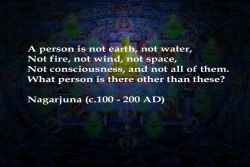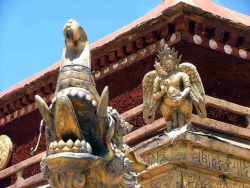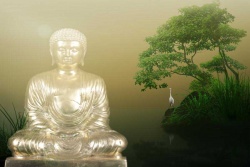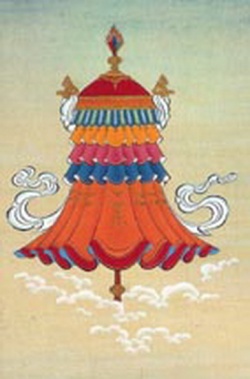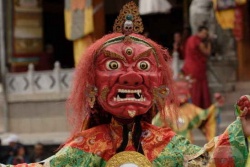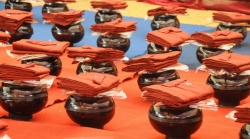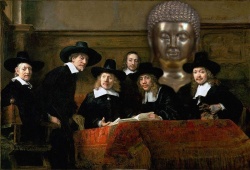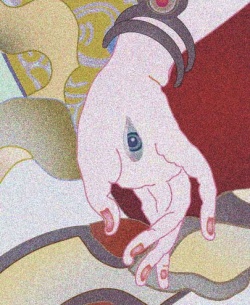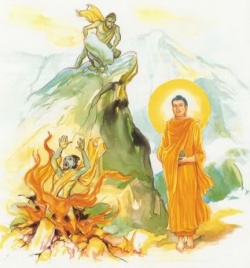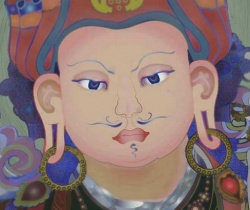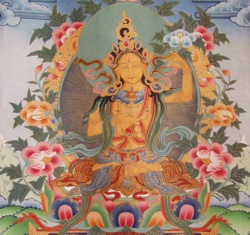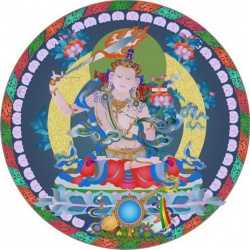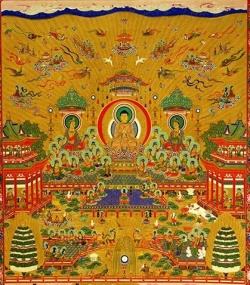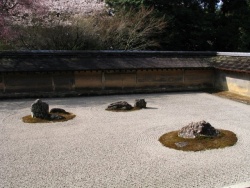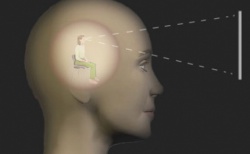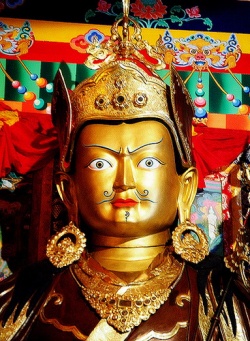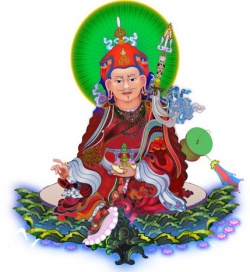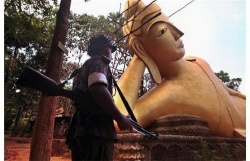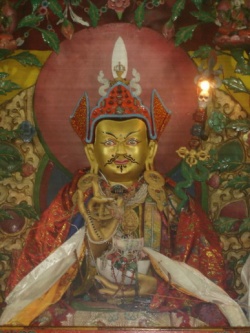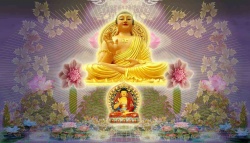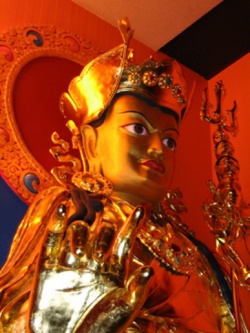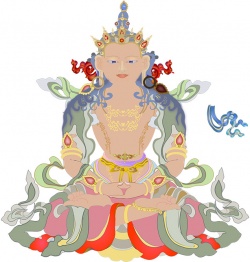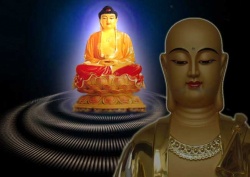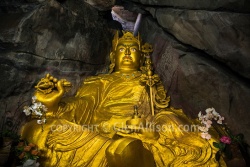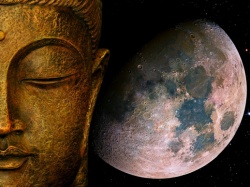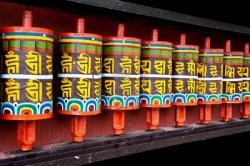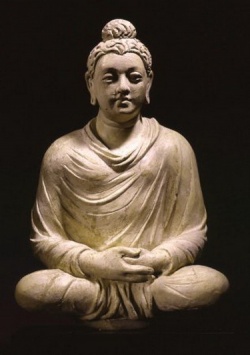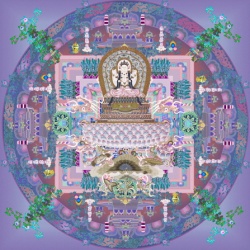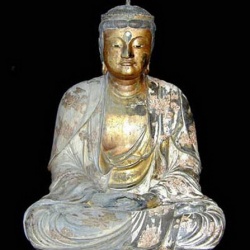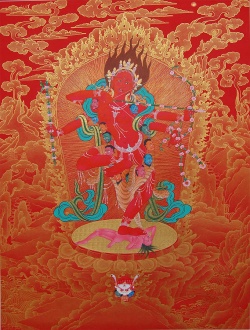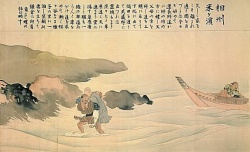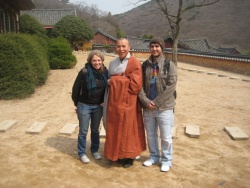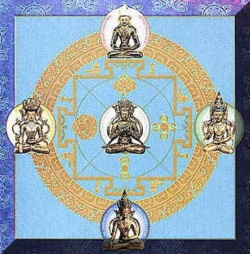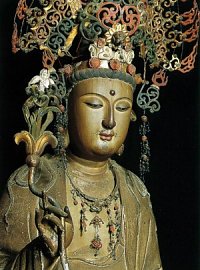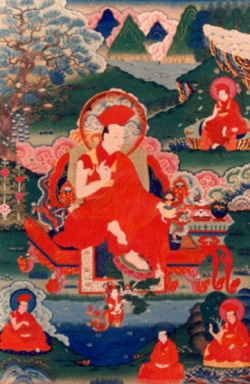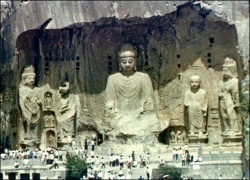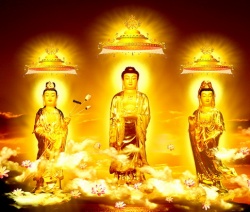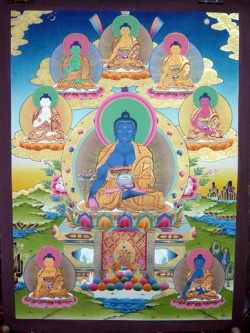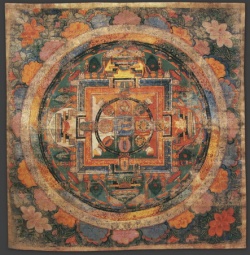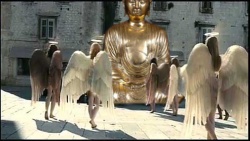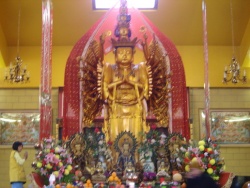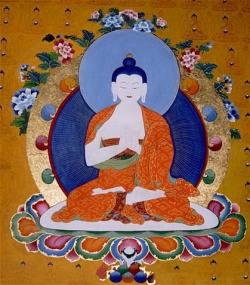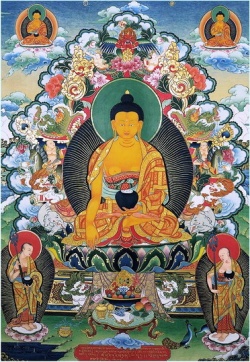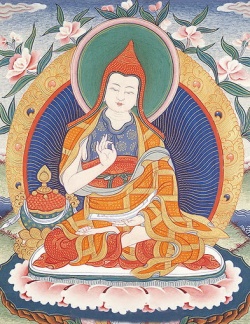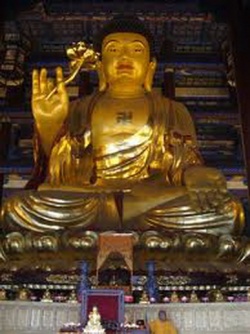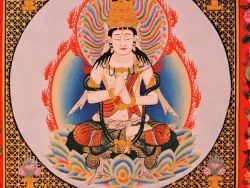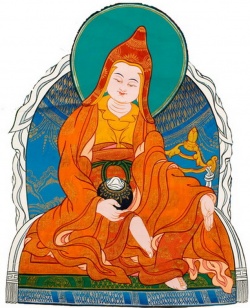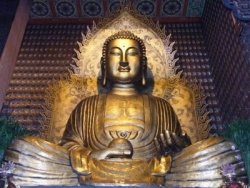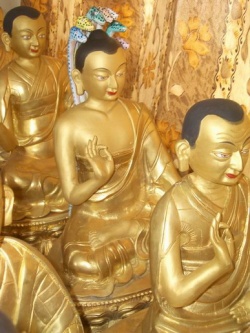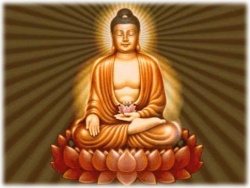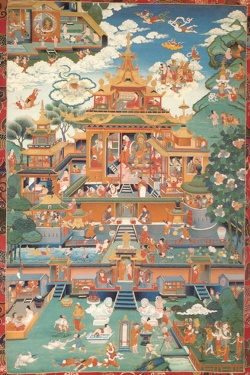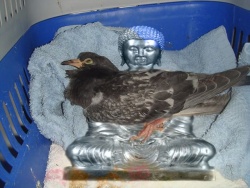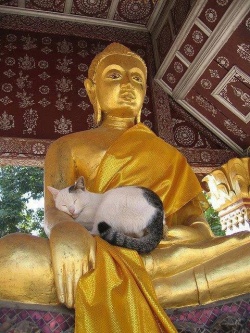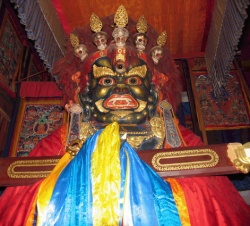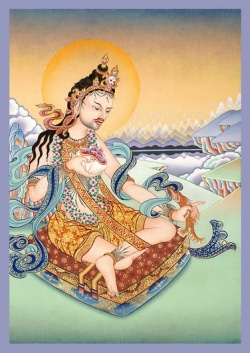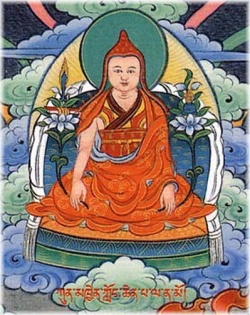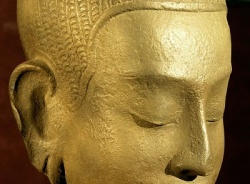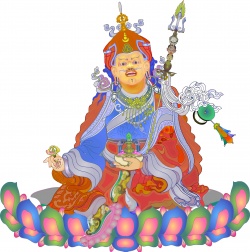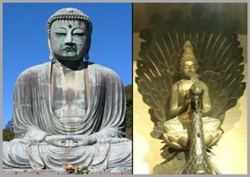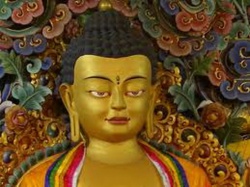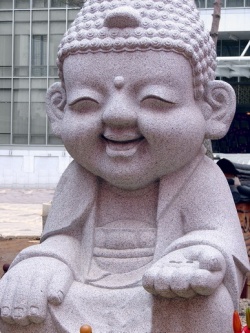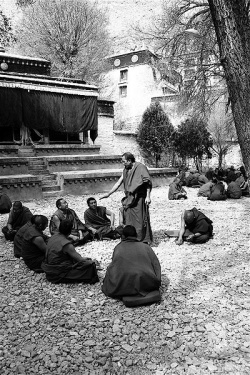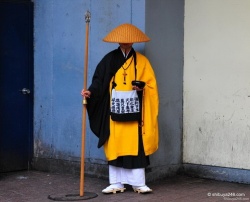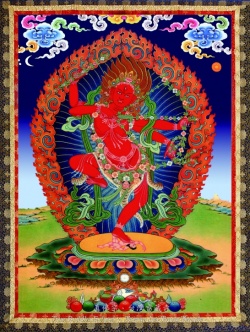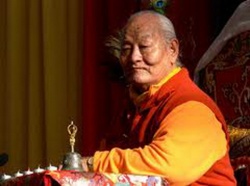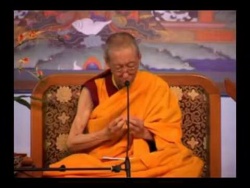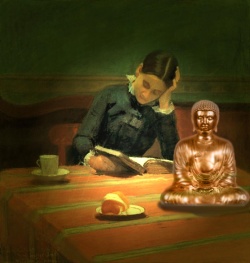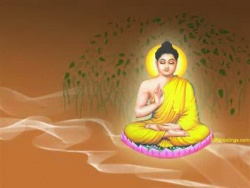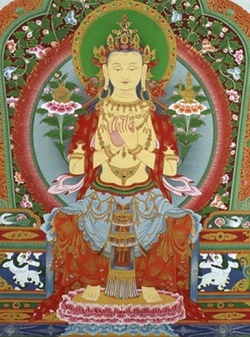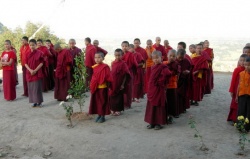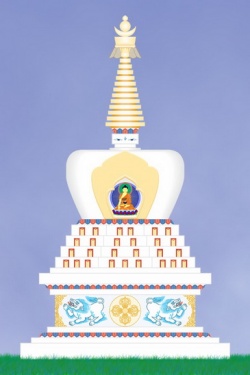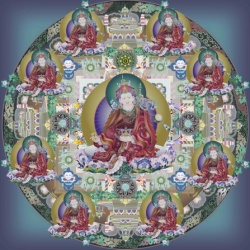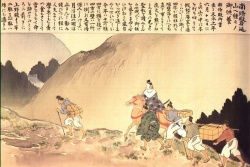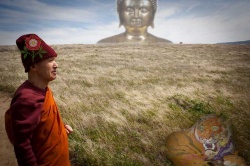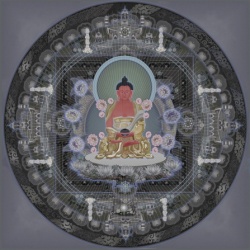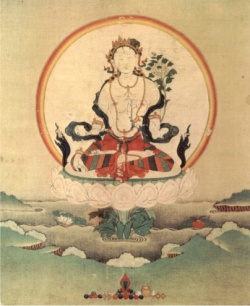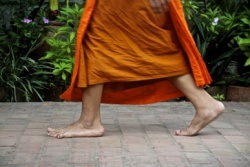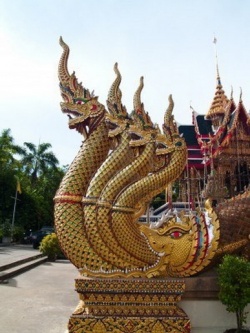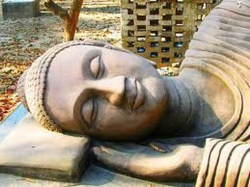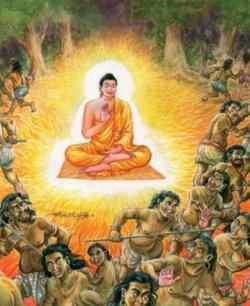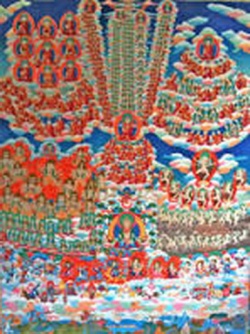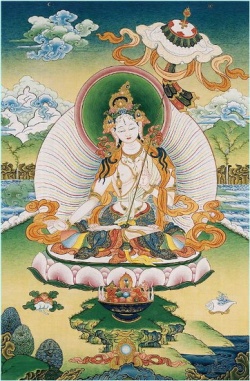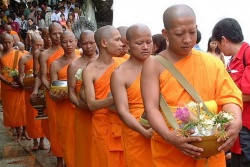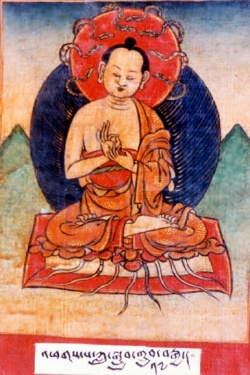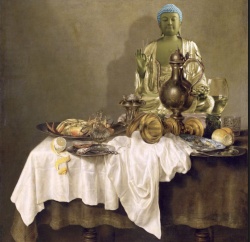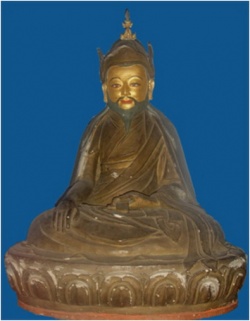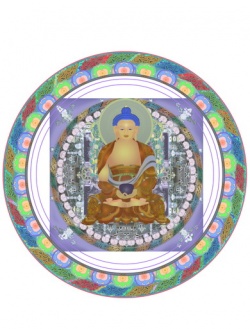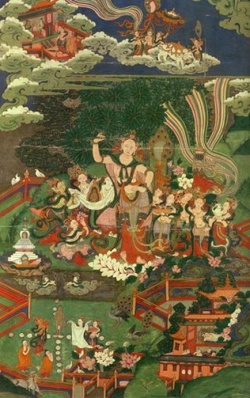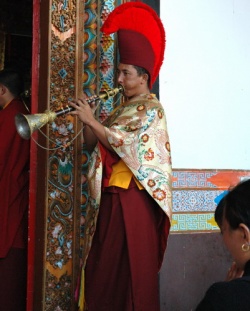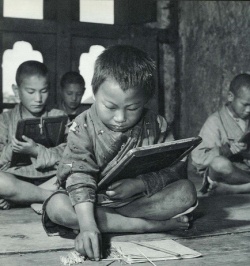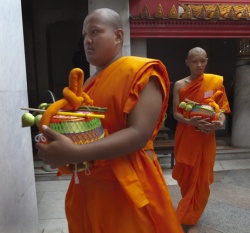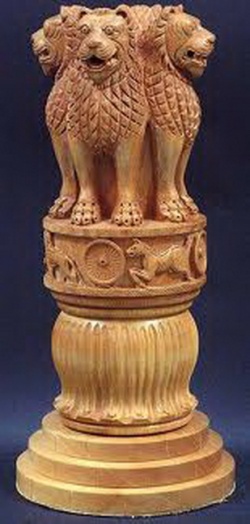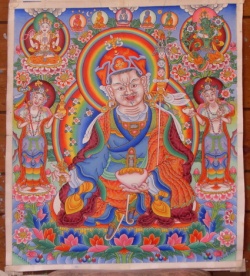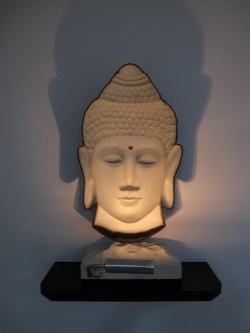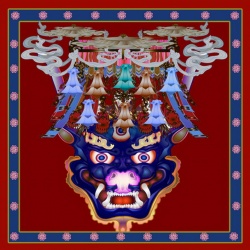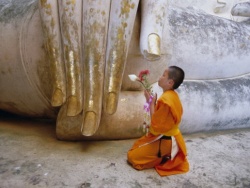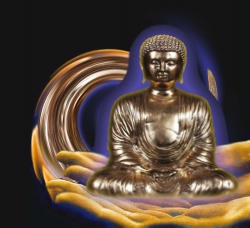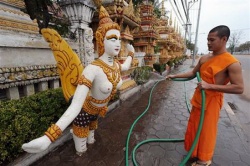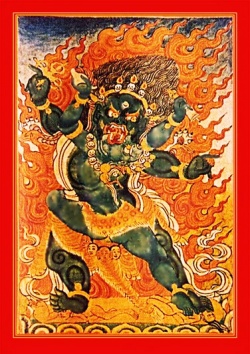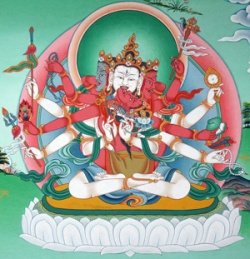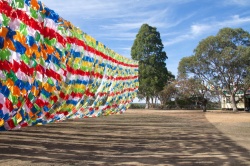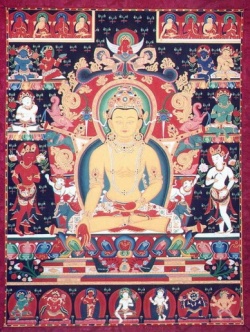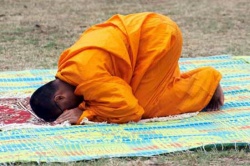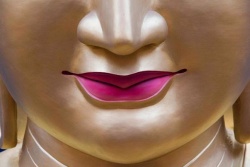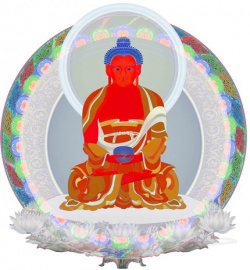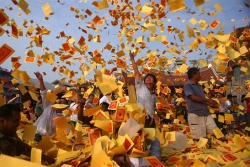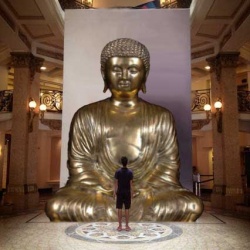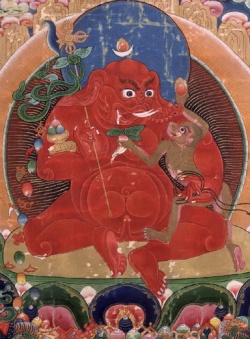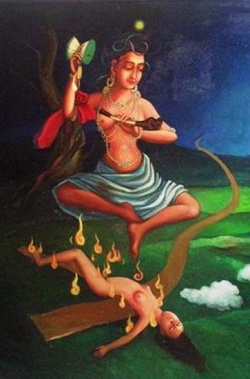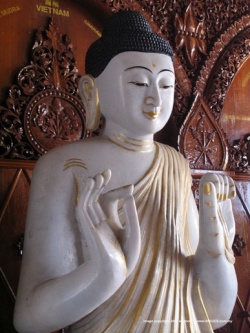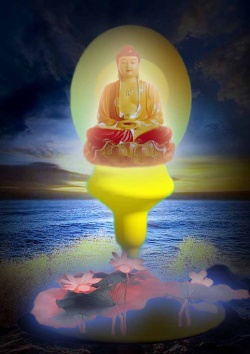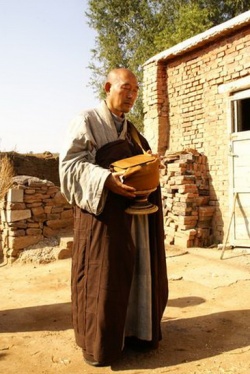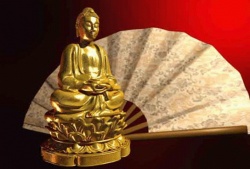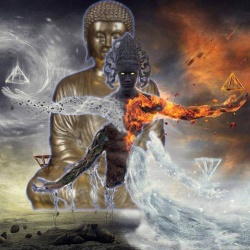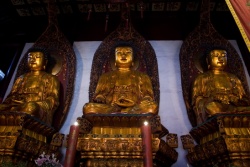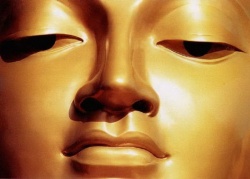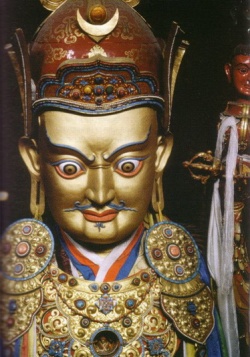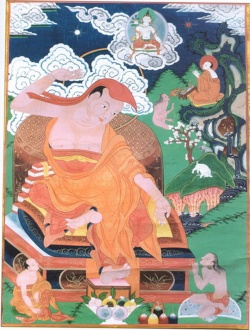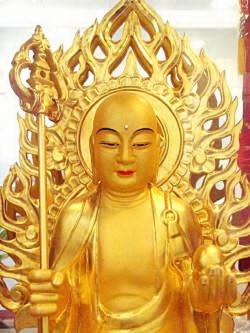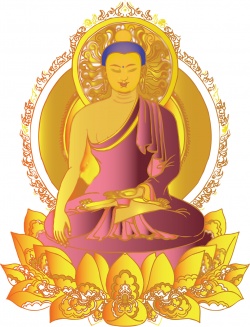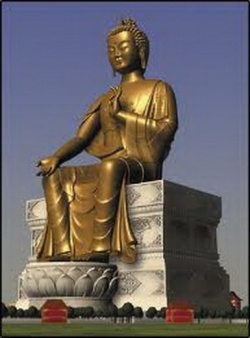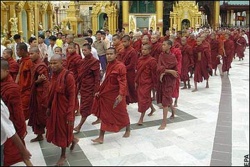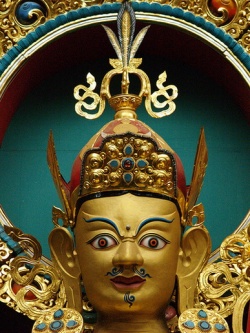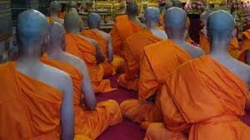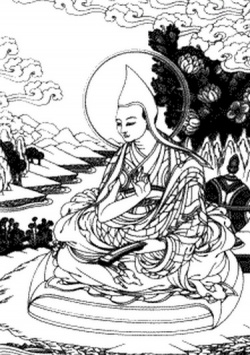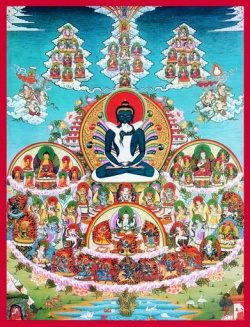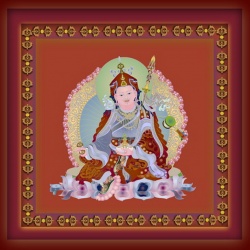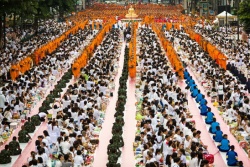Buddhist Wisdom Verses
</nomobile>
Buddhist Wisdom Verses
chosen by
The Most Venerable
Rerukane Candavimala Mahanāhimi
(Former Mahānāyaka of the Sri Lankan Svejin Nikāya)
translated by
Ānandajoti Bhikkhu
(first published, February 2011)
Contents
- 1 Preface
- 2 Introduction to the Text and Translation Edition
- 3 1: SīlavaggoVirtue
- 3.1 Jā 406 GandhārajātakaṁThe Gandhāra Realm
- 3.2 DN 14 Mahāpadānasuttaṁ [13]The Great Legend
- 3.3 Jā 84 AtthassadvārajātakaṁThe Gateways to Benefit
- 3.4 AN 8.54 DīghajāṇusuttaṁLong-Knee the Householder
- 3.5 DN 31 SigālasuttaṁAdvice to Sigāla
- 3.6 AN 5.58 LicchavikumārakasuttaṁThe Young Licchavis
- 3.7 AN 4.61 PattakammasuttaṁSuitable Deeds
- 3.8 DN 31 SigālasuttaṁAdvice to Sigāla
- 3.9 DN 31 SigālasuttaṁAdvice to Sigāla
- 4 2: PāpavaggoWickedness
- 5 3: DhammavaggoDhamma
- 5.1 Sn 1.10 ĀlavakasuttaṁThe Yakkha Ālavaka
- 5.2 Jā 537 MahāsutasomajātakaṁBodhisatta Sutasoma
- 5.3 SN 1.3.20 Dutiya-aputtakasuttaṁChildless
- 5.4 Jā 537 MahāsutasomajātakaṁBodhisatta Sutasoma
- 5.5 Jā 510 Ayogharajātakaṁ [39]Iron House Bodhisatta
- 5.6 SN 1.1.48 JetavanasuttaṁJeta's Wood
- 5.7 Jā 458 UdayajātakaṁBodhisatta Udaya
- 5.8 Jā 57 VānarindajātakaṁThe Monkey-King
- 5.9 Jā 58 TayodhammajātakaṁThe Three Things
- 5.10 Jā 92 MahāsārajātakaṁThe Rich Man
- 5.11 SN 1.1.33 SādhusuttaṁGood
- 5.12 Dhp 193 ĀnandattherapañhavatthuThe Elder Ānanda's Question
- 6 4: SukhavaggoGood
- 6.1 Dhp 331-3 MāravatthuMāra
- 6.2 Dhp 194 SambahulabhikkhuvatthuMany Monks
- 6.3 Dhp 290 AttanopubbakammavatthuDeeds Formerly Done by Oneself
- 6.4 Dhp 204 PasenadikosalavatthuKing Pasenadi of Kosala
- 6.5 SN 1.1.73 Vittasuttaṁ 04Wealth
- 6.6 Dhp 182 ErakapattanāgarājavatthuThe Nāga King Erakapatta
- 6.7 SN 1.1.51 JarāsuttaṁFading
- 6.8 Dhp 223 Uttarā-UpāsikāvatthuThe Laywoman Uttarā
- 6.9 Dhp 354 SakkapañhavatthuSakka's Questions
- 6.10 Jā 537 MahāsutasomajātakaṁBodhisatta Sutasoma
- 6.11 Dhp 251 Pañca-upāsakavatthuThe Five Lay Followers
- 6.12 SN 1.3.2 PurisasuttaṁPeople
- 6.13 Dhp 60 AññatarapurisavatthuA Certain Man
- 6.14 Dhp 155 MahādhanaseṭṭhiputtavatthuThe Son of the Merchant Mahādhana
- 7 5: AtthavaggoAdvantages
- 7.1 Jā 342 VānarajātakaṁThe Monkey
- 7.2 Jā 370 PalāsajātakaṁFoilage
- 7.3 Jā 218 KūṭavānijajātakaṁThe Fraudulent Merchant
- 7.4 Jā 189 SīhacammajātakaṁThe Lion's Skin
- 7.5 Jā 426 DīpijātakaṁThe Panther
- 7.6 Jā 223 PuṭabhattajātakaṁThe Pot of Food
- 7.7 Jā 539 Mahājanakajātakaṁ [68]King Mahājanaka
- 7.8 Jā 164 GijjhajātakaṁThe Vulture
- 7.9 Jā 100 Asātarūpajātakaṁ [69]The Disagreeable Form
- 7.10 Jā 126 AsilakkhaṇajātakaṁThe Sign of the Sword
- 7.11 Jā 97 NāmasiddhijātakaṁA Lucky Name
- 7.12 Jā 207 AssakajātakaṁPoverty
- 7.13 Sn 1.11 VijayasuttaṁSuccess
- 7.14 Dhp 129 ChabbaggiyabhikkhuvatthuThe Group-of-Six Monks
- 7.15 Dhp 131 Sambahulakumārakavatthu [72]Many Youths
- 7.16 Jā 362 SīlavīmaṁsajātakaṁEnquiring into Virtue
- 8 6: MittavaggoFriends
- 8.1 Jā 533 CūlahaṁsajātakaṁLittle Goose
- 8.2 Jā 121 KusanāḷijātakaṁThe Sacred reed
- 8.3 Jā 157 GuṇajātakaṁVirtue
- 8.4 Jā 83 KālakaṇṇijātakaṁBlack-Ear
- 8.5 Jā 473 MittāmittajātakaṁFriends and Foes
- 8.6 DN 31 SigālasuttaṁAdvice to Sigāla
- 8.7 AN 7.36 PaṭhamamittasuttaṁFriends
- 8.8 AN 7.37 DutiyamittasuttaṁFriends
- 8.9 SN 1.1.53 MittasuttaṁFriends
- 9 7: DubbhavaggoTreachery
- 10 8: VacanavaggoWords
- 10.1 Jā 361 VaṇṇārohajātakaṁBeauty
- 10.2 Jā 312 KassapamandiyajātakaṁStupid Kassapa
- 10.3 Jā 131 AsampadānajātakaṁWithout Reason
- 10.4 Dhp 78 ChannattheravatthuThe Elder Channa
- 10.5 Jā 528 MahābodhijātakaṁBodhisatta Mahābodhi
- 10.6 Jā 476 JavanahaṁsajātakaṁThe Swift Goose
- 10.7 Jā 349 SandhibhedajātakaṁA Breaker of Bonds
- 11 9: KataññutāvaggoGratefulness
- 11.1 Jā 429 MahāsukajātakaṁThe Parrot
- 11.2 Jā 430 CullasukajātakaṁThe Parrot
- 11.3 Jā 44 MakasajātakaṁThe Mosquito
- 11.4 Jā 522 SarabhaṅgajātakaṁBodhisatta Sarabhaṅga
- 11.5 SN 1.11.11 VatapadasuttaṁThe (Seven) Vows
- 11.6 Jā 72 SīlavanāgarājajātakaṁThe Virtuous Dragon-King
- 11.7 Jā 73 SaccaṁkirajātakaṁAsservation of Truth
- 11.8 Jā 150 SañjīvajātakaṁThe Brahmin Youth Sañjīva
- 11.9 Jā 302 Mahā-assārohajātakaṁ [121]The Great Horseman
- 11.10 Jā 445 NigrodhajātakaṁThe Bodhisatta Nigrodha
- 11.11 Jā 90 AkataññujātakaṁUngratefulness
- 11.12 Jā 409 DaḷhadhammajātakaṁSteadiness
- 11.13 AN 3.26 SevitabbasuttaṁTo Be Associated With
- 11.14 Jā 308 JavasakuṇajātakaṁThe Swift Bird
- 12 10: Sevanavaggo 1Association 1
- 12.1 Jā 435 HaliddirāgajātakaṁTurmeric Dye
- 12.2 Jā 161 IndasamānagottajātakaṁOne of Indasamāna's Clan
- 12.3 Jā 162 SanthavajātakaṁIntimacy
- 12.4 Jā 141 GodhajātakaṁThe Iguana
- 12.5 Iti 76 SukhapatthanāsuttaṁWishing for Happiness
- 12.6 SN 1.3.11 SattajaṭilasuttaṁSeven yogis
- 12.7 Jā 384 DhammadhajajātakaṁThe Show of Truth
- 13 11: Sevanavaggo 2Association 2
- 14 12: Vissāsavaggo 2Trust
- 15 13: YācanavaggoBegging
- 16 14: NindavaggoBlame
- 16.1 AN 8.5 PaṭhamalokadhammasuttaṁWorldy Things
- 16.2 Dhp 227-8 Atula-upāsakavatthuThe Layman Atula
- 16.3 Dhp 81 LakuṇṭakabhaddiyattheravatthuThe Elder Lakuṇṭaka Bhaddiya
- 16.4 Ud 3.3 YasojasuttaṁThe Monk Yasoja
- 16.5 AN 5.48 AlabbhanīyaṭhānasuttaṁUnobtainable States
- 16.6 Jā 351 MaṇikuṇḍalajātakaṁJewelled Earrings
- 16.7 Jā 461 DasarathajātakaṁKing Dasaratha
- 17 15: KammavaggoDeeds
- 17.1 Dhp 127 SuppabuddhasakyavatthuThe Sakyan Suppabuddha
- 17.2 SN 1.3.15 DutiyasaṅgāmasuttaṁBattles
- 17.3 Dhp 125 KokasunakhaluddakavatthuThe Hunter Koka's Dogs
- 17.4 Dhp 137-140 MahāmoggallānattheravatthuThe Elder Mahāmoggallāna
- 17.5 Dhp 121 AsaññataparikkhārabhikkhuvatthuThe Monk Unrestrained towards Requisites
- 17.6 Dhp 69 UppalavaṇṇattherīvatthuThe Elder Nun Uppalavaṇṇā
- 17.7 Dhp 71 AhipetavatthuThe Snake-Ghost
- 17.8 Dhp 123 MahādhanavāṇijavatthuThe Trader Mahādhana
- 17.9 SN 1.2.22 KhemasuttaṁThe Godly Son [195] Khema
- 17.10 Dhp 246-7 Pañca-UpāsakavatthuFive Laymen
- 17.11 Dhp 16 Dhammika-UpāsakavatthuThe Layman Dhammika
- 17.12 SN 1.3.4 PiyasuttaṁThe Dear One
- 17.13 Jā 382 SirikālakaṇṇijātakaṁSirī and Kālakaṇṇi
- 17.14 Jā 537 MahāsutasomajātakaṁBodhisatta Sutasoma
- 17.15 Jā 386 KharaputtajātakaṁThe Donkey
- 17.16 Dhp 163 SaṅghabhedaparisakkanavatthuAttempting to Split the Community
- 17.17 Ud 5.8 ĀnandasuttaṁThe Elder Ānanda
- 18 16: VāyāmavaggoEffort
- 18.1 Jā 539 Mahājanakajātakaṁ [207]Bodhisatta Mahājanaka
- 18.2 SN 1.2.8 Tāyanasuttaṁ [208]The Godly Son Tāyana
- 18.3 MN 131 [209] BhaddekarattasuttaṁOne Fortunate Night
- 18.4 Iti 78 DhātusosandanasuttaṁFlowing from the Elements
- 18.5 Jā 71 VaraṇajātakaṁThe Varaṇa Tree
- 18.6 DN 31 SigālasuttaṁAdvice to Sigāla
- 18.7 Jā 49 NakkhattajātakaṁLucky Stars
- 18.8 Jā 4 CullaseṭṭhijātakaṁThe Junior Merchant
- 18.9 Jā 284 SirijātakaṁGood Luck
- 18.10 Jā 152 SigālajātakaṁThe Jackal
- 18.11 Jā 505 SomanassajātakaṁBodhisatta Somanassa
- 19 17: DhanavaggoWealth
- 19.1 Jā 322 DaddabhajātakaṁThe Thud
- 19.2 Jā 204 VīrakajātakaṁBodhisatta Vīraka
- 19.3 Jā 335 JambukajātakaṁThe Jackal
- 19.4 Jā 345 GajakumbhajātakaṁThe Tortoise
- 19.5 Jā 183 VālodakajātakaṁWatery Drink
- 19.6 Jā 291 Bhadraghaṭajātakaṁ [231]The Auspicious Pot
- 19.7 Jā 48 VedabbhajātakaṁThe Brāhman Vedabbha
- 19.8 SN 1.3.19 Paṭhama-aputtakasuttaṁChildless
- 19.9 Jā 390 MayhakajātakaṁThe bird named Mine
- 19.10 AN 7.5 SaṅkhittadhanasuttaṁTreasures in Brief
- 20 18: VasanavaggoDwelling
- 21 19: BhāsanavaggoSpeech
- 21.1 Jā 98 KūṭavāṇijajātakaṁThe Fraudulent Merchant
- 21.2 Jā 331 KokālikajātakaṁKokālika
- 21.3 SN 1.6.9 TudubrahmasuttaṁThe High Divinity Tudu
- 21.4 SN 1.8.5 SubhāsitasuttaṁWell Spoken
- 21.5 Jā 88 SārambhajātakaṁBodhisatta Sārambha
- 21.6 Jā 537 MahāsutasomajātakaṁBodhisatta Sutasoma
- 21.7 SN 1.8.5 SubhāsitasuttaṁWell Spoken
- 21.8 Jā 320 SuccajajātakaṁAn Easy Gift
- 21.9 Jā 499 SivijātakaṁThe Bodhisatta King Sivi
- 21.10 Jā 422 CetiyajātakaṁThe Land of Cetiya
- 21.11 Dhp 176 CiñcamāṇavikāvatthuCiñca Māṇavikā
- 22 20: VajjavaggoFaults
- 22.1 SN 1.1.35 UjjhānasaññisuttaṁPerceiving Offense
- 22.2 Jā 392 BhisapupphajātakaṁLotus-Flower
- 22.3 Dhp 252 MeṇḍakaseṭṭhivatthuThe Merchant Meṇḍaka
- 22.4 Dhp 253 UjjhānasaññittheravatthuThe Elder named Complainer
- 22.5 Dhp 50 PāveyyakājīvakavatthuThe Naked Ascetic from Pāva
- 22.6 Jā 522 SarabhaṅgajātakaṁBodhisatta Sarabhaṅga
- 22.7 SN 1.11.4 VepacittisuttaṁThe Demon Vepacitti
- 23 21: KāmavaggoDesires
- 23.1 Jā 136 SuvaṇṇahaṁsajātakaṁThe Golden Goose
- 23.2 Jā 228 KāmanītajātakaṁLed by Desire
- 23.3 Dhp 216 AññatarabrāhmaṇavatthuA Certain Brāhman
- 23.4 Jā 467 KāmajātakaṁDesires
- 23.5 Jā 14 VātamigajātakaṁThe Wind Deer
- 23.6 Jā 346 KesavajātakaṁThe Teacher Kesava
- 23.7 SN 1.3.13 DoṇapākasuttaṁA Measure of Food
- 23.8 SN 1.1.10 AraññasuttaṁThe Wilds
- 24 22: KodhavaggoAnger
- 24.1 SN 1.7.1 DhanañjānīsuttaṁThe Brāhmaṇī Dhanañjānī
- 24.2 Jā 443 CullabodhijātakaṁBodhisatta Cullabodhi
- 24.3 AN 7.64 KodhanasuttaṁThe Angry One
- 24.4 Jā 400 DabbhapupphajātakaṁGreeny
- 24.5 Dhp 201 Kosalarañño ParājayavatthuThe King of Kosala's Defeat
- 24.6 Jā 451 CakkavākajātakaṁThe Ruddy Goose
- 24.7 Dhp 5 KāḷayakkhinīvatthuThe Black Ogress=
- 24.8 Dhp 291 Kukkuṭa-aṇḍakhādikāvatthuThe Woman who Ate a Hen's Eggs
- 24.9 Dhp 130 ChabbaggiyabhikkhuvatthuThe Group of Six Monks
- 24.10 Jā 33 SammodamānajātakaṁJoyously
- 24.11 23: BālavaggoFools
- 24.12 Dhp 64 UdāyittheravatthuThe Elder Udāyī
- 24.13 Dhp 63 GaṇṭhibhedakacoravatthuThe Knot-Breaking Thief
- 24.14 Dhp 72 SaṭṭhikūṭasahassapetavatthuThe Ghost hit by Sixty-Thousand Sledgehammers
- 24.15 Jā 122 DummedhajātakaṁThe Unintelligent
- 24.16 Jā 46 ĀrāmadūsakajātakaṁSpoiling the Park
- 24.17 Jā 45 RohiṇijātakaṁThe Maid Rohiṇī
- 24.18 Jā 480 AkittijātakaṁBodhisatta Akitti
- 24.19 Jā 522 SarabhaṅgajātakaṁBodhisatta Sarabhaṅga
- 24.20 Sn 3.11 NālakasuttaṁAsita's Nephew Nālaka
- 24.21 Jā 202 KeḷisīlajātakaṁThe Jester
- 24.22 Jā 522 SarabhaṅgajātakaṁBodhisatta Sarabhaṅga
- 25 24: CittavaggoMind
- 25.1 SN 1.1.62 CittasuttaṁThe Mind
- 25.2 Dhp 42 NandagopālakavatthuThe Herdsman Nanda
- 25.3 Dhp 43 SoreyyattheravatthuThe Elder Soreyya
- 25.4 Jā 185 AnabhiratijātakaṁDiscontent
- 25.5 Ud 4.4 JuṇhasuttaṁMoonlight
- 25.6 Jā 118 VaṭṭakajātakaṁThe Quail
- 25.7 Jā 6 DevadhammajātakaṁGodly
- 25.8 Jā 423 IndriyajātakaṁSenses
- 25.9 Jā 545 VidhurajātakaṁBodhisatta Vidhura
- 25.10 Jā 332 RathalaṭṭhijātakaṁThe Driving Stick
- 25.11 Jā 431 HāritajātakaṁBodhisatta Hārita
- 25.12 Jā 107 SālittakajātakaṁStone Slinging
- 26 25: ItthivaggoWomen
- 26.1 Jā 108 BāhiyajātakaṁThe Outsider
- 26.2 Jā 489 SurucijātakaṁBodhisatta Splendid
- 26.3 Jā 547 VessantarajātakaṁBodhisatta Vessantara
- 26.4 AN 5.33 Uggahasuttaṁ [319]The Householder Uggaha
- 26.5 AN 7.63 SattabhariyāsuttaṁSeven Wives
- 26.6 AN 4.53 PaṭhamasaṁvāsasuttaṁLiving Together
- 26.7 Jā 545 VidhurajātakaṁBodhisatta Vidhura
- 26.8 26: PuttavaggoChildren
- 26.9 AN 3.31 SabrahmakasuttaṁWith the Brahmās
- 26.10 Iti 74 PuttasuttaṁChildren
- 26.11 AN 5.39 PuttasuttaṁChildren
- 26.12 Jā 532 SoṇanandajātakaṁBrothers Soṇa and Nanda
- 26.13 27: OvādavaggoAdvice
- 26.14 Jā 537 MahāsutasomajātakaṁBodhisatta Sutasoma
- 26.15 Jā 474 AmbajātakaṁMangoes
- 26.16 Dhp 76 RādhattheravatthuThe Elder Rādha
- 26.17 Dhp 77 AssajipunabbasukavatthuThe Monks who follow Assaji and Punabbasuka
- 26.18 Jā 43 VeḷukajātakaṁBamboo
- 26.19 Jā 196 ValāhassajātakaṁThe Cloud-Horse
- 26.20 Jā 376 Avāriyajātakaṁ [347]The Ferryman Avāriya
- 26.21 Dhp 158 UpanandasakyaputtattheravatthuThe Elder Upananda, Son of the Sakyans
- 26.22 Jā 37 TittirajātakaṁThe Partridge
- 26.23 Jā 334 RājovādajātakaṁAdvice to a King
- 26.24 Jā 472 MahāpadumajātakaṁThe Bodhisatta called Great Lotus
- 27 28: AppamādavaggoHeedful
- 28 Footnotes
- 29 Source
Preface
- Sutvā Dhammaṁ vijānanti narā kalyāṇapāpakaṁ,
- After hearing the Dhamma people understand what is good and bad,
- Api gāthā suṇitvāna Dhamme me ramate mano.
- After hearing these verses my mind delights in the Dhamma.
- from the Sutasomajātakaṁ
The following work is based on a book known under its Sinhala title as the Buddha Nīti Saṅgrahaya of Ven. Rerukane Candavimala, the former Mahānāyaka of the Swejin Nikāya in Sri Lanka, which is my ordination sect.
Ven. Rerukane Candavimala, who passed away in 1999 just short of his 100th brithday, was one of the foremost scholars in Sri Lanka in the 20th century, and his works, which cover the whole range of Buddhist studies, including Vinaya, Discourses, Abhidhamma and Meditation, are all still standard works of reference in the country.
Unfortunately his impact has been limited to the Sinhala speaking peoples, as only one of his many works (there are more than 30) has so far been translated into English: Analysis of Perfections (BPS, Kandy 2003), original title (Paramatthaprakaranaya).
I hope the present work, which has been a long-cherished project, will go some way to making his name better known in the English-speaking world, and it is offered as a small tribute to the Venerable Monk's life and work.
* * *
In preparing this volume for publication I have made a number of changes which seemed necessary during the course of my working on the text.
The most obvious of these is the division of the verses into chapters, whereas in the original they were organised into hundreds (sataka). [1] I feel this helps to identify the sections and makes it easier for people to access relevant material also. The chapters are each around 20 verses long, so another advantage is they become easy enough to read and digest a chapter at a time.
I have also added in a short synopsis of the story that forms the basis for the verses, as in many cases it was difficult or even impossible to make sense of the verse without it, especially when there were references to characters in the verses that appeared in the stories; and I have further pointed out the moral of the verses. [2] In a few cases, where I felt that some verses contained matter that is offensive to our modern sensibilities, I have replaced them with verses which I deem to be more appropriate. [3]
It has proved necessary to re-establish the texts that were used. I was not intending to do this, but the fact of the matter is the original publication contains many mistakes in the printing, and in checking these it also became clear that there were many readings that could be adopted that would make better sense than the ones the text employed. I therefore eventually checked the text (Text) against the Sinhalese Buddha Jayanti (BJT) edition, the Burmese Chaṭṭha Saṅgāyana (ChS) and the Royal Thai (Thai) editions also.
I have also added in better references than were given in the original, where it would only say something like: Saṁyutta Nikāya; or Dh. Malavagga; or 30 Ni. Mahākapi Jā; and so on. Here I give more exact references: SN 1.1.76 Najīratisuttaṁ; Dhp 246-7 Pañca-Upāsakavatthu (the title coming from the commentary); Jā 516 Mahākapijātakaṁ. I have included some cross-references when they came to my notice, though I would have liked to have been more thorough about this.
I have divided the text into 3 editions so that readers can find the most appropriate one for their reading. The first is in Pāḷi-only, which shows the complete framework for the establishment of the text, including all the metrical information that helped in choosing the readings. I have also read in the text and am making it available as mp3 files, so that students can hear what the text and the metres sound like.
The Text and Translation edition on the other hand leaves out all the metrical information, and presents the text with the Pāḷi and the translation line by line, and gives a translation of the alternative readings, whenever they differed from the adopted text. This is useful for students, who want to gain access to the original language, but for whom a translation is still a necessary help.
The English edition is for those who simply want to read and understand the teachings that are contained in the verses, or are seeking advice on the best way of living their everyday lives.
I have included the Pāḷi in this edition, but I have deliberately avoided annotation here so that the message can be better conveyed, and also because this section is being published as audio .mp3 files, where annotation is superfluous. This edition is also available in .epub and .mobi formats for your eReader.
I have complemented the various editions by adding in various hyperlinked indexes that help access the material, and that are contained in the most relevant edition. There are also separate introductions to the different versions, giving extra and relevant information.
Ānandajoti Bhikkhu
February 2011
Introduction to the Text and Translation Edition
This collection of verses, made by one of the leading scholar-monks in Sri Lanka in the 20th century, is one of the most useful compiliatons on the moral life of the layman that can be found.
Drawn mainly from the great verses collections in the Pāḷi Nikāyas [4] almost all aspects of the lay life have been covered, and it brings together in a fairly comprehensive way many teachings that would otherwise be lost in obscurity.
Throughout the book it is possible to find teachings on all matters of the ethical life, that will help guide anyone to make better life-choices whether it be at business and work, or in the home life and their various relationships.
Around two-thirds of the verses are drawn from the Jātaka stories, and it was this great storehouse of wisdom stories that formed the ethical thinking of most of the Buddhist societies in the Middle Ages, but which now has gone out of fashion.
The great heroes of those days, in such strong contrast to the present day, were the Bodhisatta, the penitant hermits in the woods, the great Kings who ruled justly, and the clever and mischievous animals who had a moral to illustrate, and who all came alive on the greater canvas of the moral universe.
These days, of course, things appear to be much more confusing. They are, in the sense that the lines between right and wrong can often be very grey, and actions may seem remote from results; they are not, when ethical principles are clearly understood and applied. 0 The teachings herein cover how to live in the right way and avoid the wrong way; how to honestly gain one's wealth and use it fruitfully; how to choose one's friends and be wary of the treacherous; what are helpful and harmful modes of speech; how to judge the character of others; and many other topics, that are all dealt with in a memorable and succint way.
This is also a book that can be returned to time and again to remind oneself of the teachings, and in that sense each of the stories is a meditative reflection. In its present form it also acts as an easy source book for some of the many teachings there are for the lay community in the Canon, and can be utilised to find guidance when in doubt.
There are altogether 251 sections to the book, and each story has anywhere between one and eleven verses [5] attached to it. Sometimes we also find that different verses have been drawn from the same source, but separately, so as to illustrate different moral points. [6]
In this Text and Translation edition I have given a fairly literal translation of the text, so that the student should be able to begin to understand the Pāḷi which is printed along with it, [7] and indeed the main purpose of this edition is to enable a better understanding of the Pāḷi verses themselves.
I have also given the variant readings when the meaning differs significantly from the reading in the text, [8] although these variations are interesting they are generally quite minor, and only occasionally include things like the omission of a negative, which thereby reverses the meaning of the text.
I have translated passages from the various commentaries when the meaning of a passage seemed to me to be in doubt or in need of explanation, and have included comments of the grammar of the verses where this seemed necessary, and other explanatory material needed for a better comprehension of the text.
Ānandajoti Bhikkhu
February 2011
1: Sīlavaggo
Virtue
Jā 406 Gandhārajātakaṁ
The Gandhāra Realm
- One should be Amenable to Admonition
Two Kings renounced the world and lived as ascetics. One day they fell into a quarrel about who should admonish the other.
1. No ce assa sakā buddhi, vinayo vā susikkhito,[9]
If he himself is not well-trained, intelligent and disciplined,
Vane andhamahiṁso va careyya bahuko jano.
Many a person will wander in the wood like a buffalo that is blind.
2. Yasmā ca panidhekacce ācāramhi [10] susikkhitā,
But since there are some who aspire to be well-trained in good conduct,
Tasmā vinītavinayā [11] caranti susamāhitā.
Therefore, trained in the discipline, [12] they live (with their minds) well-composed.
DN 14 Mahāpadānasuttaṁ [13]
The Great Legend
- True Cultivation
This verse is a well-known summary of the teaching, given by all the Buddhas. In some of the Dispensations it replaced the more detailed teaching found in the Rules of Discipline (Vinaya).
3. Sabbapāpassa akaraṇaṁ, kusalassa upasampadā,
Not doing anything wicked, the undertaking of what is good,
Sacittapariyodapanaṁ – etaṁ Buddhāna' Sāsanaṁ.
And the purification of one's mind – this is the Teaching of the Buddhas.
Jā 84 Atthassadvārajātakaṁ
The Gateways to Benefit
- The Six Gateways to Benefit
A son asked his Father (the Bodhisatta) for advice on the spiritual life. The Father explained these six gateways leading to great benef it in life.
4. Ārogyam-icche, paramañ-ca lābhaṁ,
Desire (the following): (good) health, [14] the greatest gain,
Sīlañ-ca vuddhānumataṁ [15] sutañ-ca,
Virtue, approval by elders and learning,
Dhammānuvattī ca alīnatā ca:
Conformity to the Dhamma, striving:
Atthassa dvārā pamukhā chaḷete.
These six gateways are of the foremost benefit.
AN 8.54 Dīghajāṇusuttaṁ
Long-Knee the Householder
- Eight things Leading to Prosperity
A householder asks the Buddha for advice on how to live well in his present state.
5. Uṭṭhātā kammadheyyesu, appamatto vidhānavā,
Being active in the realm of (good) deeds, being heedful and circumspect,
Samaṁ kappeti jīvikaṁ sambhataṁ anurakkhati,
Equanimous in making his living and protecting his savings,
6. Saddho sīlena sampanno, vadaññū vītamaccharo,
Endowed with faith and virtue, being bountiful, unselfish,
Niccaṁ maggaṁ visodheti, sotthānaṁ samparāyikaṁ,
Always purifying the path, heading for safety in the next world,
7. Iccete aṭṭhadhammā ca saddhassa gharam-esino,
For the faithful householder having these eight things,
Akkhātā Saccanāmena, ubhayattha sukhāvahā.
(This) was declared by the one named Truth, [16] as leading to happiness in both places. [17]
DN 31 Sigālasuttaṁ
Advice to Sigāla
- Four Ways to spend one's Wealth
The Buddha gives instructions to the young man Sigāla on the four kinds of friends, and then tells him how to keep them.
8. Paṇḍito sīlasampanno jalam-aggīva bhāsati,
The Wise One endowed with virtue shines like a burning fire,
Bhoge saṁharamānassa, bhamarasseva iriyato
He is one who is gathering wealth, just like the bees move and
Bhogā sannicayaṁ yanti, vammiko vupacīyati.
Strive to pile up their wealth, (or like) an ant-hill is piled-up.
9. Evaṁ bhoge samāhatvā, alam-atto kule gihī,
Having gathered wealth like this, enough for his family and home,
Catudhā vibhaje bhoge, sa ve mittāni ganthati:
He can divide his wealth in four ways, which will bind his friends:
10. Ekena bhoge bhuñjeyya, dvīhi kammaṁ payojaye,
With one part he should enjoy his wealth, with two parts he should manage his work,
Catutthañ-ca nidhāpeyya, āpadāsu bhavissati.
The fourth he should deposit, to be used against misfortune.
AN 5.58 Licchavikumārakasuttaṁ
The Young Licchavis
- A Wise Man's Duties
The Buddha explains the five duties which, when fulfilled, lead to prosperity and not to decline.
11. Mātāpitukiccakaro, puttadārahito sadā,
Doing his duty to Mother and Father, and always benefitting his children and wife,
Anto janassa atthāya, yo cassa upajīvino.
For the welfare of the one in his home, and for those who live in dependence,
12. Ubhinnaṁ yeva atthāya, vadaññū hoti sīlavā,
For the welfare 10 of both, the virtuous one is bountiful,
Ñātīnaṁ pubbapetānaṁ, diṭṭhadhamme ca jīvitaṁ.
For the relatives who have departed, and those who live in this very life.
13. Samaṇānaṁ brāhmaṇānaṁ, devatānañ-ca Paṇḍito
For the ascetics, brāhmaṇas and the gods, the Wise One
Vittisañjanano hoti, Dhammena gharam-āvasaṁ.
Is one who generates joy, being a householder (endowed) with the Dhamma. [18]
14. So karitvāna kalyāṇaṁ, pujjo hoti pasaṁsiyo,
Having done what is good, he is worshipful and praiseworthy,
Idheva naṁ pasaṁsanti, pecca Sagge pamodati.
They praise him right here (and now), and after passing away he rejoices in heaven.
AN 4.61 Pattakammasuttaṁ
Suitable Deeds
- The Right Uses of Wealth
The Householder Anāthapiṇḍika receives instruction on the right ways to make use of the wealth that has been righteously obtained.
15. Bhuttā bhogā bhatā [19] bhaccā, vitiṇṇā āpadāsu me,
Wealth enjoyed by servants and brothers, or for overcoming misfortunes by me,
Uddhaggā dakkhiṇā dinnā, atho pañcabalīkatā,
Given in lofty donations, also through making the five offerings, [20]
Upaṭṭhitā sīlavanto, saññatā brahmacārayo.
Has been established by the virtuous, skilful ones who live spiritually.
16. Yad-atthaṁ bhogaṁ iccheyya Paṇḍito Gharam-āvasaṁ:
The Wise Householder can wish for wealth and welfare (thinking):
‘So me attho anuppatto kataṁ ananutāpiyaṁ.’
‘That prosperity attained by me is a cause of lack of remorse.’
17. Etaṁ anussaraṁ macco, Ariyadhamme ṭhito naro,
A mortal remembering this, a person who is established in Nobility, [21]
Idheva naṁ pasaṁsanti, pecca Sagge pamodati.
They praise him right here (and now), and after passing away he rejoices in heaven.
DN 31 Sigālasuttaṁ
Advice to Sigāla
- The Wise attain Fame
These are the Buddha's words at the conclusion of the instruction given to the young man Sigāla.
18. Paṇḍito sīlasampanno, saṇho ca paṭibhānavā,
The Wise One endowed with virtue, gentle and of ready wit,
Nivātavutti atthaddho: tādiso labhate yasaṁ.
Humble and not haughty: such a one will (rightly) gain fame.
19. Uṭṭhānako analaso, āpadāsu na vedhati,
Active, not lazy, not trembling in misfortune,
Acchinnavutti medhāvī: tādiso labhate yasaṁ.
Without defects and intelligent: such a one will (rightly) gain fame.
20. Saṅgāhako mittakaro, vadaññū vītamaccharo,
Kindly and a maker of friends, bountiful, unselfish,
Netā vinetā anunetā: tādiso labhate yasaṁ.
A guide, a leader, a conciliator: such a one will (rightly) gain fame.
21. Dānañ-ca peyyavajjañ-ca, atthacariyā ca yā idha,
Generous, with lovely speech, one who lives benefically here,
Samānatā ca dhammesu, tattha tattha yathārahaṁ,
Equanimous towards all things, he does that which is suitable in all places,
Ete kho saṅgahā loko [22] rathassāṇī va yāyato.
These kindnesses, like a chariot's linchpin, make the world go round.
22. Ete ca saṅgahā nāssu, na Mātā puttakāraṇā
* Without these kindnesses, Mothers would not receive the duties due from their children
Labhetha mānaṁ pūjaṁ vā, Pitā vā puttakāraṇā.
(Such as) respect and honour, Fathers would not receive them too.
23. Yasmā ca saṅgahe ete samavekkhanti Paṇḍitā.
Wherefore the Wise have consideration for these kindnesses,
Tasmā mahattaṁ papponti, pāsaṁsā ca bhavanti te.
Therefore they attain greatness, and they are ones who are praised.
DN 31 Sigālasuttaṁ
Advice to Sigāla
- Four Things not to be Done
The teaching to Sigāla on what increases and decreases fame and good fortune.
24. Chandā dosā bhayā mohā, yo Dhammaṁ ativattati,
For one who trangresses the Dhamma through desire, hate, fear, delusion,
Nihīyati tassa yaso, kāḷapakkhe va candimā.
His fame diminishes, like the moon in the dark fortnight. [23]
25. Chandā dosā bhayā mohā, yo Dhammaṁ nātivattati,
For one who doesn't trangress the Dhamma through desire, hate, fear, delusion,
Āpūrati tassa yaso, sukkapakkhe va candimā.
His renown increases, like the moon in the bright fortnight.
2: Pāpavaggo
Wickedness
SN 1.1.76 Najīratisuttaṁ
Not Decaying
- Six Faults
A god comes and asks the Buddha various questions, including one about how many faults there are.
26. Cha lokasmiṁ chiddāni yattha vittaṁ na tiṭṭhati:
There are six faults in the world where riches do not persist:
Ālassaṁ ca pamādo ca, anuṭṭhānaṁ asaññamo,
Laziness, heedlessness, lack of action and lack of restraint,
Niddā tandī ca te chidde, sabbaso taṁ vivajjaye.
Sleepiness and sloth, these are faults, he should altogether avoid them.
DN 31 Sigālasuttaṁ
Advice to Sigāla
- Various Dangers
The buddha explains various dangerous courses of action to the young man Sigāla.
27. Ussūraseyyā paradārasevanā,
Those who sleep late, and go to others' wives,
Verappasaṅgo [24] ca anatthatā ca,
Are inclined to hatred, and have disregard for good,
Pāpā ca mittā, sukadariyatā ca:
Have wicked friends, and are very stingy:
Ete cha ṭhānā purisaṁ dhaṁsayanti.
These six causes (will surely) destroy a man.
28. Pāpamitto pāpasakho, pāpa-ācāragocaro,
Having a wicked friend, a wicked companion, a wicked conduct and living,
Asmā lokā paramhā ca ubhayā dhaṁsate naro.
That person is destroyed both in this world and the next. [25]
29. Akkhitthiyo vāruṇī naccagītaṁ,
(Those who) are addicted to women, liquor, song and dance,
Divā soppaṁ, pāricariyā akāle,
Sleep in the daytime, wander at the wrong time,
Pāpā ca mittā, sukadariyatā ca,
Have wicked friends, and are very stingy:
Ete cha ṭhānā purisaṁ dhaṁsayanti.
These six causes (will surely) destroy a man.
30. Akkhehi dibbanti, suraṁ pivanti,
Playing with dice, drinking liquor,
Yant' itthiyo pāṇasamā paresaṁ,
Going to others' women, held dear as life,
Nihīnasevī na ca vuddhasevī,
Practicing what is base, and not practising what prospers,
Nihīyate kāḷapakkhe va candimā.
He wanes like the moon during the dark fortnight.
31. Yo vāruṇi adhano akiñcano, [26]
He who drinks, is poor (and) destitute,
Pipāso pivaṁ papaṁ gato,
Thirsty for drink like one come to water,
Udakam-iva iṇaṁ vigāhati,
Who plunges into debt like it is water,
Akulaṁ kāhati khippam-attano.
He quickly undoes his own family.
32. Na divā soppasīlena, [27] rattim-uṭṭhānadassinā, [28]
Having the nature of sleeping during the day, seen to be energetic at night,
Niccaṁ mattena soṇḍena, sakkā āvasituṁ gharaṁ.
Forever having addiction to drink, he is unable [29] to live in a house.
Jā 468 Janasandhajātakaṁ
Bodhisatta Janasandha
- Ten Things that should be Done
The Bodhisatta, when he was King Janasandha, explained ten courses of action which, when not done, bring about regret in the future.
33. Dasa khalu imāni ṭhānāni, yāni pubbe akārĭtvā,
There are these ten things, which, not having performed in the past,
Sa pacchā anutappati, iccevāha Janasandho.
He regrets in the future, [30] so said (King) Janasandha. [31]
34. Aladdhā vittaṁ tappati pubbe asamudānitaṁ,
Not having gained or gathered wealth in the past, he suffers,
‘Na pubbe dhanam-esissaṁ,’ iti pacchānutappati.
‘In the past I did not seek for riches,’ this he regrets in the future.
35. ‘Sakyarūpaṁ pure santaṁ, mayā sippaṁ na sikkhitaṁ,
‘In the past, when I was able, I did not train in a craft,
Kicchā vutti asippassa,’ [32] iti pacchānutappati.
And there is hardship for one without a craft,’ this he regrets in the future.
36. ‘Kūṭavedī pure āsiṁ, pisuṇo piṭṭhimaṁsiko,
‘Before I was deceitful, divisive and a backbiter,
Caṇḍo ca pharuso cāsiṁ,’ iti pacchānutappati.
I was violent and was rough,’ this he regrets in the future.
37. ‘Pāṇātipātī pure āsiṁ, luddo cāsiṁ anāriyo,
‘Before I was a killer of living beings, an ignoble hunter,
Bhūtānaṁ nāpacāyissaṁ,’ [33] iti pacchānutappati.
Having no respect for creatures,’ this he regrets in the future.
38. ‘Bahūsu vata santīsu anāpādāsu [34] itthisu,
‘Though there were many women who were not married, [35]
Paradāraṁ asevissaṁ’, iti pacchānutappati.
I went with another's wife’, this he regrets in the future.
39. ‘Bahumhi vata santamhi, annapāne upaṭṭhite,
‘Though there was plenty of food and drink got ready,
Na pubbe adadiṁ dānaṁ,’ iti pacchānutappati.
In the past I did not give a gift,’ this he regrets in the future.
40. ‘Mātaraṁ Pitarañ-cāpi, jiṇṇake gatayobbane,
‘Having Mother or Father grown old, with their youth gone,
Pahusanto na posissaṁ,’ iti pacchānutappati.
I did not support them,’ this he regrets in the future.
41. ‘Ācariyam-anusatthāraṁ sabbakāmarasāharaṁ,
‘My teacher, my advisor, who desired every good thing (for me),
Pitaraṁ atimaññissaṁ,’ iti pacchānutappati.
My father also – (these) I despised,’ this he regrets in the future.
42. ‘Samaṇe brāhmaṇe cāpi sīlavante bahussute,
‘Ascetics and brāhmaṇas, who were virtuous and learned,
Na pubbe payirupāsissaṁ,’ iti pacchānutappati.
In the past I did not pay them honour,’ this he regrets in the future.
43. ‘Sādhu hoti tapo ciṇṇo, santo ca payirupāsito,
‘Good is the one who practices austerity, and a good person is honoured,
Na ca pubbe tapo ciṇṇo,’ iti pacchānutappati.
But in the past I did not practice austerity,’ this he regrets in the future.
44. Yo ca etāni ṭhānāni, yoniso paṭipajjati,
He who (knows) these things, and practises wisely,
Karaṁ purisakiccāni, sa pacchā nānutappati.
Having performed his duties as a man, does not regret it in the future.
3: Dhammavaggo
Dhamma
Sn 1.10 Ālavakasuttaṁ
The Yakkha Ālavaka
- Four Things to Cultivate
The yakkha Ālavaka asked the Buddha various questions on the spiritual life, and this verse is part of the answer.
45. Yassete caturo dhammā saddhassa gharam-esino:
That faithful householder who has these four things:
Saccaṁ dhammo dhiti cāgo, sa ve pecca na socati.
Truth, wisdom, [36] courage, charity, after passing away does not grieve.
Jā 537 Mahāsutasomajātakaṁ
Bodhisatta Sutasoma
- Four Well-Said Verses
Some verses that were taught to the Bodhisatta by a brāhman who had heard them from the Buddha Kassapa. He is rewarded with a thousand coins for each of the verses.
46. Sakid-eva Sutasoma sabbhi hoti samāgamo,
Let there be a meeting with virtuous people at once, Sutasoma,
Sā naṁ saṅgati pāleti, nāsabbhi bahusaṅgamo.
Protect and associate with them, not coming together with the unvirtuous.
47. Sabbhi-r-eva samāsetha, sabbhi kubbetha santhavaṁ,
Sit down together with the virtuous, be acquainted with the virtuous,
Sataṁ Saddhammam-aññāya – seyyo hoti, na pāpiyo.
With the good who know the True Dhamma – that is best, not with the wicked.
48. Jīranti ve Rājarathā sucittā,
Beautiful Royal chariots decay,
Atho sarīram-pi jaraṁ upeti,
So too our body will come to decay,
Satañ-ca Dhammo na jaraṁ upeti,
But the Dhamma of the good will not come to decay,
Santo have sabbhi pavedayanti.
The good and virtuous proclaim it is so.
49. Nabhañ-ca dūre pathavī ca dūre,
The sky is far, far away (from) the earth,
Pāraṁ samuddassa tad-āhu dūre,
The crossing of the ocean, that is far, they say,
Tato have dūrataraṁ vadanti,
But they say that even further than that,
Satañ-ca Dhammaṁ [37] asatañ-ca Rāja.
King, is the Dhamma of the good from (the Dhamma of) the bad.
SN 1.3.20 Dutiya-aputtakasuttaṁ
Childless
- Merits follow one to the Next World
A rich merchant dies after living like a pauper. The Buddha explains that in a previous life he had given alms to a Paccekabuddha, and so in this life he became rich; however, he regreted it later, so he couldn't enjoy it.
50. Dhaññaṁ dhanaṁ rajataṁ jātarūpaṁ,
Grain, corn, silver and gold,
Pariggahañ-cāpi yad-atthi kiñci,
And whatever other possessions there are,
Dāsā kammakarā pessā, ye cassa anujīvino.
Slaves, servants, messengers, and those who live in dependence.
Sabbaṁ n' ādāya gantabbaṁ, sabbaṁ nikkhippagāminaṁ.
(Dying) he must go without taking anything, he goes after abandoning everything.
51. Yañ-ca karoti kāyena, vācāya udacetasā,
But what he does by body, word and mind,
Tañ-hi tassa sakaṁ hoti, tañ-ca ādāya gacchati,
That is truly his own, taking that along he goes,
Tañ-cassa anugaṁ hoti, chāyā va anapāyinī.
He is followed along by that, like a shadow follows one.
52. Tasmā kareyya kalyāṇaṁ, nicayaṁ samparāyikaṁ,
Therefore he should do what is good, accumulating for the next world,
Puññāni paralokasmiṁ patiṭṭhā honti pāṇinaṁ.
In the next world merits are the support of living beings.
Jā 537 Mahāsutasomajātakaṁ
Bodhisatta Sutasoma
- The Priority of Truth
The Bodhisatta's teaching to the man-eating King, which eventually persuades him to give up his evil habit.
53. Dhanaṁ caje yo pana aṅgahetu, [38]
He who, for the sake of a limb, would give up wealth,
Aṅgaṁ caje jīvitaṁ rakkhamāno;
Would give up a limb for saving his life;
Aṅgaṁ dhanaṁ jīvitañ-cāpi sabbaṁ,
* But a man remembering the Dhamma,
Caje naro Dhammam-anussaranto.
Should (be prepared to) give up limb, wealth, life and all.
Jā 510 Ayogharajātakaṁ [39]
Iron House Bodhisatta
- Truth and Untruth have Different Results
To protect their new-born son, the Bodhisatta, the King and Queen build an iron house and keep him in it. On coming of age, though, he realises he is not safe from old age and death and proclaims 24 verses which culimate in the following famous verses.
54. Dhammo have rakkhati Dhammacāriṁ,
The Dhamma protects the one who lives by the Dhamma,
Dhammo suciṇṇo sukham-āvahāti,
The Dhamma well-practised brings happiness, [40]
Esānisaṁso Dhamme suciṇṇe,
This is the advantage of the Dhamma well-practised,
Na duggatiṁ gacchati Dhammacārī.
He who lives by the Dhamma does not go to a bad destination.
55. Na hi Dhammo adhammo ca ubho samavipākino,
Therefore the Dhamma and false Dhamma do not have the same result,
Adhammo Nirayaṁ neti, Dhammo pāpeti Suggatiṁ.
False Dhamma leads to the Nether Regions, the Dhamma causes one to attain a Happy State.
SN 1.1.48 Jetavanasuttaṁ
Jeta's Wood
- The Purification of Mortals
Anāthapiṇḍika is reborn as a god in Heaven. Later he comes to see the Buddha and utters these words.
56. Kammaṁ vijjā ca dhammo ca, sīlaṁ jīvitam-uttamaṁ,
Deeds, knowledge and (other) things, [41] and virtue are the life supreme,
Etena maccā sujjhanti, na gottena dhanena vā.
By these mortals are purified, not by their clan or their wealth.
Jā 458 Udayajātakaṁ
Bodhisatta Udaya
- The Path to Heaven
The Bodhisatta, reborn as the Lord of the Gods Sakka, explains the path to Heaven to his former wife.
57. Vācaṁ manañ-ca paṇidhāya sammā,
Through rightly aspiring with voice and mind,
Kāyena pāpāni akubbamāno,
(And) doing nothing wicked with the body,
Bahunnapānaṁ gharam-āvasanto,
One living in a household, with abundant food and drinks,
Saddho mudū saṁvibhāgī vadaññū,
(Should be) faithful, gentle, generous, bountiful,
Saṅgāhako sakhilo saṇhavāco -
Kind in heart, kind-spoken, of polished speech -
Etthaṭṭhito paralokaṁ na bhāye.
One who lives like this need not fear the world to come.
Jā 57 Vānarindajātakaṁ
The Monkey-King
- Four Things leading to Success
A monkey-King outwits a crocodile who tries to eat him, and the crocodile acknowledges his escape with the following verse.
58. Yassete caturo dhammā, Vānarinda, yathā tava:
He who, monkey-King, like you, has these four things:
Saccaṁ dhammo dhiti cāgo, diṭṭhaṁ so ativattati.
Truth, wisdom, courage, charity, will overcome his foe. [42]
Jā 58 Tayodhammajātakaṁ
The Three Things
- Three Things leading to Success
The Bodhisatta escapes from a man-eating ogre (rakkhasa) and the latter acknowledges his escape with the following verse.
59. Yassete ca tayo dhammā, Vānarinda yathā tava:
He who, monkey-King, like you, has these three things:
Dakkhiyaṁ sūriyaṁ paññā, [43] diṭṭhaṁ so ativattati.
Dexterity, heroism, wisdom, will overcome his foe.
Jā 92 Mahāsārajātakaṁ
The Rich Man
- Wise Discrimination
The Bodhisatta uncovers a female monkey as the real thief of the King's jewels, and the King praised him with the following verse.
60. Ukkaṭṭhe sūram-icchanti; mantīsu akutūhalaṁ;
In battle [44] they wish for a hero; in advice for calmness (of speech);
Piyañ-ca annapānamhi, atthe jāte ca Paṇḍitaṁ.
In food and drink for a friend; when need arises (they wish) for a Wise One.
SN 1.1.33 Sādhusuttaṁ
Good
- The Gift of Fearlessness
The gods come to see the Buddha and praise various kinds of giving, including the gift of fearlessness.
61. Yo pāṇabhūtāni aheṭhayaṁ caraṁ,
He who lives without hurting living beings,
Parūpavādā na karoti [45] pāpaṁ,
(Fears) others' blame [46] and does nothing wicked,
Bhīruṁ pasaṁsanti, na tattha sūraṁ,
They praise the cautious one, not the adventurer in this,
Bhayā hi santo na karonti pāpaṁ.
Through fear (of blame) the good do nothing wicked.
Dhp 193 Ānandattherapañhavatthu
The Elder Ānanda's Question
- The Provenance of the Buddhas
The Buddha taught this verse in answer to a question by Venerable Ānanda.
62. Dullabho Purisājañño, na so sabbattha jāyati,
A Well-Bred Man is rare, he is not born anywhere, [47]
Yattha so jāyate Dhīro, taṁ kulaṁ sukham-edhati.
Wherever the Wise One is born, that family gains happiness.
4: Sukhavaggo
Good
Dhp 331-3 Māravatthu
Māra
- The Good Things in Life
The Buddha is reflecting on whether it is possible for Kings to rule the world with justice. Māra, finding this out, comes to the wrong conclusion, and tries to tempt him. The Buddha explains what is truly good.
63. Atthamhi jātamhi sukhā sahāyā,
In the arising of able companions there is good,
Tuṭṭhī sukhā yā itarītarena,
Being content with anything whatsoever is good,
Puññaṁ sukhaṁ jīvitasaṅkhayamhi,
At the destruction of life merit is good,
Sabbassa dukkhassa sukhaṁ pahāṇaṁ.
The abandoning of all suffering is good.
64. Sukhā matteyyatā loke, atho petteyyatā sukhā,
Filial piety for one's Mother is good in the world, and filial piety for one's Father is good,
Sukhā sāmaññatā loke, atho brahmaññatā sukhā.
Respect for ascetics is good in the world, and respect for (true) brāhmaṇas [48] is good.
65. Sukhaṁ yāva jarā sīlaṁ, sukhā saddhā patiṭṭhitā,
(Maintaining) virtue till old age is good, the establishing of faith is good,
Sukho paññāya paṭilābho, pāpānaṁ akaraṇaṁ [49] sukhaṁ.
The acquisition of wisdom is good, the non-doing of wicked things is good.
Dhp 194 Sambahulabhikkhuvatthu
Many Monks
- True Goodness
The monks discuss what is the true good in the world, some say ruling, some say love, some say food. The Buddha explains what is truly good.
66. Sukho Buddhānam-uppādo, sukhā Saddhammadesanā,
The arising of the Awakened Ones is good, the teaching of the True Dhamma is good,
Sukhā Saṅghassa sāmaggī, samaggānaṁ tapo sukho.
The harmony of the Community is good, and devotion to unity is good.
Dhp 290 Attanopubbakammavatthu
Deeds Formerly Done by Oneself
- Renouncing the Lesser Good for the Greater
The Bodhisatta's son meets some paccekabuddhas and attains Awakening and later dies. His father, when he finds out honours his grave. Afterwards when reborn the Bodhisatta attains Awakening and he is greatly honoured in a similar way.
67. Mattāsukhapariccāgā, passe ce vipulaṁ sukhaṁ,
If, with the renunciation of a small good, he might see a great good, [50]
Caje mattāsukhaṁ Dhīro, sampassaṁ vipulaṁ sukhaṁ.
The Wise One should renounce that little good, seeing the good that is great.
Dhp 204 Pasenadikosalavatthu
King Pasenadi of Kosala
- The Greatest Things
King Pasenadi is always overeating and suffering for it. The Buddha has the King's nephew learn and recite a verse which reminds the King to be moderate. Later the King is cured and tells him about his good fortune. The Buddha recites the following verse.
68. Ārogyaparamā lābhā, santuṭṭhi paramaṁ dhanaṁ,
Good health is the greatest gain, contentment is the greatest wealth,
Vissāsā paramā ñāti, Nibbānaṁ paramaṁ sukhaṁ.
Trust is the greatest of relations, Emancipation is the greatest good.
SN 1.1.73 Vittasuttaṁ 04
Wealth
- Four Great Things
A God comes to the Buddha and asks four questions to which these are the replies.
69. Saddhīdha vittaṁ purisassa seṭṭhaṁ,
Faith is a person's greatest wealth here,
Dhammo suciṇṇo sukham-āvahāti,
The Dhamma, when accomplished, brings happiness,
Saccaṁ have sādutaraṁ rasānaṁ,
Truth is surely is the sweetest of tastes,
Paññājīviṁ [51] jīvitam-āhu seṭṭhaṁ
Living a wise life they say is the greatest.
Dhp 182 Erakapattanāgarājavatthu
The Nāga King Erakapatta
- The Rare Things
A monk in the time of Buddha Kassapa dies and is reborn as a nāga. Eventually he hears that a new Buddha has arisen in the world, and goes and asks why he cannot attain rebirth as a human even after so long a time. This is the Buddha's reply.
70. Kiccho manussapaṭilābho, kicchaṁ maccāna' jīvitaṁ,
(It is) rare to acquire (birth as a) human, rare is the life of mortals,
Kicchaṁ Saddhammasavanaṁ, kiccho Buddhānam-uppādo.
(It is) rare to hear the True Dhamma, rare the arising of the Awakened Ones.
SN 1.1.51 Jarāsuttaṁ
Fading
- Four More Good Things
A God asks the Buddha four questions and gets the following replies.
71. Sīlaṁ yāva jarā sādhu, saddhā sādhu patiṭṭhitā,
Until it fades virtue is good, faith is good when established,
Paññā narānaṁ ratanaṁ, puññaṁ corehi dūharaṁ.
Wisdom is the people's treasure, it is hard for merit to be carried off by thieves.
Dhp 223 Uttarā-Upāsikāvatthu
The Laywoman Uttarā
- Overcoming Defilements with their Opposites
A wife hires a courtesan to look after her husband's needs, while she serves the Buddha and his monks. The courtesan gets angry and tries to burn her with boiling ghee, but the power of loving-kindness stops it burning.
72. Akkodhena jine kodhaṁ, asādhuṁ sādhunā jine,
By non-anger one should overcome anger, by virtue one should overcome lack of virtue,
Jine kadariyaṁ dānena, saccenālikavādinaṁ.
One should overcome miserliness by generosity, by truth lying speech.
Dhp 354 Sakkapañhavatthu
Sakka's Questions
- The Dhamma Surpasses All
The Gods have four questions which none of them is able to answer, they therefore go to the Buddha with their questions and this is his reply.
73. Sabbadānaṁ Dhammadānaṁ jināti,
The gift of the Dhamma surpasses all other gifts,
Sabbaṁ rasaṁ Dhammaraso jināti,
The taste of the Dhamma surpasses all other tastes,
Sabbaṁ ratiṁ Dhammaratiṁ jināti,
The love of the Dhamma surpasses all other loves,
Taṇhakkhayo sabbadukkhaṁ jināti.
The destruction of craving overcomes [52] all suffering.
Jā 537 Mahāsutasomajātakaṁ
Bodhisatta Sutasoma
- Various Reciprical Duties
The Bodhisatta converts a man-eating King and brings him home, but the people do not feel safe. The Bodhisatta admonishes them with these verses.
74. Na so Rājā yo ajeyyaṁ jināti,
A King does not overcome one who is not to be overcome, [53]
Na so sakhā yo sakhāraṁ jināti,
A friend does not overcome he who is one of his friends,
Na sā bhariyā yā patino vibheti, [54]
A wife should not be afraid of he who is her husband,
Na te puttā ye na bharanti jiṇṇaṁ.
Those who are children should support those who are aged. [55]
75. Na sā sabhā yattha na santi santo,
That is not an assembly-hall wherein the good [56] are not found,
Na te santo ye na bhaṇanti Dhammaṁ;
They are not good who do not talk about Dhamma;
Rāgañ-ca dosañ-ca pahāya mohaṁ,
Having put away passion, hatred and delusion,
Dhammaṁ bhaṇanto va bhavanti santo.
The good are surely talking about the Dhamma (to others).
Dhp 251 Pañca-upāsakavatthu
The Five Lay Followers
- The Great Defilements
While the Buddha is preaching the Dhamma, of five lay followers one falls asleep, another scratches the earth, one shakes a tree, another looks at the sky and only one listens attentively. The Buddha explains they were a snake, an earthworm, a monkey, an astrologer and a student of the Vedas in their previous births and behave accordingly now.
76. Natthi rāgasamo aggi, natthi dosasamo gaho,
There is no fire like passion, there is nothing that takes a hold like hatred,
Natthi mohasamaṁ jālaṁ, natthi taṇhāsamā nadī.
There is no snare like delusion, there is no flood [57] like craving.
SN 1.3.2 Purisasuttaṁ
People
- Three Roots of Evil
King Pasenadi asks what things when they arise are unbeneficial, unsatisfactory and uncomfortable.
77. Lobho doso ca moho ca, purisaṁ pāpacetasaṁ,
* Greed, hatred and delusion, when they arise within him,
Hiṁsanti attasambhūtā, tacasāraṁ va samphalaṁ.
Destroy the person with bad thoughts, just as the fruit (destroys) the reed. [58]
Dhp 60 Aññatarapurisavatthu
A Certain Man
- The Long Journey in Saṁsāra
King Pasenadi is overcome with desire for another man's wife and seeks to have him killed. During the night he wakes to the sound of four people screaming. The Buddha explains they were adulterers in their previous lives and did no good deeds.
78. Dīghā jāgarato ratti, dīghaṁ santassa yojanaṁ,
Long is the night for one who is awake, long is a league for one who is tired,
Dīgho bālānaṁ saṁsāro Saddhammaṁ avijānataṁ.
Long is the round of births and deaths [59] for the fools who do not know the True Dhamma.
Dhp 155 Mahādhanaseṭṭhiputtavatthu
The Son of the Merchant Mahādhana
- Profiting in Neither Way
A wealthy youth takes to drink and squanders both his own and his wife's money and ends up a beggar. The Buddha explains that if he had applied himself as a layman he would have been amongst the chief treasurers; and if he had become a monk he would have attained the paths and fruits.
79. Acaritvā brahmacariyaṁ, aladdhā yobbane dhanaṁ,
Not having lived the spiritual life, not having gained wealth in their youth,
Jiṇṇakoñcā ca jhāyanti khīṇamacche va pallale.
They waste away like the herons in a small lake devoid of fish.
5: Atthavaggo
Advantages
Jā 342 Vānarajātakaṁ
The Monkey
- Seizing the Advantage
A crocodile, wishing to get a monkey's heart for his wife, entices a monkey onto his back, but at the critical time, the monkey persuades him that he left his heart in a tree and escapes when land is approached.
80. Yo ca uppatitaṁ atthaṁ na khippam-anubujjhati,
He who does not attend quickly to the advantage that is present,
Amittavasam-anveti, pacchā ca anutappati.
Goes under the power of foes, he regrets it in the future.
81. Yo ca uppatitaṁ atthaṁ khippam-eva nibodhati,
He who attends quickly to the advantage that is present,
Muccate sattusambādhā, na ca pacchānutappati.
Is freed from the press of his enemy, he does not regret it in the future.
Jā 370 Palāsajātakaṁ
Foilage
- Not all Growth is Advantageous
A goose warns a tree-god that a banyan sapling that was taking hold in its home would eventually destroy it. The warning was ignored and the tree succumbed.
82. Na tassa vuddhi kusalappasatthā,
That growth is not praised by the virtuous,
Yo vaḍḍhamāno ghasate patiṭṭhaṁ;
Which, when established, consumes what is prospering;
Tassūparodhaṁ parisaṅkamāno,
Suspecting (it may be) an obstacle,
Patārayī mūlavadhāya Dhīro.
The Wise try to destroy it at the root.
Jā 218 Kūṭavānijajātakaṁ
The Fraudulent Merchant
- A Cheat is Cheated in Return
Someone stole some ploughshares and when questioned said that mice had taken them away; in return his accusor carried off the thief's son and said a hawk had done it. This is the Bodhisatta's comment and solution to the problem.
83. Saṭhassa sāṭheyyam-idaṁ sucintitaṁ,
This treachery towards the treacherous is well thought-out,
Paccoḍḍitaṁ paṭikūṭassa kūṭaṁ,
Fraudulence towards the fraudulent is but a snare laid in return,
Phālaṁ ce adeyyuṁ [60] mūsikā,
If mice can carry off a ploughshare,
Kasmā kumāraṁ [61] kulalā no bhareyyuṁ? [62]
Why can't a hawk carry off a boy?
84. Kūṭassa hi santi kūṭakūṭā,
There is fraud upon fraud for the fraudulent,
Bhavati cāpi [63] nikatino nikatyā,
There is cheating in return for he who cheats,
Dehi puttanaṭṭhaphālanaṭṭhassa phālaṁ,
The one who lost a child should give the ploughshare to the one who lost his ploughshare,
Mā te puttam-ahāsi [64] phālanaṭṭho.
And the one who lost his ploughshare must not carry off his child.
Jā 189 Sīhacammajātakaṁ
The Lion's Skin
- Keeping Quiet
A merchant used to dress his donkey up like a lion to scare away the villagers while it was eating, until one time the donkey gave the game away.
85. Ciram-pi kho taṁ khādeyya gadrabho haritaṁ yavaṁ,
For a long time the donkey may have eaten grass and barley,
Pāruto sīhacammena, ravamāno va dūsayi.
While covered with a lionskin, (but) he spoiled it all by braying.
Jā 426 Dīpijātakaṁ
The Panther
- More than Gentle Persuasion is Sometimes Necessary
A goat tries with kind words to persuade a panther not to attack and eat her; the panther however didn't listen and got his prey.
86. Neva duṭṭhe nayo atthi na dhammo na subhāsitaṁ,
There is no reason, truth, [65] or well-spoken words in the wicked,
Nikkamaṁ [66] duṭṭhe yuñjetha, so ca sabbhi na rañjati.
You should endeavour to endure the wicked, (but) the virtuous take no delight.
Jā 223 Puṭabhattajātakaṁ
The Pot of Food
- A Limit to One's Duties
A queen is neglected by the King who lets her starve. To chastise the King the Bodhisatta spoke these verses, which led to the King repenting.
87. Namo namantassa, bhaje bhajantaṁ,
Reverence to the reverent, honour the honourable,
Kiccānukubbassa kareyya kiccaṁ,
She should do her duty to one doing his duty,
Nānatthakāmassa kareyya atthaṁ,
(But) she need not do good to one wishing her harm,
Asambhajantam-pi na sambhajeyya.
No one need love those who do not love (in return).
88. Caje cajantaṁ vanathaṁ na kayirā,
She should abandon the one who abandons (her), not having desire,
Apetacittena na sambhajeyya.
She need not love the one who is devoid of thought.
Dvijo dumaṁ khīṇaphalan-ti [67] ñatvā,
A bird, knowing that a tree is devoid of fruit,
Aññaṁ samekkheyya mahā hi loko.
Can seek out another (tree) in this great wide world.
Jā 539 Mahājanakajātakaṁ [68]
King Mahājanaka
- The Necessity for Effort
The Bodhisatta is nearly lost at sea, but through his courageous and determined effort makes it to land again. Later he reflects on his success.
89. Acintitam-pi bhavati, cintitam-pi vinassati,
(Sometimes) the unthought of occurs, and (what is well) thought-out fails,
Na hi cintāmayā bhogā itthiyā purisassa vā.
The happiness of a man and a woman is not made by thought.
Jā 164 Gijjhajātakaṁ
The Vulture
- When Faculties Wane
A vulture who had been stealing things in the city is captured and brought before the King, and the following dialogue takes place.
90. “Kin-nu gijjho yojanasataṁ kuṇapāni avekkhati,
“Why, when a vulture sees corpses a hundred leagues away,
Kasmā jālañ-ca pāsañ-ca āsajjā pi na bujjhasi?”
When approaching, did you not see the net and snare?”
91. “Yadā parābhavo hoti poso jīvitasaṅkhaye,
“When a creature is in decline and life is coming to an end,
Atha jālañ-ca pāsañ-ca āsajjā pi na bujjhati.”
Then approaching, he does not see the net and snare.”
Jā 100 Asātarūpajātakaṁ [69]
The Disagreeable Form
- Craving brings Suffering
The story is of Suppavāsā who carried her child for seven years and took seven days to bear him. Still she desired more children.
92. Asātaṁ sātarūpena, piyarūpena appiyaṁ,
The disagreeable having an agreeable form, the unlovely having a lovely form,
Dukkhaṁ sukhassa rūpena, pamattam-ativattati.
The painful having the form of pleasure, overcomes the one who is heedless.
Jā 126 Asilakkhaṇajātakaṁ
The Sign of the Sword
- Suitability
Through a strategem a sneeze wins a bride and a kingdom for a prince, but a brahmin who sneezes loses his nose.
93. Tad [70]-ev' ekassa kalyāṇaṁ, tad-ev' ekassa pāpakaṁ,
That which is good for one, (maybe) that which is bad for another,
Tasmā sabbaṁ na kalyāṇaṁ, sabbaṁ cāpi na pāpakaṁ.
Therefore is nothing completely good, there is nothing completely bad.
Jā 97 Nāmasiddhijātakaṁ
A Lucky Name
- A Name is Just a Name
In the story a man called Wicked hates his name so he is advised to search for a new one. He comes across Life who had just died, Wealthy who was poor, and Guide who was lost in a forest. Then he realised a name is just a name, nothing more.
94. Jīvakañ-ca mataṁ disvā, Dhanapāliñ-ca duggataṁ,
Having seen Life lying dead, Wealthy who was poor,
Panthakañ-ca vane mūḷhaṁ, Pāpako puna-r-āgato.
And Guide lost in the wood, Wicked came (home) again.
Jā 207 Assakajātakaṁ
Poverty
- The Impermanence of Desire
A negligent queen gets reborn as a worm, and is made by the Bodhisatta to speak to her grieving King, who when he hears about her love for her new husband abandons his grief.
95. Navena sukhadukkhena porāṇaṁ apithīyati,
Former pleasure and pain are shut out by the new,
Tasmā Assakaraññā va kīṭo piyataro mamaṁ.
Therefore a worm to me is more lovely than King Assaka.
Sn 1.11 Vijayasuttaṁ
Success
- Lack of Insight
The Buddha describes the loathsomeness of the body and concludes the discourse with these verses.
96. Dipādako yaṁ asuci duggandho parihīrati,
The two-legged one takes care of the impure, bad-smelling (body),
Nānākuṇapaparipūro, vissavanto tato tato.
Which is full of various corpses, oozing from here and there.
97. Etādisena kāyena yo maññe unnametave?
Having such a body, who would think to be conceited?
Paraṁ vā avajāneyya? Kim-aññatra adassanā.
Or who would disparage another? This is due to [71] lack of insight.
Dhp 129 Chabbaggiyabhikkhuvatthu
The Group-of-Six Monks
- Comparing Oneself with Others
The group of six monks chase off the group of seventeen monks and take their rooms. The Buddha lays down a rule and speaks the following verse.
98. Sabbe tasanti daṇḍassa, sabbe bhāyanti Maccuno,
Everyone trembles at the stick, everyone is in fear of Death,
Attānaṁ upamaṁ katvā, na haneyya na ghātaye.
After comparing oneself (with others), one should not kill or have (them) killed.
Dhp 131 Sambahulakumārakavatthu [72]
Many Youths
- The Desire for Happiness
As the Buddha goes on his alms-round he sees a group of boys tormenting a snake for fun. He admonishes them with this verse.
99. Sukhakāmāni bhūtāni yo daṇḍena vihiṁsati,
* He who harms with a stick beings who also desire happiness
Attano sukham-esāno, pecca so na labhate sukhaṁ.
While himself seeking happiness, will not find happiness after passing away.
Jā 362 Sīlavīmaṁsajātakaṁ
Enquiring into Virtue
- Virtue and Learning
The Bodhisatta wishes to find out which is more important, virtue or learning, and takes a coin a day from the King until on the third day he is arrested. He then understands which is most valued in the world.
100. Mogho jātī [73] ca vaṇṇā ca, [74] sīlam-eva kiruttamaṁ,
Birth and beauty [75] are delusions, virtue is supreme it is said,
Sīlena anupetassa, sutenattho na vijjati.
For one unendowed with virtue, there is no value in learning.
Paṭhamaṁ Satakaṁ
The First Hundred
6: Mittavaggo
Friends
Jā 533 Cūlahaṁsajātakaṁ
Little Goose
- Loyalty gets its Reward
A King of the geese is caught by a fowler, but his Commander-in-Chief refuses to leave him. The fowler takes them to the King of Men who, impressed by their virtue, sets them free.
101. Evaṁ mittavataṁ atthā sabbe honti padakkhiṇā,
All those with vows of friendliness in this way are fortunate in their affairs,
Haṁsā yathā Dhataraṭṭhā, ñātisaṅgham-upāgamuṁ.
Just like the Dhataraṭṭha geese, who returned to their community of relatives.
Jā 121 Kusanāḷijātakaṁ
The Sacred reed
- Friendship knows no Boundaries
The Bodhisatta was one time born as a lowly god in a sacred reed (Kusanāḷi). Nevertheless he was able to save the home of a god who lived in a tree, who then spoke this verse.
102. Kare sarikkho, atha vā pi seṭṭho,
The one the same, and then the one greater,
Nihīnako vā pi, kareyya mitto, [76]
And the one lower, let him make his friend,
Kareyyuṁ te vyasane uttamatthaṁ,
He should give the utmost help to unfortunates,
Yathā ahaṁ Kusanāḷī rucāyaṁ.
Just as (the god) Kusanāḷi did to this tree.
Jā 157 Guṇajātakaṁ
Virtue
- Gratefulness to Friends
A jackal, who saved a lion when he was in peril of losing his life, is recommended by the lion to his jealous mate.
103. Api ce pi dubbalo mitto mittadhammesu tiṭṭhati,
If a weak friend is established in friendliness,
So [77] ñātako ca bandhū ca, so mitto so ca me sakhā,
He is my relative and my kin, that friend is a (true) comrade to me,
Dāṭhini mātimaññittho, [78] sigālo mama pāṇado!
O sharp-fanged one, despise him not, that jackal saved my life!
Jā 83 Kālakaṇṇijātakaṁ
Black-Ear
- The True Friend
People objected to someone because he was called Black-Ear; however he turned out to be a true friend. Names are not important, they are but sounds.
104. Mitto have sattapadena hoti,
He is truly a friend who (goes) seven steps,
Sahāyo pana dvādasakena hoti,
But with twelve he is a companion true,
Māsaddhamāsena ca ñāti hoti,
Through a month or a fortnight he is (like) [79] a relative,
Tat-uttariṁ attasamo pi hoti.
More than that he is (considered) the same as my self.
Jā 473 Mittāmittajātakaṁ
Friends and Foes
- The 16 Qualities of Foes and Friends
The Bodhisatta explains to King Brahmadatta the sixteen qualities of a foe, and the sixteen qualities of a friend.
105. Na naṁ umhayate disvā, na ca naṁ paṭinandati,
Having seen you he does not smile, nor does he give you a welcome,
Cakkhūni cassa na dadāti, paṭilomañ-ca vattati.
He does not give you attention, [80] he speaks out against you. [81]
106. Amitte tassa bhajati, mitte tassa na sevati,
Your foes he entertains, but with your friends he does not mix,
Vaṇṇakāme nivāreti, akkosante pasaṁsati.
He stops those who like to praise (you), he commends those who abuse (you).
107. Guyhañ-ca tassa nakkhāti, tassa guyhaṁ na gūhati,
His secret he does not tell you, (but) your secret he does not hide,
Kammaṁ tassa na vaṇṇeti, paññassa nappasaṁsati.
He does not praise what you have done, your wisdom he does not commend.
108. Abhave nandati tassa, bhave tassa na nandati,
He takes joy in your loss, he takes no joy in your success,
Accheraṁ bhojanaṁ laddhā tassa nuppajjate sati,
Having received delicious food he does not tell you it exists,
Tato naṁ nānukampati, aho! [82] so pi labheyy' ito.
Yes! (he believes) he will that gain from not having compassion for you.
109. Iccete soḷasākārā amittasmiṁ patiṭṭhitā,
These are the sixteen conditions that are established in a foe,
Ye hi amittaṁ jāneyya disvā sutvā ca Paṇḍito.
Therefore, having seen and heard (these things), the Wise One can know who his foe is.
110. Pavutthaṁ cassa [83] sarati, āgataṁ abhinandati,
When away from home he remembers you, on return he greatly rejoices,
Tato kelāyito [84] hoti vācāya paṭinandati.
Therefore he has fondness (for you) and welcomes you with (kindly) words.
111. Mitte tasseva bhajati, amitte tassa na sevati,
Your friends he entertains, but with your foes he does not mix,
Akkosante nivāreti, vaṇṇakāme pasaṁsati.
He stops those who abuse (you), he commends those who like to praise.
112. Guyhañ-ca tassa akkhāti, tassa guyhañ-ca gūhati,
His secret he tells to you, your secret he (surely) hides,
Kammañ-ca tassa vaṇṇeti, paññaṁ tassa [85] pasaṁsati.
He speaks in praise of what you've done, your wisdom he does commend.
113. Bhave ca nandati tassa, abhave tassa na nandati,
He takes joy in your success, (but) he takes no joy in your loss,
Accheraṁ bhojanaṁ laddhā tassa uppajjate sati.
Having received delicious food he tells you that it exists,
Tato naṁ anukampati, aho! so pi labheyy' ito.
Yes! (he believes) he will gain from having compassion for you.
114. Iccete soḷasākārā mittasmiṁ suppatiṭṭhitā,
These are the sixteen conditions that are well-established in a friend,
Ye hi mittañ-ca jāneyya, disvā sutvā ca Paṇḍito.
Therefore, having seen and heard (these things), the Wise One will know who his friend is.
DN 31 Sigālasuttaṁ
Advice to Sigāla
- Friends, Bad and Good
The Buddha explains to the young man Sigāla how to distinguish bad friends and good friends.
115. Aññadatthuharo mitto, yo ca mitto vacīparo,
The friend who steals (from you), that friend who excels in words (but doesn't do),
Anuppiyañ-ca yo āha, [86] apāyesu ca yo sakhā:
He who is said to flatter, that comrade who is a spendthrift: [87]
116. Ete amitte cattāro, iti viññāya Paṇḍito,
These four are foes, this is known by the Wise One,
Ārakā parivajjeyya, maggaṁ paṭibhayaṁ yathā.
He should avoid them from afar, like a fearful path.
117. Upakāro ca yo mitto, yo ca mitto sukhe dukhe,
That friend who is helpful, the friend in happiness and suffering,
Atthakkhāyī ca yo mitto, yo ca mittānukampako:
That friend who shows what is profitable, the friend who is compassionate:
118. Ete pi mitte cattāro, iti viññāya Paṇḍito,
These four are real friends, such is known by the Wise One,
Sakkaccaṁ payirupāseyya, Mātā puttaṁ va orasaṁ.
He should attend on them carefully, as a Mother a child on the breast.
AN 7.36 Paṭhamamittasuttaṁ
Friends
- The True Friend
The Buddha explains the seven things by which one can recognise a true friend.
119. Duddadaṁ dadāti mittaṁ, [88] dukkaraṁ vāpi kubbati,
A (true) friend gives what's hard to give, and does what's surely hard to do,
Atho pissa duruttāni, khamati dukkhamāni pi. [89]
And when there are bad words, that are hard to bear, he bears them.
120. Guyhañ-ca tassa [90] akkhāti, guyhassa parigūhati,
His secret he tells to you, but he hides (your) secret,
Āpadāsu na jahati, khīṇena nātimaññati.
He does not abandon (you) in misfortune, he does not despise (you) when ruined.
121. Yasmiṁ etāni ṭhānāni saṁvijjantīdha puggale:
In whatever person these (seven) things are found here:
So mitto mittakāmehi, bhajitabbo tathāvidho.
He is a (true) friend through his love of friends, one can keep company with such a one.
AN 7.37 Dutiyamittasuttaṁ
Friends
- True Friends
Seven more things by which one can know a true friend.
122. Piyo ca garu bhāvanīyo, vattā ca vacanakkhamo,
Pleasant, respectful, and mature, one who speaks words of forebearance,
Gambhīrañ-ca kathaṁ kattā, no caṭṭhāne niyojaye. [91]
One who talks about what is deep, who does not urge the impossible.
123. Yasmiṁ etāni ṭhānāni saṁvijjantīdha puggale:
In whatever person these (seven) things are found here:
So mitto mittakāmena, atthakāmānukampako.
He is a (true) friend through his love of friends, compassionately desiring your welfare.
Api nāsiyamānena, bhajitabbo tathāvidho.?
Though he has come to destruction, one can keep company with such a one.
SN 1.1.53 Mittasuttaṁ
Friends
- Four True Friends
A god approaches and asks four questions regarding friends and this is the Buddha's reply.
124. Sattho pavasato [92] mittaṁ, Mātā mittaṁ sake ghare,
A caravan is a friend to one traveling abroad, a Mother is a friend in one's home,
Sahāyo atthajātassa hoti mittaṁ punappunaṁ.
A companion when need has arisen is a (true) friend time and again.
Sayaṁkatāni puññāni taṁ mittaṁ samparāyikaṁ.
Merits that were done by oneself are the (true) friend in the next world.
7: Dubbhavaggo
Treachery
Jā 493 Mahāvāṇijajātakaṁ [93]
The Great Merchant
- Gratefulness and Moderation
The god of a Banyan tree gives presents to merchants, who out of greed decide to cut down the tree. Their chief protests with this verse, and is the only one spared retribution.
125. Yassa rukkhassa chāyāya, nisīdeyya sayeyya vā,
That tree with shade where you can sit or lie,
Na tassa sākhaṁ bhañjeyya mittadubbho hi pāpako.
Its branch the wicked deceiver of friends should not destroy.
Jā 516 Mahākapijātakaṁ
The Great Monkey
- Ungratefulness gets its Just Deserts
A man lost in a forest is saved by a monkey, the Bodhisatta, who, tired out, lies down to rest. The man, who is hungry, tries to kill him with a rock but fails. He is struck with leprosy, dies and is reborn in hell.
126. Kuṭṭhī kilāsī bhavati yo mittānaṁ idhaddubhi,
He who betrays his friends here will become an outcaste leper,
Kāyassa bhedā mittaddu Nirayaṁ so upapajjati.
And when that deceiver of friends dies [94] he will rearise in the Nether Regions.
Jā 538 Mūgapakkhajātakaṁ
The Dumb and Lame
- Not Deceiving One's Friends
The King sends his charioteer to kill and bury his son (the Bodhisatta) whom he believes to be disabled and unlucky. The Bodhisatta appeals to the charioteer thus.
127. Pahūtabhakkho bhavati, vippavuttho sakā gharā,
He has an abundance of food, (even) when away from his home,
Bahū naṁ upajīvanti, yo mittānaṁ na dūbhati.
Many live depending on him, he who does not deceive his friends.
128. Yaṁ yaṁ janapadaṁ yāti, nigame Rājadhāniyo,
Whatever country he goes to, in a town or a King's city,
Sabbattha pūjito hoti, yo mittānaṁ na dūbhati.
Everywhere (he goes) he is honoured, he who does not deceive his friends.
129. Nāssa corā pasahanti, nātimaññeti khattiyo, [95]
Thieves do not overpower him, and nobles do not despise him,
Sabbe amitte tarati, yo mittānaṁ na dūbhati.
He overcomes all of his foes, he who does not deceive his friends.
130. Akkuddho sagharaṁ eti, sabhāya paṭinandito,
Without anger he comes back home, he is welcomed in public halls,
Ñātīnaṁ uttamo hoti, yo mittānaṁ na dūbhati.
He is the best of relatives, he who does not deceive his friends.
131. Sakkatvā sakkato hoti, garu hoti sagāravo,
After greeting, he is greeted, respectable, he is respected,
Vaṇṇakittibhato hoti, yo mittānaṁ na dūbhati.
He enjoys splendour and renown, he who does not deceive his friends.
132. Pūjako labhate pūjaṁ, vandako paṭivandanaṁ,
Honourable, he receives honour, worshipful, he is worshipped,
Yaso kittiñ-ca pappoti, yo mittānaṁ na dūbhati.
He acquires repute and renown, he who does not deceive his friends.
133. Aggi yathā pajjalati, devatā va virocati,
Just like a fire he shines forth, he is brilliant like a god,
Siriyā ajahito hoti, yo mittānaṁ na dūbhati.
Good luck does not abandon him, he who does not deceive his friends.
134. Gāvo tassa pajāyanti, khette vuttaṁ virūhati,
His cows are productive for him, what is sown in his fields grows up,
Puttānaṁ [96] phalam-asnāti, yo mittānaṁ na dūbhati.
He enjoys the boon of children, he who does not deceive his friends.
135. Darito pabbatāto vā, rukkhato patito naro,
Whether that man has fallen from a cleft, a mountain, or a tree,
Cuto patiṭṭhaṁ labhati, yo mittānaṁ na dūbhati.
While falling, he receives support, he who does not deceive his friends.
136. Virūḷhamūlasantānaṁ, nigrodham-iva māluto,
As the wind (cannot overpower) a banyan tree with roots well grown,
Amittā nappasahanti yo mittānaṁ na dūbhati.
(So) foes cannot overpower he who does not deceive his friends.
Jā 302 Mahā-assārohajātakaṁ [97]
The Great Horseman
- Prudence in Giving
A royalist treats with kindness a great horseman – the King himself – who has been defeated in battle. The great horseman tells him if he comes to the city he will receive his reward. One day the man comes and the King gives him half his kingdom.
137. Adeyyesu dadaṁ dānaṁ, deyyesu nappavecchati,
(By) giving a gift to those unworthy of gifts, not donating to those worthy of gifts,
Āpāsu vyasanaṁ patto sahāyaṁ nādhigacchati.
One who has come to distress and misfortune will not gain a companion.
138. Nādeyyesu dadaṁ dānaṁ, deyyesu yo pavecchati,
(By) not giving a gift to those unworthy of gifts, and donating to those worthy of gifts,
Āpāsu vyasanaṁ patto sahāyam-adhigacchati.
One who has come to distress and misfortune will gain a companion.
Jā 528 Mahābodhijātakaṁ
Bodhisatta Mahābodhi
- Overstaying One's Welcome
The Bodhisatta is an ascetic who is invited by the King to stay in his park. After some time the King plots to kill him, and he decides to leave.
139. Accābhikkhaṇasaṁsaggā asamosaraṇena ca,
Too constant an association and never coming together,
Etena mittā jīranti – akāle yācanāya ca.
Through these things friendship decays [98] – and through begging at the wrong time.
140. Tasmā nābhikkhaṇaṁ gacche, na ca gacche cirāciraṁ,
Therefore he should not go constantly, nor should he go after a long time,
Kālena yācaṁ yāceyya, evaṁ mittā na jīyare,
He should beg a gift at the right time, thus friendship will not decay,
Aticiraṁ nivāsena piyo bhavati appiyo.
Through staying back for a long time one held dear is no more held dear.
Jā 361 Vaṇṇārohajātakaṁ
Beauty
- Not Listening to Divisive Speech
A jackal tries to divide a lion and a tiger by sowing dissension so he can eat their flesh. They remain friends and the jackal flees.
141. Yo paresaṁ vacanāni saddahetha yathātathaṁ,
He who listens to the words of another, taking them as true,
Khippaṁ bhijjetha mittasmiṁ, verañ-ca pasave bahuṁ.
Will quickly break off with his friend, bringing a great deal of hate.
142. Na so mitto yo sadā appamatto,
He who is a friend should always be heedful,
Bhedāsaṅkī randham-evānupassī,
Not suspecting dissension, or looking for fault, [99]
Yasmiñ-ca seti urasīva putto,
Wherefore, like a child lying on (Mother's) breast,
Sa ve mitto so abhejjo parehi.
A friend should not be cut off from the others.
Jā 312 Kassapamandiyajātakaṁ
Stupid Kassapa
- Reconciliation and Responsibility
A father and a younger brother argue along the road, and the Bodhisatta reproves them with these words.
143. Sace pi santo vivadanti, khippaṁ sandhīyare puna,
If good people quarrel, they should quickly join together again,
Bālā pattā va bhijjanti, na te samatham-ajjhagū,
(Only) fools, like broken bowls, do not come to a settlement,
144. Ete bhiyyo samāyanti sandhi tesaṁ na jīrati.
They should join together a strong bond that does not decay. [100]
Yo cādhipannaṁ jānāti, yo ca jānāti desanaṁ,
He who understands the conflict, he who understands the teaching,
145. Eso hi uttaritaro bhāravaho dhurandharo,
Is a superior brother who bears his duties,
Yo paresādhipannānaṁ sayaṁ sandhātum-arahati.
He is himself worthy to be a conciliator of others in conflict.
Jā 131 Asampadānajātakaṁ
Without Reason
- Friendship is more Valuable than Wealth
A rich man gives half his wealth to one fallen on hard times; but when he is in need himself the other offers him only rice gruel. He accepts it so as not to rebuff the obligations of friendship. Later the King hears about it and restores his wealth.
146. Asampadānenitarītarassa,
To that one having no understanding,
Bālassa mittāni kalībhavanti,
To a fool friends are (considered) distressful, [101]
Tasmā harāmi bhusaṁ aḍḍhamānaṁ,
Therefore I will take his half-measure of chaff,
Mā me mitti jīyittha [102] sassatāya. [103]
Do not let me be deprived of friendship forever.
Dhp 78 Channattheravatthu
The Elder Channa
- Who to Keep Company With
The monk Channa is always abusing Sāriputta and Mahāmoggallāna. When the Buddha finds out he admonishes him thus.
147. Na bhaje pāpake mitte, na bhaje purisādhame,
One should not keep company with wicked friends, one should not keep company with the ignoble,
Bhajetha mitte kalyāṇe, bhajetha purisuttame.
You should keep company with spiritual friends, you should keep company with superior people.
Jā 528 Mahābodhijātakaṁ
Bodhisatta Mahābodhi
- True Friends
The Bodhisatta is an ascetic who is invited by the King to stay in his park. After some time the King plots to kill him, and he decides to leave. When questioned why he is going this is his reply.
148. Vītasaddhaṁ na seveyya, udapānaṁ va nodakaṁ,
One should not mix with the faithless one, who is like a well without water,
Sace pi naṁ anukhaṇe, vārikaddamagandhikaṁ.
Even if you dig out (the well), the water will still smell of mud.
149. Pasannam-eva seveyya, appasannaṁ vivajjaye,
One should mix with the one with confidence, and avoid the one with no confidence,
Pasannaṁ payirupāseyya, rahadaṁ vodakatthiko.
One should gather round the one with confidence, like one needing water to a lake.
150. Bhaje bhajantaṁ purisaṁ, abhajantaṁ na bhajjaye,
One should love the lovely person, and not love those who aren't lovely, [104]
Asappurisadhammo so yo bhajantaṁ na bhajjati.
That is a bad person's policy: he who does not love the lovely.
151. Yo bhajantaṁ na bhajati, sevamānaṁ na sevati,
He who does not love the lovely, nor mix with associates,
Sa ve manussapāpiṭṭho, migo sākhassito yathā.
He is a human being who enjoys wickedness, like an animal who hangs from a branch. [105]
Jā 476 Javanahaṁsajātakaṁ
The Swift Goose
- Deeds not Words Measure a Friend
A King of the geese is invited by the King of men to stay with him, but he declines with these words.
152. Suvijānaṁ sigālānaṁ sakuntānañ-ca vassitaṁ,
Easily understood is the cry of jackals and the cry of birds,
Manussavassitaṁ Rāja dubbijānataraṁ tato.
(But) the cry of humans, King, is harder to understand than that.
153. Api ce maññati poso: Ñāti mitto sakhā ti vā,
Although a person thinks: (He is my) relative, friend and comrade,
Yo pubbe sumano hutvā, pacchā sampajjate diso.
He who had made him happy before, in the future becomes his foe.
154. Yasmiṁ mano nivisati avidūre sahāpi so,
In whomever the mind is pleased [106] he is not so far, he's near,
Santike pi hi so dūre yasmiṁ [107] vivasate [108] mano.
But in whom the mind is not pleased although near he is far indeed.
155. Anto pi so [109] hoti pasannacitto,
He who has a mind that is internally purified,
Pāraṁ samuddassa pasannacitto;
Across the sea (still) has a mind that is purified;
Anto pi so hoti paduṭṭhacitto,
He who has a mind that is internally corrupt,
Pāraṁ samuddassa paduṭṭhacitto.
Across the sea (still) has a mind that is corrupt.
Jā 349 Sandhibhedajātakaṁ
A Breaker of Bonds
- The Consequences of Listening to Slander
A jackal using slander sets two friends fighting, a bull and a lion, and eventually they kill each other. The jackal then eats their flesh. The King of men (the Bodhisatta) reflects on it in these verses addressed to his charioteer.
156. Neva itthīsu sāmaññaṁ nāpi bhakkhesu, Sārathī,
Neither in females nor in food had they (anything) in common, Charioteer,
Athassa sandhibhedassa passa yāva sucintitaṁ.
See how far this was well thought-out to break apart their (common) bond.
157. Asi tikkho va maṁsamhi, pesuññaṁ parivattati,
As sharp as a sword in the flesh, slander (surely) turns them around,
Yatthūsabhañ-ca sīhañ-ca bhakkhayanti migādhamā.
Where bull and lion were eaten by the meanest of animals. [110]
158. Imaṁ so sayanaṁ seti, sa-y-imaṁ passasi, Sārathī,
He lies (brought down) to the ground, see you this, Charioteer,
Yo vācaṁ sandhibhedassa pisuṇassa nibodhati.
Whoever attends to the word of a slanderer, one who breaks apart bonds.
159. Te janā sukham-edhanti, narā Saggagatā-r-iva,
Those people gain happiness, like people who have gone to Heaven,
Ye [111] vācaṁ sandhibhedassa nāvabodhanti, [112] Sārathī.
Who do not attend to the word of one who breaks apart bonds, Charioteer.
9: Kataññutāvaggo
Gratefulness
Jā 429 Mahāsukajātakaṁ
The Parrot
- Faithfulness in Friendship
Sakka, to try the contentment of a parrot, dries up the tree he lives on, all the other birds desert it but the parrot stays on. Sakka, taking the form of a goose, engaged in this dialogue.
160. “Dumo yadā hoti phalūpapanno
“When a tree is possessed of fruit
Bhuñjanti naṁ vihagā sampatantā.
Birds who fly through the sky will eat from it.
Khīṇan-ti ñatvāna dumaṁ phalaccaye,
(But) having understood: Perished is the tree, devoid of fruit,
Disodisaṁ yanti tato vihaṅgamā.
That flock of birds will flee from there in all directions.
161. Cara cārikaṁ Lohitatuṇḍa mā mari, [113]
Go on a journey, Red-Beak, but please do not die,
Kiṁ tvaṁ suva sukkhadumamhi jhāyasi?
Why do you, parrot, waste away in this dry (old) tree?
Tad-iṅgha maṁ brūhi, Vasantasannibha,
Please tell this to me, One who resembles the Spring,
Kasmā suva sukkhadumaṁ na riñcasi?”
Why, O parrot, do you not abandon this dry (old) tree?”
162. “Ye ve sakhīnaṁ sakhāro bhavanti,
“We are those who are comrades with a comrade,
Pāṇaccaye dukkhasukhesu Haṁsa,
For as long as breath lasts, Goose, through pain and pleasure,
Khīṇaṁ akhīṇan-ti na taṁ jahanti,
Whether perished or not I will not give it up,
Santo sataṁ Dhammam-anussarantā.
(So thinks) the virtuous, mindful one, remembering the Dhamma.
163. Sohaṁ sataṁ aññatarosmi Haṁsa,
I also for certain, Goose, am mindful,
Ñātī ca me hoti sakhā ca rukkho.
The tree to me is (like) a relative and comrade.
Taṁ nussahe jīvikattho pahātuṁ,
I am unable, for sake of life, to abandon it,
Khīṇan-ti ñatvāna, na hesa Dhammo.”
(Though) having understood: It has perished, for this is not Dhamma.”
Jā 430 Cullasukajātakaṁ
The Parrot
- Faithfulness in Friendship
Sakka, to try the contentment of a parrot, dries up the tree he lives on, all the other birds desert it but the parrot stays on. Sakka, taking the form of a goose, engaged in this dialogue.
164. “Santi rukkhā haritapattā, dumā nekaphalā bahū,
“There are many green-leaved trees, trees which have many fruits,
Kasmā nu sukkhe koḷāpe suvassa nirato mano?”
Why in this dry and hollow tree does the parrot's mind find delight?”
165. “Phalassa upabhuñjimhā nekavassagaṇe bahū,
“For many years the flock (of birds) ate many of the fruits,
Aphalam-pi viditvāna sāva metti yathā pure.”
Although having understood: It is fruitless, (still) there is love for it, [114] as in the past.”
166. “Sukkhañ-ca rukkhaṁ koḷāpaṁ, opattam-aphalaṁ dumaṁ,
“This dried-up tree is dead, it is a tree without leaves or fruit,
Ohāya sakuṇā yanti, kiṁ dosaṁ passase [115] dija?”
Having given it up the birds departed, what wrong, twice-born one, [116] do you see?”
167. “Ye phalatthā sambhajanti, aphalo ti jahanti naṁ,
“Those who loved it for its fruit (alone), now fruitless abandon it,
Attatthapaññā dummedhā, te honti pakkhapātino.”
The unintelligent, wise only in their own benefit, have flown away (from their friend).” [117]
Jā 44 Makasajātakaṁ
The Mosquito
- Understanding Consequences
To rid his father of a mosquito that has landed on his head a son takes an axe and slaughters both the mosquito and his father with one blow. [118]
168. Seyyo amitto matiyā upeto
Better a foe endowed with wisdom
Na tveva mitto mativippahīno,
Than a friend lacking in wisdom,
Makasaṁ vadhissan-ti hi eḷamūgo
- Thinking: I will kill a mosquito, the foolish
Putto pitū abbhidā uttamaṅgaṁ.
Son broke asunder his Father's head. [119]
Jā 522 Sarabhaṅgajātakaṁ
Bodhisatta Sarabhaṅga
- Qualities Esteemed in the World
Sakka asks the Bodhisatta for a definition of the Good Person (Sappurisa)
169. Yo ve kataññū katavedi Dhīro,
That Wise One who is grateful and thankful,
Kalyāṇamitto daḷhabhattī ca hoti,
That spiritual friend who has firm devotion,
Dukhitassa sakkacca karoti kiccaṁ,
Respectfully does his duty for one in pain,
Tathāvidhaṁ Sappurisaṁ vadanti.
(Therefore) such a one is called a Good Person.
SN 1.11.11 Vatapadasuttaṁ
The (Seven) Vows
The Qualities of a Good Person
The Buddha explains that Sakka, the Lord of the Gods, received his position after undertaking seven vows, which are outlined here.
170. Mātāpettibharaṁ jantuṁ, kule jeṭṭhāpacāyinaṁ,
The being who supports Mother and Father, and is respectful to elders in the family,
Saṇhaṁ sakhilasambhāsaṁ, pesuṇeyyappahāyinaṁ,
Gentle and kindly in speech, abandoning slanderous speech,
171. Maccheravinaye yuttaṁ, saccaṁ, kodhābhibhuṁ naraṁ:
Engaged in the restraint of selfishness, the person who is truthful, having overcome anger:
Taṁ ve Devā Tāvatiṁsā āhu Sappuriso iti.
The Gods of Tāvatiṁsa say: that one is a Good Person.
Jā 72 Sīlavanāgarājajātakaṁ
The Virtuous Dragon-King
- Greed brings Dire Consequences
A forester, lost in the forest, is saved by the Bodhisatta, a King of the Elephants. Later he returns and asks for the Bodhisatta's tusks, which he readily gives. But not satisfied he returns again and demands the roots of the tusks. While leaving the earth opens up and swallows him.
172. Akataññussa posassa niccaṁ vivaradassino,
The ungrateful man is always on the look-out for an opening,
Sabbañ-ce pathaviṁ dajjā, neva naṁ abhirādhaye.
(But) even given the whole world, he still wouldn't be satisfied.
Jā 73 Saccaṁkirajātakaṁ
Asservation of Truth
- The Power of Truth
The Bodhisatta saves a wicked prince who, when later he has ascended the throne, seeing him in the capital, has him flogged and taken out for execution. The Bodhisatta doesn't get upset but repeats this verse. The people set him free, and kill the wicked King instead.
173. Saccaṁ kir-evam-āhaṁsu narā ekacciyā idha:
This truth it seems was known [120] by some people here:
Kaṭṭhaṁ niplavitaṁ seyyo na tvevekacciyo naro.
A floating log is (much) better than some people.
Jā 150 Sañjīvajātakaṁ
The Brahmin Youth Sañjīva
- Unexpected Consequences
The Bodhisatta teaches a brahmin youth a spell for restoring life to the dead. Thoughtlessly the youth uses it on a tiger who then kills and eats him.
174. Asantaṁ yo pagaṇhāti, asantañ-cūpasevati,
He who favours the bad, and mixes with the bad,
Tam-eva ghāsaṁ kurute, vyaggho Sañjīvako yathā.
Makes fodder of himself, like Sañjīvaka (and) the tiger.
Jā 302 Mahā-assārohajātakaṁ [121]
The Great Horseman
- The Reward for Good Actions
A royalist treats with kindness a great horseman – the King himself – who has been defeated in battle. The great horseman tells him if he comes to the city he will receive his reward. One day the man comes and the King gives him half his kingdom.
175. Saṁyogasambhogavisesadassanaṁ
Whatever good he sees in association or living together
Anariyadhammesu saṭhesu nassati,
Goes to waste on the ignoble and treacherous,
Katañ-ca Ariyesu ca añjasesu, [122]
But whatever is done along the Noble way,
Mahapphalaṁ [123] hoti aṇum-pi tādisu.
Even if it is a small thing it has great fruit.
176. Yo pubbe katakalyāṇo, akā loke sudukkaraṁ,
He who has done good in the past, who has done what is very difficult to do in the world,
Pacchā kayirā na vā kayirā, accantaṁ pūjanāraho.
In the future whether doing (good) or not doing, he is worthy of endless veneration. [124]
Jā 445 Nigrodhajātakaṁ
The Bodhisatta Nigrodha
- Deeds are Seeds
Three boys receive an education, two rich, one poor, whose fees are paid for by the first of the boys. Later the poor boy finds out how to become King, but bestows it on his benefactor, and the second boy becomes the Commander-in-Chief. Later the latter abuses and disowns him, but the King (the Bodhisatta) rebukes the Commander-in-Chief, and utters these verses.
177. Yathā pi bījam-aggimhi ḍayhati na virūhati,
Just as a seed burned in a fire does not produce fruit,
Evaṁ kataṁ asappurise nassatī na virūhati.
Even so what is done for the bad person is wasted and does not produce (good) fruit.
178. Kataññumhi ca posamhi, sīlavante ariyavuttine,
But for the grateful person, virtuous, of noble conduct,
Sukhette viya bījāni, kataṁ tamhi na nassati.
These are like good seeds, there is no waste in what is done.
Jā 90 Akataññujātakaṁ
Ungratefulness
- The Reciprocity of Deeds
A merchant sends a caravan to Sāvatthī and is helped by Anāthapiṇḍika; later the latter sends a caravan back to the merchant, but they are rebuked; when they come again to Sāvatthī and are robbed they are left with no one to help them.
179. Yo pubbe katakalyāṇo katattho nāvabujjhati,
He who doesn't acknowledge a good deed that was done in the past,
Pacchā kicce samuppanne kattāraṁ nādhigacchati.
When a need arises in the future finds no one comes to help.
Jā 409 Daḷhadhammajātakaṁ
Steadiness
- Remembering Service Rendered
An elephant renders great service to the King, but once grown old is neglected and scorned. The Bodhisatta admonishes the King with these verses.
180. Yo pubbe katakalyāṇo katattho nāvabujjhati,
He who doesn't acknowledge a good deed that was done in the past,
Atthā tassa palujjanti, ye honti abhipatthitā.
Whatever his gains, so desired, they will (surely) decrease.
181. Yo pubbe katakalyāṇo katattho-m-anubujjhati, [125]
He who does acknowledge a good deed that was done in the past,
Atthā tassa pavaḍḍhanti, [126] ye honti abhipatthitā.
Whatever his gains, so desired, they will (surely) increase.
AN 3.26 Sevitabbasuttaṁ
To Be Associated With
- Who to Follow?
The Buddha explains to the monks the three types of person in the world and what their attitude should be towards them, and summarises the teaching with a verse.
182. Nihiyati puriso nihīnasevī,
A person is brought low by mixing with the lowly,
Na ca hāyetha kadāci tulyasevī,
By mixing with equals he is never brought down,
Seṭṭham-upanamaṁ udeti khippaṁ,
By inclining to the best he quickly rises up,
Tasmā attanŏ uttariṁ bhajetha.
Therefore he should keep company with those better than himself.
Jā 308 Javasakuṇajātakaṁ
The Swift Bird
- Abandoning an Ingrate
A bird helps a lion by removing a bone stuck in its throat, but when asked to requite he haughtily refuses.
183. Akataññum-akattāraṁ, katass' appaṭikārakaṁ,
An ingrate is one who does not requite whatever has been done (for him),
Yasmiṁ kataññutā natthi, niratthā tassa sevanā.
There is no point in mixing with him is whom gratitude is not found.
184. Yassa [127] sammukhaciṇṇena mittadhammo na labbhati,
From that one in whom friendliness is habitually lacking,
Anusūyam-anakkosaṁ, saṇikaṁ tamhā apakkame.
Without jealousy or insult, he should gently depart.
Jā 435 Haliddirāgajātakaṁ
Turmeric Dye
- Discrimination in whom to Follow
A Father and Son are living as ascetics in the Himālayas when a woman tries to lure the Son away to the city. When he finds out the Father admonishes him with these verses, and he maintains his state.
185. Yo te vissasate, Tāta, vissāsañ-ca khameyya te,
One whom you find is trustworthy, my Son, who will also accept your trust,
Sussūsī ca titikkhī ca, taṁ bhajehi ito gato.
Who will listen and is patient, accompany him when he's gone from here.
186. Yassa kāyena vācāya, manasā natthi dukkataṁ,
One who by body, word or mind does nothing wrong,
Urasīva patiṭṭhāya, taṁ bhajehi ito gato.
Support, as (friend) upon your breast, accompany him when he's gone from here.
187. Yo ca Dhammena carati, caranto pi na maññati,
The one who lives by the Dhamma, not just imagining he is lives that way,
Visuddhakāriṁ sappaññaṁ, taṁ bhajehi ito gato.
One who is purified, with wisdom, accompany him when he's gone from here.
188. Haliddirāgaṁ kapicittaṁ, purisaṁ rāgavirāginaṁ,
(But) that person, who is (unstable) like turmeric dye, having a monkey mind, (both) passionate and dispassionate,
Tādisaṁ Tāta mā sevi, nimmanussam-pi ce siyā.
Do not mix with such, my Son, as if he were not of human kind.
189. Āsīvisaṁ va kupitaṁ, mīḷhalittaṁ mahāpathaṁ,
Like one angry, like snake's poison, like a great highway smeared with muck,
Ārakā parivajjehi, yānīva visamaṁ pathaṁ.
You should keep far away (from him), like a vehicle on an uneven road.
190. Anatthā, Tāta, vaḍḍhanti, bālaṁ accupasevato,
A fool when mixed with too often, my Son, increases the unbeneficial,
Māssu bālena saṅgañchi, amitteneva sabbadā.
Do not meetings with a fool, he is in everyway a foe.
191. Taṁ tāhaṁ, Tāta, yācāmi, karassu vacanaṁ mama:
Therefore [128] I beg you, my Son, accept this word of mine:
Māssu bālena saṅgañchi, dukkho bālehi saṅgamo.
Do not have meetings with a fool, suffering comes from meeting with fools.
Jā 161 Indasamānagottajātakaṁ
One of Indasamāna's Clan
- Choosing Friends Carefully
An arrogant ascetic from the Indasamāna clan kept an elephant as a pet. His teacher, the Bodhisatta, warned him of the danger, but he would not listen. One day the elephant trampled him to death.
192. Na santhavaṁ kāpurisena kayirā,
Do not have intimacy with a contemptible person,
Ariyo anariyena [129] pajānam-atthaṁ.
The noble (should) know the worth of the ignoble.
Cirānuvuttho pi karoti pāpaṁ,
Eventually he does what is wicked,
Gajo yathā Indasamānagottaṁ.
Like the elephant to the one of Indasamāna's clan.
193. Yaṁ tveva jaññā: Sadiso maman-ti,
But he of whom you know: He is like I,
Sīlena paññāya sutena cāpi,
Having virtue and wisdom and learning,
Teneva mettiṁ kayirātha saddhiṁ,
With him one should certainly be friendly,
Sukhāvaho [130] Sappurisena saṅgamo.
Coming together with a Good Person brings happiness.
Jā 162 Santhavajātakaṁ
Intimacy
- Intimacy with the Wicked and the Righteous
A brahmin ascetic feeds his sacred fire with ghee and milk-rice and it flares up and burns down his hut. Later he saw a black deer who was intimate with his traditional enemies the lion, the tiger and the panther and he spoke these verses.
194. Na santhavasmā paramatthi pāpiyo
Nothing is worse than the intimacy
Yo santhavo kāpurisena hoti.
Of he who has intimacy with a contemptible person.
Santappito sappinā pāyasena
(The fire that) burned with ghee and with milk-rice
Kicchākataṁ paṇṇakuṭiṁ adaḍḍhahi.
Burned down my leaf-hut, made with much trouble.
195. Na santhavasmā paramatthi seyyo
Nothing is better than the intimacy
Yo santhavo Sappurisena hoti,
Of he who has intimacy with a Good Person.
Sīhassă vyagghassa ca dīpino ca
The faces of the lion, the tiger and the leopard
Sāmā mukhaṁ lehati [131] santhavena.
The black deer [132] licks intimately.
Jā 141 Godhajātakaṁ
The Iguana
- Consorting with the Wicked
An iguana makes friends with a chameleon, who he is wont to embrace. The chameleon, fearing for his life, calls in a hunter and destroys the iguana family.
196. Na pāpajanasaṁsevī accantaṁ sukham-edhati,
Associating with the wicked does not bring endless happiness,
Godhā kulaṁ kakaṇṭā va kaliṁ pāpeti attānaṁ.
They are like the chameleon who defeated the iguana family themselves.
Iti 76 Sukhapatthanāsuttaṁ
Wishing for Happiness
- Association
The Buddha explains the three kinds of happiness people should wish for, and warns against bad reputation.
197. Akaronto pi ce pāpaṁ karontam-upasevati,
If one not doing what is wicked associates with one who is,
Saṅkiyo hoti pāpasmiṁ, avaṇṇo cassa rūhati.
He will be suspected of wickedness, and (others') blame will grow for him.
SN 1.3.11 Sattajaṭilasuttaṁ
Seven yogis
- Appearance is not All
King Pasenadi interrupts his interview with the Buddha to pay respect to various kinds of ascetics who are passing nearby. The Buddha cautions that outward appearance is not trustworthy, and the King admits that these are his spies.
198. Na vaṇṇarūpena naro sujāno,
Not by outward form is a person known,
Na vissase ittaradassanena,
Not by seeing briefly can there be trust,
Susaññatānañ-hi viyañjanena
For under the characteristic of restraint
Asaññatā lokam-imaṁ caranti.
The unrestrained ones live in this world.
199. Patirūpako mattikā kuṇḍalo va,
Like a clay earring resembling (one gold), [133]
Lohaḍḍhamāso va suvaṇṇachanno,
Like a copper coin covered in gold,
Caranti eke [134] parivārachannā,
Some wander around with a retinue,
Anto asuddhā, bahi sobhamānā.
Inside impure, outside looking resplendent.
Jā 384 Dhammadhajajātakaṁ
The Show of Truth
- Deceitful Appearances
A crow pretends to be a holy ascetic who lives on air alone, but secretly eats the eggs and young of other birds when left alone. Eventually he is caught and put to death.
200. Vācāya sakhilŏ manoviduggo,
Kindly in speech, his mind hidden away,
Channo kūpăsayo va kaṇhasappo,
Like a black snake dwelling in a hole,
Dhammadhajo gāmanigamesu sādhu, [135]
Virtuous in village and town, a banner for the Dhamma,
Dujjāno purisena bālisena.
It is hard for a foolish person to recognise (him). [136]
Dutiyaṁ Satakaṁ
The Second Hundred
Jā 503 Sattigumbajātakaṁ
Spear-Bush
- According to Upbringing
Two parrots who are brothers are brought up differently, one in a robber-village, and one in a hermitage of the wise. When a King loses his way the first wants to kill and rob him, while the second offers him a helping hand.
201. Yaṁ yaṁ hi Rāja bhajati, santaṁ vā yadi vā asaṁ,
With the one he keeps company, King, be he good or be he bad,
Sīlavantaṁ visīlaṁ vā, vasaṁ tasseva gacchati.
Virtuous or unvirtuous, he goes under their influence.
202. Yādisaṁ kurute mittaṁ, yādisañ-cūpasevati, [137]
With whomever he makes his friend, with whomever he associates,
So pi tādisako hoti, sahavāso hi tādiso.
Such (a person) does he become, through living close with such a one.
203. Sevamāno sevamānaṁ, samphuṭṭho samphusaṁ paraṁ,
Associating with associates, being touched by another's touch,
Saro diddho [138] kalāpaṁ va alittam-upalimpati, [139]
A poisoned arrow (soon) defiles a quiver that is undefiled,
Upalepabhayā Dhīro neva pāpasakhā siyā.
(But) the Wise One is not afraid he will be defiled by wicked comrades. [140]
204. Pūtimacchaṁ kusaggena yo naro upanayhati
(Just as) one who wraps rotten fish in sacred grass
Kusāpi pūti vāyanti, evaṁ bālūpasevanā.
(Finds) the grass smells rotten, so it is from mixing with fools.
205. Tagaraṁ va [141] palāsena yo naro upanayhati
Just as a man who wraps tagara-incense in leaves
Pattā pi surabhi vāyanti, evaṁ Dhīrūpasevanā.
(Finds) the leaves smell fragrant, so it is from mixing with the Wise.
206. Tasmā pattapuṭasseva ñatvā sampākam-attano.
Therefore, having understood the result for oneself is the same as for a leaf-wrap
Asante nopaseveyya, santo [142] seveyya paṇḍito,
He will not mix with the bad, but mix with the good and wise one,
Asanto Nirayaṁ nenti, santo pāpenti Suggatiṁ.
The bad are led to the Nether Regions, the good attain a Happy State. [143]
Dhp 206 Sakkavatthu
Lord of the Gods Sakka
- Seeing Noble Ones
When the Buddha lies ill Sakka, the King of the Gods, comes to minister to him. The monks wonder why, and the Buddha explains how he previously answered Sakka's questions [144] whereby he became a stream-enterer.
207. Sāhu dassanam-Ariyānaṁ, sannivāso sadā sukho,
Meeting with Noble Ones is good, and living with them is pleasant always,
Adassanena bālānaṁ [145] niccam-eva sukhī siyā.
Through not meeting foolish people one will forever be happy.
SN 1.1.31 Sabbhisuttaṁ
The Virtuous
- The Benefits of Associating with the Virtuous
5 gods approach the Buddha and speak one verse each on the benefits of associating with the wise, to which the Buddha adds the final verse below.
208. Sabbhi-r-eva samāsetha, sabbhi kubbetha santhavaṁ,
Sit down together with the virtuous, be intimate with the virtuous,
Sataṁ Saddhammam-aññāya, seyyo hoti na pāpiyo.
After learning the Good Dhamma from one who is good, one is better not worse.
209. Sabbhi-r-eva samāsetha, sabbhi kubbetha santhavaṁ,
Sit down together with the virtuous, be intimate with the virtuous,
Sataṁ Saddhammam-aññāya, paññā labbhati – nāññato.
After learning the Good Dhamma from one who is good, one (surely) gains wisdom – but not from others.
210. Sabbhi-r-eva samāsetha, sabbhi kubbetha santhavaṁ,
Sit down together with the virtuous, be intimate with the virtuous,
Sataṁ Saddhammam-aññāya, sokamajjhe na socati.
After learning the Good Dhamma from one who is good, one grieves not amongst the grieving.
211. Sabbhi-r-eva samāsetha, sabbhi kubbetha santhavaṁ,
Sit down together with the virtuous, be intimate with the virtuous,
Sataṁ Saddhammam-aññāya, ñātimajjhe virocati.
After learning the Good Dhamma from one who is good, one shines in the midst of one's kin.
212. Sabbhi-r-eva samāsetha, sabbhi kubbetha santhavaṁ,
Sit down together with the virtuous, be intimate with the virtuous,
Sataṁ Saddhammam-aññāya, sattā gacchanti Suggatiṁ.
After learning the Good Dhamma from one who is good, beings gain a Happy State.
213. Sabbhi-r-eva samāsetha, sabbhi kubbetha santhavaṁ,
Sit down together with the virtuous, be intimate with the virtuous,
Sataṁ Saddhammam-aññāya, sattā tiṭṭhanti sātataṁ.
After learning the Good Dhamma from one who is good, beings remain always steady.
214. Sabbhi-r-eva samāsetha, sabbhi kubbetha santhavaṁ,
Sit down together with the virtuous, be intimate with the virtuous,
Sataṁ Saddhammam-aññāya, sabbadukkhā pamuccati.
After learning the Good Dhamma from one who is good, one is free from all suffering.
Jā 428 Kosambijātakaṁ [146]
Kosambī Town
- Wander with the Wise or Wander Alone
A King executes a neighbouring King. The latter's son secretely becomes the King's trusted confidant, and one day, still intent on revenge, has him alone. But rather than kill him he forgives him, and the two become close friends.
215. Sace labhetha nipakaṁ sahāyaṁ
If you find a good companion
Saddhiṁ caraṁ Sādhuvihāridhīraṁ,
While wandering, a Wise One who lives well,
Abhibhuyya sabbāni parissayāni,
Having overcome all (of your) troubles,
Careyya tenattamano satīmā.
Being pleased with him, one should wander mindfully. [147]
216. No ce labhetha nipakaṁ sahāyaṁ
If you do not find a good companion
Saddhiṁ caraṁ Sādhuvihāridhīraṁ,
While wandering, a Wise One who lives well,
Rājā va raṭṭhaṁ vijitaṁ pahāya,
Like a King, after abandoning a kingly realm,[148]
Eko care mātaṅgaraññe va nāgo.
One should wander alone, like an elephant in an elephant forest. [149]
217. Ekassa caritaṁ seyyo, natthi bāle sahāyatā,
Wandering by oneself is best, there can be no companionship with fools,
Eko care na ca pāpāni kayirā,
One should wander alone, doing nothing wicked,
Appossukko mātaṅgaraññe va nāgo.
Unconcerned like a grand elephant in an elephant forest.
Dhp 61 Mahākassapattherasaddhivihārikavatthu
Venerable Mahākassapa's Pupil
- No Friendship with Fools
A faithless pupil of Ven. Mahākassapa tricks a supporter into giving him food and drinks which he says are needed by the elder. Being rebuked he burns down the Elder's hut and runs away. The whole story is reported to the Buddha.
218. Carañ-ce nādhigaccheyya seyyaṁ sadisam-attano,
If while wandering one does not find one better or same as oneself,
Ekacariyaṁ daḷhaṁ kayirā: natthi bāle sahāyatā.
One should resolve to go alone: there can be no friendship with fools.
12: Vissāsavaggo 2
Trust
Jā 68 Sāketajātakaṁ
Sāketa Town
- Faith at First Sight
A couple who were the Bodhisatta's parents in many previous lives greet him as a son in this life, to the confusion of the monks. The Buddha explains their past relationship.
219. Yasmiṁ mano nivisati, cittaṁ cāpi pasīdati,
In that one with whom his mind is at home, and his heart has devotion,
Adiṭṭhapubbake pose, kāmaṁ tasmim-pi vissase.
(Although) that person is unseen in the past, he should willingly place his trust.
Jā 93 Vissāsabhojanajātakaṁ
Trusting Food
- The Danger of Being too Trusting
A lion so scares the cows pasturing nearby that they don't give milk. The herdsman covers with poison a hare-deer the lion is fond of, the lion licks her fondly and dies.
220. Na vissase avissatthe, vissatthe pi na vissase,
Do not trust the untrustworthy, even in the trustworthy put not your trust,
Vissāsā bhayam-anveti sīhaṁ [150] va migamātukā.
There is danger following trust, like the lion and the hare-deer. [151]
Jā 448 Kukkuṭajātakaṁ
The Chicken
- Do not Trust the Untrustworthy
A hawk preys on chickens until only the Bodhisatta is left. He tries to lure him out with kind words, but the Bodhisatta resists, not placing his trust in a natural enemy.
221. Nāsmase katapāpamhi, nāsmase alikavādine,
Do not have trust [152] in one who has done wicked things, do not have trust in one who speaks falsely,
Nāsmas' attatthapaññamhi, atisante pi nāsmase.
Do not have trust in one wise (only) in his own welfare, do not have trust in one who makes a show of peace. [153]
222. Bhavanti heke purisā gopipāsikajātikā,
Some of the people are (as though) descended from thirsty cattle,
Ghasanti maññe mittāni, vācāya na ca kammunā.
They satisfy [154] their friends, I think, with words, but not with their actions.
223. Sukkhañjalī paggahītā, vācāya paḷiguṇṭhitā,
Offering empty [155] hands in homage, concealing (actions) by their words,
Manussapheggū nāsīde, yasmiṁ natthi kataññutā.
They are worthless men, not to be approached, in whom there is no gratitude.
224. Na hi aññaññacittānaṁ itthīnaṁ purisāna' vā
* Do not have trust or have contact with these sorts of women or men
Nānā ca katvā [156] saṁsaggaṁ tādisam-pi ca nāsmase. [157]
Whose minds are fickle [158] and have become different (from what they were).
225. Anariyakammaṁ okkantaṁ, [159] athetaṁ sabbaghātinaṁ,
* Do not trust the unreliable, who fall into ignoble deeds,
Nisitaṁ va paṭicchannaṁ, tādisam-pi ca nāsmase.
They (would) murder all (and sundry), their (swords) [160] are sheathed and covered.
226. Mittarūpenidhekacce [161] sākhallena acetasā,
- Do not have trust in such as (only) appear to be friends here,
Vividhehi upāyehi, tādisam-pi ca nāsmase.
Having smooth words and various means, but no intention (to act).
227. Āmisaṁ vā dhanaṁ vā pi yattha passati tādiso,
Where such a one sees material gain or wealth,
Dubbhiṁ karoti dummedho tañ-ca hantvāna, gacchati.
After treacherously slaughtering the unintelligent one, he (will) depart.
Jā 521 Tesakuṇajātakaṁ
Three Birds
- The Trustworthy one
A childless King adopts three birds as his children, which his courtiers scorn. To prove their worth he asks them for advice in ruling the Kingdom, and this is part of what his ‘daughter’ says.
228. Yo ca taṁ Tāta rakkheyya, dhanaṁ yañ-ceva te siyā,
He who will guard you (well), Father, and will also (guard all) your wealth,
Sūto va rathaṁ saṅgaṇhe, so te kiccāni kāraye.
Like a charioteer his chariot, he will see to all his duties.
229. Susaṅgahitantajano sayaṁ vittaṁ avekkhiya,
He will see to (guarding) one's wealth, he will treat the people kindly,
Nidhiñ-ca iṇadānañ-ca na kare parapattiyā.
(Regarding) your treasure and debts he will not depend on another.
230. Sayaṁ āyaṁ vayaṁ jaññā, sayaṁ jaññā katākataṁ,
Your profit and loss he should know, and he should know what you have done and not done,
Niggaṇhe niggahārahaṁ, paggaṇhe paggahārahaṁ.[162]
He should punish those worthy of punishment, and support those worthy of support.
Jā 508 Pañcapaṇḍitajātakaṁ
The Tunnel
- Keeping a Secret
The Bodhisatta councils the King not to reveal his secrets to anyone, but others hostile to him say that revealing to a wife, a friend, a brother, a son, or a mother is acceptable. Later the Bodhisatta reveals the secrets that they have told to such, showing their unreliablity. Then he repeats his wise advice.
231. Guyhassa hi guyham-eva sādhu,
The hiding of a secret is good indeed,
Na hi guyhassa pasattham-āvikammaṁ,
The revealing of a secret is not commended,
Anipphādāya saheyya Dhīro,
The Wise One can endure while it is undone,
Nipphannatho yathāsukhaṁ bhaṇeyya.
When done he can speak whatever he likes.
232. Na guyham-atthaṁ vivareyya, rakkheyya naṁ yathā nidhiṁ,
One should not reveal a secret, one should guard it like a buried treasure,
Na hi pātukato sādhu guyho attho pajānatā.
Therefore those who know a secret (surely) do not make it manifest.
233. Thiyā guyhaṁ na saṁseyya amittassa ca Paṇḍito,
The Wise One should not tell a secret to a woman, or to a foe,
Yo cāmisena saṁhīro, hadayattheno ca yo naro.
To one who is overcome by material gain, or to one whose heart is stolen.
234. Guyham-attham-asambuddhaṁ sambodhayati yo naro,
That person who makes known a secret matter that is unknown,
Mantabhedabhayā tassa dāsabhūto titikkhati.
Fearing a broken confidence, (will have to) endure slavery.
235. Yāvanto purisassatthaṁ guyhaṁ jānanti mantinaṁ,
As far as they know a person's secret and a confidential matter,
Tāvanto tassa ubbegā, tasmā guyhaṁ na vissaje.
That far does he have fear, therefore a secret should not be revealed.
236. Vivicca bhāseyya divā rahassaṁ,
In the day, one should speak a secret in seclusion,
Rattiṁ giraṁ nātivelaṁ pamuñce,
At night one should not let a word out for a long time,
Upassutīkā hi suṇanti mantaṁ,
Eavesdroppers listen for confidences,
Tasmā manto khippam-upeti bhedaṁ.
Therefore a confidence is quickly broken.
Jā 253 Maṇikaṇṭhajātakaṁ
Jewel Throat
- The Result of too Much Begging
A dragon falls in love with a hermit and embraces him to his distress. To frighten him away the hermit begs for the dragon's jewel three times. </poem> 237. “Mamannapānaṁ vipulaṁ uḷāraṁ “For me (there will be) rich drink and food aplenty
Uppajjatiṁ assa maṇissa hetu.” Arising by reason of your jewel.”
“Taṁ te na dassaṁ atiyācako 'si, “I will not give to you, you beg too much,
Na cāpi te assamaṁ āgamissaṁ. Nor will I come back to your hermitage.
238. Susū yathā sakkharadhotapāṇī, Like a youth with a clean sword in his hand, [163]
Tāsesi maṁ selaṁ yācamāno, You scare me, begging for my stone,
Taṁ te na dassaṁ atiyācako 'si, I will not give to you, you beg too much,
Na cāpi te assamaṁ āgamissaṁ.” Nor will I come back to your hermitage.”
239. Na taṁ yāce yassa piyaṁ jigiṁse, You should not beg from one whose love you want,
Desso hoti atiyācanāya. For begging too much is disagreeable.
Nāgo maṇiṁ yācito brāhmaṇena, The brāhmaṇa begged for the dragon's jewel,
Adassanaṁ yeva tad-ajjhagāmā. He went from there and was never seen again. </poem>
Jā 323 Brahmadattajātakaṁ
King Brahmadatta
- Begging brings Tears
A hermit is invited by a King to stay in his park. For twelve years he desires a pair of shoes and a leaf umbrella but is too ashamed to ask. Eventually he asks, receives, and goes on his way.
240. Dvayaṁ yācanako, Rāja Brahmadatta, nigacchati
Begging for two things, King Brahmadatta, he will find
Alābhaṁ dhanalābhaṁ vā, evaṁ dhammā hi yācanā.
Loss or gain of wealth, such is the nature of begging.
241. “Yācanaṁ rodanaṁ,” āhu Pañcālānaṁ Rathesabha,
“A begger weeps,” he said to (the King of) Pañcāla, Best of Charioteers,
“Yo yācanaṁ paccakkhāti,” tam-āhu “paṭirodanaṁ.
“He who refuses a begger,” thus he said, “weeps in return.
242. Mā-m-addasaṁsu rodantaṁ, Pañcālā, susamāgatā,
Let them not see (my) tears, Pañcāla, when they assemble (I thought),
Tuvaṁ vā paṭirodantaṁ, tasmā icchām' ahaṁ raho.”
Or you weeping in return, therefore I wish to hide away.”
Jā 403 Aṭṭhisenajātakaṁ
Bodhisatta Aṭṭhisena
- Silent Begging
The King, pleased with a sage (the Bodhisatta), offers him anything from his Kingdom down, but the sage remains silent. The following dialogue ensues.
243. “Ye me ahaṁ na jānāmi, Aṭṭhisena, vaṇibbake, [164]
“Those poor people whom I do not know, Aṭṭhisena,
Te maṁ saṅgamma yācanti; kasmā maṁ tvaṁ na yācasi.”
Gather round me and beg; why is it that you do not beg from me?”
244. “Yācako appiyo hoti, yācaṁ adadam-appiyo,
“A begger is not loved, one not giving to begging is not loved,
Tasmāhaṁ taṁ na yācāmi, mā me viddesanā ahu.”
Therefore I beg you not, do not have anger towards me.”
245. “Yo ve yācanajīvāno, kāle yācaṁ na yācati,
“He who lives by way of begging, and who begs not at begging time,
Parañ-ca puññā [165] dhaṁseti, attanā pi na jīvati.
Destroys the merits of another, and himself does not live (happily). [166]
246. Yo ca yācanajīvāno, kāle yācaṁ hi yācati,
He who lives way of by begging, and who begs at begging time,
Parañ-ca puññaṁ labbheti, attanā pi ca jīvati.
Causes another to gain merit, and himself lives (happily).
247. Na ve dessanti [167] sappaññā, disvā yācakam-āgataṁ, [168]
Those with wisdom are not angry after seeing a begger come,
Brahmacāri piyo me 'si varataṁ [169] bhaññam-icchasi.”
My dear and spiritual friend speak and ask for a boon from me.”
248. “Na ve yācanti sappaññā, Dhīro veditum-arahati,
“Those who have wisdom do not beg, (this) the Wise One ought to know,
Uddissa Ariyā tiṭṭhanti, esā Ariyāna' yācanā.”
The Noble (simply) stand for (alms), [170] such is the Noble Ones' begging.”
Jā 478 Dūtajātakaṁ
The Messenger
- Asking the Right Person at the Right Time
A student desiring to repay his teacher disregards others and waits until the King comes and asks him what he needs, as only the King has the power to solve his problem.
249. Sace te dukkhaṁ uppajje, Kāsīnaṁ Raṭṭhavaḍḍhana,
If suffering has arisen for you, Benefactor [171] of Kāsi,
Mā kho no tassa akkhāhi yo taṁ dukkhā na mocaye.
Do not tell it to the one who cannot free you from your suffering.
250. Yo tassa dukkhajātassa ekantam-api bhāgato [172]
- He who can free you from even a (small) portion of the suffering that occurs
Vippamoceyya Dhammena: kāmaṁ tassa pavedaye.
In accordance with the Dhamma: to him, if you wish, you should speak.
251. Yo attano dukkham-anānupuṭṭho,
He who, (though) not asked his suffering,
Pavedaye jantŭ akālarūpe,
Speaks to people at the wrong time,
Ānandino [173] tassa bhavantyamittā, [174]
Should know his foes take joy in that,
Hitesino tassa dukkhī bhavanti.
Those who wish him well will suffer.
252. Kālañ-ca ñatvāna tathāvidhassa,
After understanding the right time for such a one,
Medhāvinaṁ ekamanaṁ viditvā,
And knowing the intelligent one's mind,
Akkheyya tippāni parassa Dhīro,
The Wise One will relate his pains to another,
Saṇhaṁ giraṁ atthavatiṁ pamuñce.
With a gentle voice, spoken (looking for) a favour.
253. Sace ca jaññā avisayham-attano:
But knowing himself it's not possible (and):
“Nāyaṁ nīti mayha' [175] sukhāgamāya,”
“This practice will not lead to my happiness,”
Eko pi tippāni saheyya Dhīro,
The Wise One will bear up his pains,
Saccaṁ hirottappam-apekkhamāno.
Desiring truth and good conscience.[176]
14: Nindavaggo
Blame
AN 8.5 Paṭhamalokadhammasuttaṁ
Worldy Things
- The Eight Worldly Things
The Buddha explains the eight worldly conditions to the monks and summarises them with a verse.
254. Lābho alābho ayaso yaso ca,
Gain and loss, fame and infamy,
Nindā pasaṁsā ca sukhañ-ca dukkhaṁ:
Blame and praise, happiness and suffering:
Ete aniccā manujesu dhammā,
Amongst human beings these things are impermanent,
Asassatā vipariṇāmadhammā.
Non-eternal, a changeable nature.
Dhp 227-8 Atula-upāsakavatthu
The Layman Atula
- Blameworthy
The lay-disciple Atula goes to see Revata, who speaks not, Sāriputta, who speaks at length, and Ānanda who speaks moderately; but he is upset with them all. Finally he goes to the Buddha who explains it thus.
255. Porāṇam-etaṁ, Atula, netaṁ ajjatanām-iva:
This is ancient (wisdom), Atula, this is not something modern:
Nindanti tuṇhim-āsīnaṁ, nindanti bahubhāṇinaṁ,
They blame the one who sits silently, they blame the one who talks a lot,
Mitabhāṇim-pi nindanti, natthi loke anindito.
They blame the one who talks in moderation, there is no one in the world not blamed.
256. Na cāhu na ca bhavissati, na cetarahi vijjati
There was not and there will not be, and at present there is not found
Ekantaṁ nindito poso, ekantaṁ vā pasaṁsito.
A person totally blameworthy, or totally praiseworthy.
Dhp 81 Lakuṇṭakabhaddiyattheravatthu
The Elder Lakuṇṭaka Bhaddiya
- Unperturbed
The Elder Lakuṇṭaka Bhaddiya was a dwarf who attained arahantship. Novices and others used to tease him, but he remained unmoved. The Buddha explained why.
257. Selo yathā ekaghano vātena na samīrati,
Just as solid rock is not shaken by the wind,
Evaṁ nindāpasaṁsāsu na samiñjanti Paṇḍitā.
Even so the Wise are unmoved by blame or by praise.
Ud 3.3 Yasojasuttaṁ
The Monk Yasoja
- Unshaken by Pleasure and Pain
The monk Yasoja and 500 other monks who are visiting the Buddha are very noisy so he sends them away. They put forth extra effort during the Rains retreat and become Arahats, after which the Buddha sends for them again.
258. Yassa jito kāmakaṇṭako,
He who overcomes the thorn of sense desire,
Akkoso ca vadho ca bandhanañ-ca,
Scolding, slaying, and (other) bonds,
Pabbato va so ṭhito anejo,
He who stands unmoved like a mountain,
Sukhadukkhesu na vedhatī sa bhikkhu.
That monk is unshaken by pleasure and pain.
AN 5.48 Alabbhanīyaṭhānasuttaṁ
Unobtainable States
- The Wise do not Tremble
The Buddha explains there are five things that cannot be obtained: for those having the nature of ageing, sickness, dying, wasting and destruction that there should be none of these things is impossible. The Noble disciple knows this and does not grieve.
259. Na socanāya paridevanāya,
In grief and lamentation (there is) no
Atthodha laddhā api appako pi.
Profit and not even a little gain here.
Socantam-enaṁ dukhitaṁ viditvā,
Understanding your grieving and suffering,
Paccatthikā attamanā bhavanti.
(Your) opponents will become uplifted.
260. Yato ca kho Paṇḍito āpadāsu,
- But when the Wise One does not tremble,
Na vedhatī atthavinicchayaññū,
Having (good) sense regarding misfortune,
Paccatthikāssa dukhitā bhavanti,
His opponents will become afflicted,
Disvā mukhaṁ avikāraṁ purāṇaṁ.
Seeing that his former face is unchanged.
261. Jappena mantena subhāsitena,
Through praise, [177] charms, or speaking well,
Anuppadānena paveṇiyā vā,
Through much giving [178] or through tradition,
Yathā yathā yattha labhetha atthaṁ,
Whatever the place he finds is good,
Tathā tathā tattha parakkameyya.
Just there is the place he should make his effort.
262. Sace pajāneyya: alabbhaneyyo
If he should understand: (this is) unobtainable
Mayā vā aññena vā esa attho.
By myself or another, that is good.
Asocamāno adhivāsayeyya,
Without grieving he should endure, (knowing):
Kammaṁ daḷhaṁ kinti karomi dāni.
I will now do whatever deed is required. [179]
Jā 351 Maṇikuṇḍalajātakaṁ
Jewelled Earrings
- Transient Wealth
The Bodhisatta is a King whose Capital is overrun by another King. He refuses to fight as it would involve maiming and killing. The conquering King wonders why he does not struggle, and the Bodhisatta speaks the following verses, after which the other departs.
263. Pubbeva maccaṁ vijahanti bhogā,
Soon wealth will depart from mortals,
Macco vā te pubbataraṁ jahāti.
Or perhaps a mortal abandons it sooner.
Asassatā bhogino, Kāmakāmi,
Wealth is not eternal, O Lover of Yourself,
Tasmā na socām' ahaṁ sokakāle.
Therefore I do not grieve at grieving time.
264. Udeti āpūrati veti cando, [180]
The moon rises, becoming full, and then wanes again,
Atthaṁ tapetvāna [181] paleti sūriyo.
The sun after blazing will set again,
Viditā [182] mayā sattuka lokadhammā,
Knowing this is the nature of the world, O enemy of mine,
Tasmā na socām' ahaṁ sokakāle.
Therefore I do not grieve at grieving time.
Jā 461 Dasarathajātakaṁ
King Dasaratha
- Understanding Nature one Grieves Not
The Bodhisatta, along with his brother and sister, is exiled in the Himālayas. While there he learns that his father the King has died, yet understanding the way of nature he does not grieve.
265. Yaṁ na sakkā naṁ pāletuṁ posena lapataṁ bahuṁ,
When a person is unable to preserve himself, even with great weeping,
Sa kissa Viññū medhāvī attānam-upatāpaye?
Why should a Wise and intelligent person torment himself (with grief)?
266. Daharā ca hi ye vuddhā, ye bālā ye ca Paṇḍitā.
For those who are young and old, the foolish and also the Wise,
Aḍḍhā ceva daḷiddā ca – sabbe maccuparāyaṇā.
The wealthy and the poor – they all will have their end in death.
267. Phalānam-iva pakkānaṁ niccaṁ papatatā bhayaṁ,
Just as for a matured fruit there is always the danger of falling,
Evaṁ jātāna' maccānaṁ niccaṁ maraṇato bhayaṁ.
So for mortals who are born there is always the danger of death.
268. Sāyam-eke na dissanti pāto diṭṭhā bahujjanā,
Of the many people seen in the morning, some are not seen in the evening,
Pāto eke na dissanti sāyaṁ diṭṭhā bahujjanā.
Of the many people seen in the evening, some are not seen in the morning.
269. Paridevayamāno ce, kiñcid-atthaṁ udabbahe
- If (through) lamenting the one who is besotted, could remove
Sammūḷho hiṁsam-attānaṁ, kayirā cetaṁ Vicakkhaṇo.
Hurt for himself, the Wise One would do it as well.
270. Kiso vivaṇṇo bhavati hiṁsam-attānam-attano,
Though he has afflicted himself, and has become lean and pale,
Na tena petā pālenti, niratthā paridevanā.
The deed cannot be protected by that, no good comes from lamentation.
271. Yathā saraṇam-ādittaṁ vārinā parinibbaye, [183]
Just as a burning house [184] can be extinguished with water,
Evam-pi dhīro sutavā medhāvī Paṇḍito naro
So the strong, learned, intelligent and Wise person
Khippam-uppatitaṁ sokaṁ, vāto tūlaṁ va dhaṁsaye.
Quickly (extinguishes) the grief that has arisen, like the wind disperses cotton.
272. Eko va macco acceti, eko va jāyate kule,
When a mortal passes away he is born in (another) family,
Saṁyogaparamā tveva sambhogā sabbapāṇinaṁ.
The supreme bond for all beings is from living together. [185]
273. Tasmā hi dhīrassa bahussutassa,
Therefore the strong one, the learned one,
Sampassato lokam-imaṁ parañ-ca,
Seeing (clearly) this world and the next,
Aññāya Dhammaṁ hadayaṁ manañ-ca,
Knowing the Dhamma in his heart and mind,
Sokā mahantā pi na tāpayanti.
Will not be tormented by great griefs.
15: Kammavaggo
Deeds
Dhp 127 Suppabuddhasakyavatthu
The Sakyan Suppabuddha
- Deeds and their Results
Three different groups of monks see a crow die, a woman drowned and themselves buried alive on their way to the Buddha. They decide to ask him why it happened, and he explains there is nowhere to escape from the results of bad actions.
274. Na antalikkhe, na samuddamajjhe,
Neither in the firmament, nor in the middle of the ocean,
Na pabbatānaṁ vivaraṁ pavissa:
Nor after entering a mountain cleft:
Na vijjatī so jagatippadeso,
There is no place found on this earth,
Yatthaṭṭhito muccĕyya pāpakammā.
Where one can be free from (the results of) wicked deeds.
SN 1.3.15 Dutiyasaṅgāmasuttaṁ
Battles
- The Revolution of Deeds
King Pasenadi defeats King Ajātasattu in battle, takes his four-fold army from him, and, showing mercy, releases him with his life.
275. Hantā labhati hantāraṁ, jetāraṁ labhate jayaṁ,
The killer finds one who kills (him), the victor finds a victor,
Akkosako ca akkosaṁ, rosetārañ-ca rosako,
The abuser an abuser, the wrathful (finds) one full of wrath,
Atha kammavivaṭṭena, so vilutto vilumpati.
So too as deeds revolve, the robber finds (himself) robbed.
Dhp 125 Kokasunakhaluddakavatthu
The Hunter Koka's Dogs
- Offending the Inoffensive
A hunter blames a monk for his failure to catch game and he sets his dogs on him, chasing him up a tree. The monk's robe falls over the hunter and the dogs devour him instead.
276. So [186] appaduṭṭhassa narassa dussati,
He offends against the inoffensive one,
Suddhassa posassa anaṅgaṇassa,
A purified and passionless person,
Tam-eva bālaṁ pacceti pāpaṁ,
That wicked deed (will) return to the fool,
Sukhumo rajo paṭivātaṁ va khitto.
Like fine dust that is thrown against the wind.
Dhp 137-140 Mahāmoggallānattheravatthu
The Elder Mahāmoggallāna
- The Fruit of Unjust Punishment
Being fooled by his wife a young man, who was faithfully performing his duty before, murders his parents.
277. Yo daṇḍena adaṇḍesu appaduṭṭhesu dussati,
- He who offends with punishment one who is (quite) inoffensive,
Dasannam-aññataraṁ ṭhānaṁ khippam-eva nigacchati:
One who does not punish (others), [187] will quickly fall into one of ten states:
278. Vedanaṁ pharusaṁ, jāniṁ, sarīrassa ca bhedanaṁ,
Harsh feelings, loss (of his wealth), [188] and the break up of the body, [189]
Garukaṁ vāpi ābādhaṁ, cittakkhepaṁ va [190] pāpuṇe,
Or maybe heavy affliction, or (perhaps) he will loose his mind,
279. Rājato vā upassaggaṁ, abbhakkhānaṁ va dāruṇaṁ.
(There may be some) danger from Kings, or slander that is terrible,
Parikkhayaṁ va ñātīnaṁ, bhogānaṁ va pabhaṅguraṁ,
(He may suffer from) loss of kin, or from the destruction of wealth,
280. Atha vāssa agārāni aggi ḍahati pāvako,
Then his houses will be consumed by flames and fire,
Kāyassa bhedā duppañño Nirayaṁ so upapajjati.
At the break-up of the body that one lacking in wisdom will arise in the Lower Realms.
Dhp 121 Asaññataparikkhārabhikkhuvatthu
The Monk Unrestrained towards Requisites
- Do not Despise Wickedness
A monk refuses to look after his requisities, thinking them not worth the trouble. The Buddha admonishes him.
281. Māpamaññetha pāpassa: Na maṁ taṁ āgamissati,
He should not despise a wickedness (thinking): It will not come to me,
Udabindunipātena udakumbho pi pūrati,
Through the falling of water drops water-pot is (quickly) filled,
Bālo pūrati pāpassa, thokaṁ thokam-pi ācinaṁ.
The fool, gathering little by little, becomes full of wickedness.
Dhp 69 Uppalavaṇṇattherīvatthu
The Elder Nun Uppalavaṇṇā
- The Ripening of Wickedness
A cousin of the nun Uppalavaṇṇā hides in her forest dwelling and rapes her when she returns. This is told to the Buddha.
282. Madhuvā [191] maññati bālo, yāva pāpaṁ na paccati,
The fool thinks it sweet, as long as (his) wickedness does not ripen,
Yadā ca paccati pāpaṁ, bālo dukkhaṁ nigacchati.
But when his wickedness ripens, (then) the fool falls into suffering.
Dhp 71 Ahipetavatthu
The Snake-Ghost
- Deeds do not Ripen at Once
A man burns down the hut of a Paccekabuddha and eventually is reborn as a snake-ghost, burning the whole length of his long body. He is seen by Mahāmoggallāna, who relates it to the Buddha.
283. Na hi pāpaṁ kataṁ kammaṁ, sajju khīraṁ va muccati,
A wicked deed that has been done, like milk does turn all at once, [192]
Ḍahantaṁ bālam-anveti, bhasmacchanno va pāvako.
(Rather) it follows the fool, smouldering like a fire covered with ashes.
- Avoiding Wickedness
A merchant sets out with 500 wagons but learns there are thieves ahead and thieves behind, and so stays put in a village. This is told to the Buddha who draws the lesson therefrom.
284. Vāṇijo va bhayaṁ maggaṁ, appasattho mahaddhano,
As a merchant on a fearful path, with few friends [193] and great wealth,
Visaṁ jīvitukāmo va, pāpāni parivajjaye.
As one loving life (would avoid) poison, (so) should one [194] avoid wicked deeds.
SN 1.2.22 Khemasuttaṁ
The Godly Son [195] Khema
- Experiencing the Results of Deeds [196]
285. Caranti bālā dummedhā amitteneva attanā,
Foolish, unintelligent folk behave like their own enemies,
Karontā [197] pāpakaṁ kammaṁ yaṁ hoti kaṭukapphalaṁ.
Doing wicked deeds that have painful consequences.
286. Na taṁ kammaṁ kataṁ sādhu, yaṁ katvā anutappati,
That deed is not (a deed) well done, which having done he does regret,
Yassa assumukho rodaṁ vipākaṁ paṭisevati.
For he cries with a tearful face when the result catches (him) up.
287. Tañ-ca kammaṁ kataṁ sādhu, yaṁ katvā nānutappati,
But that deed is (a deed) well done, which having done he does not regret,
Yassa patīto [198] sumano vipākaṁ paṭisevati.
He is delighted and happy when the result catches (him) up.
288. Paṭikacceva taṁ kayirā, yaṁ jaññā hitam-attano,
Cautiously he will do (his deeds), knowing what benefits himself,
Na sākaṭikacintāya Mantā Dhīro parakkame. [199]
Not with the carter's (wrong) thoughts should the Wise One, the Sage, make (his) effort.
289. Yathā sākaṭiko mattaṁ [200] samaṁ hitvā mahāpathaṁ,
For the drunken carter who abandoned the even highway,
Visamaṁ maggam-āruyha, akkhacchinno 'vajhāyati,[201]
And mount an uneven road, meditates on his broken axle,
290. Evaṁ Dhammā apakkamma, adhammam-anuvattiya,
So the one who leaves the Dhamma, and follows what is not Dhamma,
Mando Maccumukhaṁ patto, akkhacchinno va jhāyati.
(That) fool falls into Death's mouth, like one meditating on his broken axle.
Dhp 246-7 Pañca-Upāsakavatthu
Five Laymen
- The Result of not Keeping the Precepts
Laymen are arguing as to which of the precepts is hardest to keep. The Buddha tells them they all are hard, but explains further.
291. Yo pāṇam-atipāteti, musāvādañ-ca bhāsati,
He who kills a living being, and speaks a word that is not true,
Loke adinnaṁ ādiyati, paradārañ-ca gacchati,
Who takes what is not given here, and who goes to another's wife,
292. Surāmerayapānañ-ca yo naro anuyuñjati,
That person who is devoted to drinking liquor and wines,
Idhevam-eso [202] lokasmiṁ, mūlaṁ khaṇati attano.
Digs up his own root [203] right here in the world,
Dhp 16 Dhammika-Upāsakavatthu
The Layman Dhammika
- Rejoicing Here and Hereafter
A layman who has long been a supporter lies dying and the monks go to chant for him. Seeing celestial chariots coming to take him away he asks them to wait until the monks finish chanting, but the monks think he is asking them to stop and go away. Later the Buddha explains.
293. Idha modati, pecca modati,
Here he rejoices, after death he rejoices,
Katapuñño ubhayattha modati,
The meritorious one rejoices in both places,
So modati, so pamodati,
He (surely) rejoices, he greatly rejoices,
Disvā kammavisuddhim-attano.
After seeing the purity of his own deeds.
SN 1.3.4 Piyasuttaṁ
The Dear One
- Holding Oneself Dear
King Pasenadi reflects that if one holds oneself dear he would not engage in what is wrong but do what is right. The Buddha concurs.
294. Attānañ-ce piyaṁ jaññā na naṁ pāpena saṁyuje,
If one holds oneself dear one should not engage in a wicked deed,
Na hi taṁ sulabhaṁ hoti sukhaṁ dukkatakārinā.
For happiness is not easily gained by those who do which is wrong.
Jā 382 Sirikālakaṇṇijātakaṁ
Sirī and Kālakaṇṇi
- Fortune and Misfortune
Two Goddesses, who cannot decide precedence, vie with each other for lying on a virtuous householder's couch. The one who is even more virtuous than the householder wins.
295. Attanā kurute lakkhiṁ, alakkhiṁ kurutattanā,
By oneself is fortune made, misfortune is made by oneself,
Na hi lakkhiṁ alakkhiṁ vā añño aññassa kārako.
No one is the maker of fortune and misfortune for another.
Jā 537 Mahāsutasomajātakaṁ
Bodhisatta Sutasoma
- Consequences of Indulgence and Duty
Yet more verses by which the Bodhisatta eventually persuades the man-eating King to give up his bad habit.
296. Yo ve Piyaṁ me ti piyānurakkhī,
He who, protecting what he likes, (thinking): This I like,
Attaṁ niraṁkacca, piyāni sevati,
Disregarding his (true) self-interest, does what he likes,
Soṇḍo va pitvā visamissapānaṁ, [204]
Like a drunkard who has drunk the drink mixed with poison,
Teneva so hoti dukkhī parattha.
Because of that will be one who suffers hereafter.
297. Yo cīdha saṅkhāya piyāni hitvā,
He who, out of consideration here, having abandoned what he likes,
Kicchena pi sevati Ariyadhammaṁ, [205]
And with difficulty does the Noble thing,
Dukhito va pitvāna yathosadhāni,
Like one in pain who has drunk the medicine,
Teneva so hoti sukhī parattha.
Hereafter because of that he will be one who is happy.
Jā 386 Kharaputtajātakaṁ
The Donkey
- Protecting Life First
A King is willing to give up a charm to his wife even though it will cost his life. The Bodhisatta as Sakka, in the form of a goat, persuades him not to be so foolish.
298. Na ve Piyaṁ me ti Janinda tādiso,
O King, such a one (as yourself) (has thoughts such as): It is dear to me,
Attaṁ niraṅkatvā piyāni sevati.
(But) after putting aside self, he does not do what is pleasing.s [206]
Attā va seyyo: paramā va seyyo?
Oneself is best: what is better (than that)?
Labbhā piyā ocitatthena pacchā.
Through gaining that benefit, later one (will have) what is (truly) pleasing.
- Good is hard to Do
Devadatta causes a split in the Community and informs Ānanda. The Buddha explains how easy it is to do what is wrong.
299. Sukarāni asādhūni, attano ahitāni ca,
Easily done are things not good, and unbeneficial for oneself,
Yaṁ ve hitañ-ca sādhuñ-ca taṁ ve paramadukkaraṁ.
But that which is beneficial and good is exceedingly hard to do.
Ud 5.8 Ānandasuttaṁ
The Elder Ānanda
- The Good Easily Do Good
Devadatta causes a split in the Community and informs Ānanda. The Buddha explains how easy it is to do what is wrong.
300. Sukaraṁ sādhunā sādhu, sādhu pāpena dukkaraṁ.
Done with ease by the good is good, good by the wicked is done (only) with difficulty,
Pāpaṁ pāpena sukaraṁ, pāpam-ariyehi dukkaraṁ.
Wickedness is done by the wicked with ease, wickedness is done (only) with difficulty by the Noble Ones.
Tatiyaṁ Satakaṁ
The Third Hundred
16: Vāyāmavaggo
Effort
Jā 539 Mahājanakajātakaṁ [207]
Bodhisatta Mahājanaka
- Never give up Hope
A King, while enjoying the royal festivities, reflects on how he strove when he was lost in the ocean, never giving up hope of claiming his throne.
301. Vāyametheva Puriso, na nibbindeyya Paṇḍito,
A Wise Person should endeavour, never wearying,
Passāmi vohaṁ attānaṁ yathā icchaṁ tathā ahu.
I see this for myself, he is like one who has (good) desire.
302. Vāyametheva Puriso, na nibbindeyya Paṇḍito,
A Wise Person should endeavour, never wearying,
Passāmi vohaṁ attānaṁ, udakā thalam-ubbhataṁ.
I see this for myself, (like) one pulled from water to land.
303. Dukkhūpanīto pi Naro Sapañño,
The Wise Person brought into suffering,
Āsaṁ na chindeyya sukhāgamāya,
Will not cut off his hope of approaching happiness,
Bahū hi phassā ahitā hitā ca,
There are many contacts, both beneficial and unbeneficial,
Avitakkitā Maccum-upabbajanti.
(But) without a thought they go to meet Death.
SN 1.2.8 Tāyanasuttaṁ [208]
The Godly Son Tāyana
- Wrong-Doing and the Well-done
This is the teaching of the Godly Son (Devaputta) Tāyana, which was confirmed by the Buddha, and recommended to the monks.
304. Kayirā ce kayirāthenaṁ, daḷham-enaṁ parakkame,
If he would do what should be done, he should be firm in (his) effort,
Sithilo hi paribbājo bhiyyo ākirate rajaṁ.
For the wanderer who is lax spreads a lot of impurity.
305. Akataṁ dukkataṁ seyyo, pacchā tappati dukkataṁ,
Better undone is a wrong-doing, a wrong-doing one later regrets.
Katañ-ca sukataṁ seyyo, yaṁ katvā nānutappati.
Better done is what is well-done, which when done one does not regret.
MN 131 [209] Bhaddekarattasuttaṁ
One Fortunate Night
- The Need to Act Today
One of the verses spoken by the Buddha that were later analysed by the Buddha and, in separate discourses, by three of his monks.
306. Ajjeva kiccam-ātappaṁ, ko jaññā? maraṇaṁ suve,
Today exertion should be made, who knows? (maybe) death tomorrow,
Na hi no saṅgaraṁ tena mahāsenena Maccunā.
There is no bribing [210] of Death and his great armies with (promises).[211]
Iti 78 Dhātusosandanasuttaṁ
Flowing from the Elements
- Shunning the Indolent
The Buddha teaches how like attracts like: if one mixes with the indolent one becomes lazy; if one mixes with the energetic, one will make a good effort.?
307. Parittaṁ dārum-āruyha yathā sīde mahaṇṇave,
Like one who has mounted a little piece of wood will sink in the great ocean,
Evaṁ kusītam-āgamma sādhujīvī pi sīdati,
So owing to the indolent the one who lives well will sink,
Tasmā taṁ parivajjeyya kusītaṁ hīnavīriyaṁ.
Therefore one should shun that indolent one with poor energy.
Jā 71 Varaṇajātakaṁ
The Varaṇa Tree
- Doing one's Duties on Time
A brāhman student sleeps under a tree when he is supposed to be collecting wood. Being woken up he quickly climbs the tree and grabs some green wood. The following day the cook cannot cook with it, everyone is delayed, and they miss their lunch.
308. Yo pubbe karaṇīyāni, pacchā so kātum-icchati,
One who in the past had duties, and in the future (still) wishes to do (them),
Varuṇakaṭṭhabhañjo va, sa pacchā anutappati.
Like the one who broke the Varuṇa branch, regrets it in the future.
DN 31 Sigālasuttaṁ
Advice to Sigāla
- He who Does his Duty
More advice to Sigāla on how to put aside his comfort and do his duty.
309. Atisītaṁ ati-uṇhaṁ, atisāyam-idaṁ ahu,
It is too cold, it is too hot, it is too late, is what they say,
Iti vissaṭṭhakammante, atthā accenti, māṇave.
Speaking like this, they leave off work, [212] until the chance has passed, young man.
310. Yodha sītañ-ca uṇhañ-ca tiṇā bhiyyo na maññati,
The person who gives no more thought to cold and to heat than to grass here,
Karaṁ purisakiccāni, sa pacchā [213] na vihāyati.[214]
The person who does his duty, does not undergo loss later.
Jā 49 Nakkhattajātakaṁ
Lucky Stars
- Taking one's Opportunity
A marriage has been arranged, but an angry ascetic prevents one party from going, saying it is not auspicious. When they go the next day the girl has already been married off to another.
311. Nakkhattaṁ paṭimānentaṁ attho bālaṁ upaccagā,
While waiting on (your) lucky stars a good thing passes the fool by,
Attho atthassa nakkhattaṁ, kiṁ karissanti tārakā?
Good (itself) is good's lucky star, what can constellations achieve?
Jā 4 Cullaseṭṭhijātakaṁ
The Junior Merchant
- Rags to Riches
A young man, starting with a dead mouse, is careful in his trading and in making friends, and so by and by he makes his fortune.
312. Appakena pi medhāvī pābhatena Vicakkhaṇo,
Even with a little, an intelligent and Wise One, by virtue of a (good) present,
Samuṭṭhāpeti attānaṁ, aṇuṁ aggiṁ va sandhamaṁ.
Can raise himself up, like a small wind (can raise) a fire.
Jā 284 Sirijātakaṁ
Good Luck
- Fortune sides with the Meritorious
A wood-collector has the chance of good luck, but looses it to an elephant-trainer, who by evening is raised to King of the country.
313. Yaṁ ussukā saṅgharanti alakkhikā bahuṁ dhanaṁ,
Whatever effort the unlucky make in accumulating great wealth,
Sippavanto asippā ca, lakkhī va tāni bhuñjare. [215]
Endowed with a craft or not, the fortunate ones will enjoy.
314. Sabbattha katapuññassa, aticcaññeva pāṇino,
For the one who has merit in every way, having overcome (other) creatures,
Uppajjanti bahū bhogā, appanāyatanesu pi.
Great riches arise, even when making little effort.
Jā 152 Sigālajātakaṁ
The Jackal
- Acting without Consideration
A pack of lions, wanting to avenge the insult on their sister, pounce on what looks like a jackal, but it is in fact only a reflection. They all die apart from the Bodhisatta who understands the situation and speaks these words.
315. Asamekkhitakammantaṁ turitābhinipātinaṁ,
Those who undertake work without consideration quickly fall away,
Tāni kammāni tappenti, [216] uṇhaṁ vajjhohitaṁ [217] mukhe.
They regret those works, like (they would) something hot crammed into the mouth.
Jā 505 Somanassajātakaṁ
Bodhisatta Somanassa
- Inconsiderate and Considerate Action
A false ascetic is scolded by a Prince for his loose ways. The ascetic lies to the King and tries to get the Prince killed, but he defends himself successfully before retiring to the Himālayas.
316. Anisamma kataṁ kammaṁ, anavatthāya cintitaṁ,
A deed done inconsiderately, without balanced thinking, [218]
Bhesajjasseva [219] vebhaṅgo, vipāko hoti pāpako.
As with a failure in treatment, the result is (bound to be) bad.
317. Nisamma ca kataṁ kammaṁ, sammāvatthāya cintitaṁ,
A deed done considerately, with good and balanced thinking,
Bhesajjasseva sampatti, vipāko hoti bhadrako.
As with with success in treatment, the result is (bound to be) good.
Jā 322 Daddabhajātakaṁ
The Thud
- The Wise do not Panic
A hare hears the noise of a fruit falling and thinking it omens the end of the world he starts to run which panics all the other animals who also flee. The Bodhisatta finds out the cause and calms them down.
318. Beluvaṁ patitaṁ sutvā daddabhan-ti saso javi,
Having heard the thud of fallen vilva fruit the hare ran away (afraid),
Sasassa [220] vacanaṁ sutvā santattā migavāhinī.
Having heard the cry of the hare (many) animals [221] were alarmed. [222]
319. Appatvā padaviññāṇaṁ, paraghosānusārino,
Without having cognised the truth, they listened to another's voice,
Panādaparamā [223] bālā te honti parapattiyā.
Those fools (surely) relied upon the great noise made by another.
320. Ye ca sīlena sampannā, paññāyūpasame ratā,
But those endowed with (strong) virtue, who take delight in wisdom's calm,
Ārakā viratā dhīrā, na honti parapattiyā.
The ones who are firm abstain from afar, they don't rely upon others.
Jā 204 Vīrakajātakaṁ
Bodhisatta Vīraka
- Keeping to one's own Habitat
A city crow named Saviṭṭhaka (Devadatta) has to leave his home and finds a water crow to serve. Thinking he can swim like his master he attempts to dive for fish, but dies in the attempt.
321. Udakathalacarassa pakkhino,
That bird at home in water and on land,
Niccaṁ āmakamacchabhojino:
Who constantly enjoys fresh fish to eat:
Tassānukaraṁ Saviṭṭhako
Through imitating him Saviṭṭhaka
Sevāle paḷiguṇṭhito mato.
Died caught up in the lakeside weeds.
Jā 335 Jambukajātakaṁ
The Jackal
- Knowing one's Strengths
A jackal (Devadatta) who lives on the food left over by a Lion decides to act like a lion himself and against all good advice attacks an elephant, only to be slaughtered on the spot.
322. Asīho sīhamānena, yo attānaṁ vikubbati,
He who, though not a lion, assumes for himself the pride of a lion,
Koṭṭhū va gajam-āsajja, seti bhūmyā anutthunaṁ.
Like the jackal, [224] who after approaching an elephant, lies groaning on the floor.
323. Yasassino uttamapuggalassa,
The famous one, the supreme one,
Sañjātakhandhassa mahabbalassa,
The one of great strength in this arisen body and mind,
Asamekkhiyā thāmabalūpapattiṁ, [225]
(Has great) power and strength: (but) being hasty,
Sa seti nāgena hato va [226] jambuko.
He will be slaughtered by the powerful one, just like the jackal.
324. Yo cīdha kammaṁ kurute pamāya,
But having the measure of his deeds here,
Thāmabbalaṁ attani saṁviditvā,
Having understood his own power and strength,
Jappena mantena subhāsitena,
With good speech and advice well spoken,
Parikkhavā so vipulaṁ jināti.
Being discrete, he will greatly succeed. [227]
Jā 345 Gajakumbhajātakaṁ
The Tortoise
- Acting at the Right Time and Speed
A King is very slothful so the Bodhisatta shows him a tortoise and explains its characteristics. The King understands the lesson and reforms his ways.
325. Yo dandhakāle tarati, taraṇīye ca dandhati,
He who is quick at a time for care, and is careful when he should be quick,
Sukkhapaṇṇaṁ va akkamma, atthaṁ bhañjati attano.
(Will) destroy his own welfare, like a dried-up leaf trodden under foot. [228]
326. Yo dandhakāle dandheti, taraṇīye ca tārayi,
He who is careful at a time for care, and is quick when he should be quick,
Sasīva rattiṁ vibhajaṁ, tassattho paripūrati.
(Will) fulfil his own welfare, like the hare who divides the night. [229]
Jā 183 Vālodakajātakaṁ
Watery Drink
- Sobreity
Horses that have been in battle are given fine wine but remain sober; while the strained leftovers are fed to the donkeys – who all become drunk on it.
327. Vālodakaṁ apparasaṁ nihīnaṁ,
* Having drunk this despicable watery drink, a poor liquor,
Pitvā mado jāyati gadrabhānaṁ.
The donkeys became intoxicated.
Imañ-ca pitvāna rasaṁ paṇītaṁ
Whereas after drinking this fine liquor
Mado na sañjāyati sindhavānaṁ.
The thoroughbred horses were not intoxicated.
328. Appaṁ pivitvāna nihīnajacco
Having drunk (something) poor the low man
So majjatī tena Janinda puṭṭho.
Fed on that becomes drunk, O Leader of Men.
Dhorayhasīlio [230] ca, kulamhi jāto,
But the virtuous one, born in a good family,
Na majjatī aggarasaṁ pivitvā.
After drinking (even) the best liquor does not get drunk.
Jā 291 Bhadraghaṭajātakaṁ [231]
The Auspicious Pot
- Protecting Good Fortune
A worthless fellow is given a jar that will provide him with all he needs, but being dissolute he uses it to get drunk, breaks it and is reduced to poverty once again.
329. Sabbakāmadadaṁ kumbhaṁ, kuṭaṁ laddhāna' dhuttako,
A scoundrel once received a water-pot, a jar which would give everything he wished for,
Yāva so anupāleti, tāva so sukham-edhati.
For as long as he looked after it, he was successful in his pursuit of happiness.
330. Yadā matto ca ditto ca pamādā kumbham-abbhidā,
But when drunk, arrogant and heedless he broke that water-pot,
Tadā naggo ca pottho ca, pacchā bālo vihaññati.
Then naked and miserable, that foolish one afterwards suffered hardship.
331. Evam-eva yo dhanaṁ laddhā, amattā [232] paribhuñjati,
Just so, the one who receives wealth, but uses it without measure,
Pacchā tappati dummedho, kuṭaṁ bhinno va dhuttako.
That fool suffers (greatly) later, like the scoundrel who broke the jar.
Jā 48 Vedabbhajātakaṁ
The Brāhman Vedabbha
- Wrong Means
A brāhman called Vedabbha is captured by thieves and brings down a shower of jewels to pay his ransom, but he is killed, and the thieves fight over the treasure until they also are all killed.
332. Anupāyena yo atthaṁ icchati so vihaññati,
He who by the wrong means wishes for his welfare suffers hardship,
Cetā haniṁsu Vedabbhaṁ, sabbe te vyasanam-ajjhagū.
The (thieves from) Cetā killed Vedabbha, and they all came to destruction.
===Jā 39 Nandajātakaṁ
The Servant Nanda===
- Arrogance is a Give-Away
A servant knows where his late Master's treasure was hidden, but when he takes the Son to the place he becomes arrogant because of his knowledge, abuses him and refuses to reveal it. The Bodhisatta explains.
333. Maññe sovaṇṇayo rāsi, soṇṇamālā ca Nandako
* I think the heap of gold, the (Father's) store of gold (is) [233]
Yattha dāso āmajāto ṭhito thullāni gajjati!
Where the slave-born servant Nandaka stands and loudly roars!
SN 1.3.19 Paṭhama-aputtakasuttaṁ
Childless
- The Reward of Using Wealth Wisely
A rich merchant dies after living like a pauper. The Buddha explains that when a man of low character obtains wealth he is unable to enjoy it.
334. Amanussaṭṭhāne udakaṁ va sītaṁ
Just as cool water in a place devoid of people
Tad-apeyyamānaṁ parisosameti, [234]
Evaporates without being drunk,
Evaṁ dhanaṁ kāpuriso labhitvā
So having obtained wealth the despicable man
Nevattanā bhuñjati no dadāti.
Won't use it himself, nor gives (to others).
335. Dhīro ca viññū adhigamma bhoge,
But the Wise, learned one, having obtained riches,
Yo bhuñjatī kiccakaro ca hoti,
Both enjoys (his wealth), and does his duties,
So ñātisaṅghaṁ nisabho bharitvā,
The best of men, after supporting his band of relatives,
Anindito Saggam-upeti ṭhānaṁ.
Blameless, goes to a Heavenly state.
Jā 390 Mayhakajātakaṁ
The bird named Mine
- Wealth that goes to Waste
Out of greed a man kills his brother's son. The brother who is the Bodhisatta exhorts him with these words.
336. Sakuṇo Mayhako nāma, girisānudarīcaro,
(There is) a bird named Mine, living in a mountain-cave,
Pakkaṁ pipphalim-āruyha, Mayhaṁ mayhan!-ti kandati.
Having landed on a fig-tree, he cries out loud: (This is) mine, mine!
337. Tassevaṁ vilapantassa dijasaṅghā samāgatā,
A flock of birds assembled round him while he was lamenting,
Bhutvāna pipphaliṁ yanti, vilapatveva so dijo.
And while that bird was lamenting, after eating the figs, they went away.
338. Evam-eva idhekacco, saṅgharitvā bahuṁ dhanaṁ,
So it is for some people here, having collected a great deal of wealth,
Nevattano na ñātīnaṁ yathodhiṁ [235] paṭipajjati.
Neither on himself nor his relatives is he intent in any way.
339. Na so acchādanaṁ bhattaṁ na mālaṁ na vilepanaṁ
Neither clothing, food, garlands or ointments
Anubhoti [236] sakiṁ kiñci, na saṅgaṇhāti ñātake.
Does he enjoy himself, nor does he treat his relatives.
340. Tassevaṁ vilapantassa, Mayhaṁ mayhan!-ti rakkhato,
(This is) mine, mine! he continues, [237] while he is still lamenting,
Rājāno atha vā corā, dāyādā ye ca appiyā,
Either kings, thieves, heirs or those who are disliked,
Dhanam-ādāya gacchanti, vilapatveva so naro.
Having taken his wealth go away, while that man laments.
341. Dhīro bhoge adhigamma, saṅgaṇhāti ca ñātake,
The Wise One, having gathered riches, treats his relatives,
Tena so kittiṁ pappoti, pecca Sagge pamodati.
By that he attains renown, and after death rejoices in Heaven.
AN 7.5 Saṅkhittadhanasuttaṁ
Treasures in Brief
- Seven True Treasures
A short discourse listing the seven true treasures.
342. Saddhādhanaṁ sīladhanaṁ, hiri-ottappiyaṁ dhanaṁ,
The treasure of faith, the treasure of virtue, the treasure of good conscience,
Sutadhanañ-ca cāgo ca paññā: 'me sattamaṁ dhanaṁ.
The treasure of learning, also of giving and wisdom: these are the seven (real) treasures.
343. Yassa ete dhanā atthi, itthiyā purisassa vā,
Whoever has these (real) treasures, whether female or male,
Adaḷiddo ti taṁ āhu, amoghaṁ tassa jīvitaṁ.
Is not poor they say, their life is (surely) not futile.
Jā 103 Verījātakaṁ
Enemies
- Live not with Enemies
The Bodhisatta escapes some robbers and reflects on this back at home.
344. Yattha verī nivisati, na vase tattha Paṇḍito,
Wherever enemies reside, there the Wise One does not dwell,
Ekarattaṁ dvirattaṁ vā dukkhaṁ vasati verisu.
He who (even) for one night or two nights dwells amongst enemies has suffering.
Jā 379 Nerujātakaṁ
Mount Neru
- Wise Discrimination
Two golden geese fly to Mount Neru and find to their surprise that even crows glowed golden in its shadow, and determine not to live in such an undiscriminating place.
345. Amānanā yattha siyā santānaṁ vā vimānanā,
In that place where good people will find respect, disrespect,
Hīnasammānanā vā pi, na tattha vasatiṁ [238] vase.
Or little respect (indiscriminately), you should not dwell in that dwelling place.
346. Yatthālaso ca dakkho ca, sūro bhīru ca pūjiyā,
Where the lazy and clever, heroes and cowards are worshipped,
Na tattha santo vasanti, avisesakare nare.[239]
There the good do not dwell, (because) every person is (treated) alike.
Jā 178 Kacchapajātakaṁ
The Turtle
- Non-Attachment to Home
A turtle stays behind in the mud when a drought threatens and is killed by someone digging there. As he dies he utters these words.
347. Janittaṁ me bhavittaṁ me, iti paṅke avassayiṁ,
Here is the place of my birth and where I grew up, I lived on this mud,
Taṁ maṁ paṅko ajjhabhavi, yathā dubbalakaṁ tathā.
And on this mud I will now die, [240] just like one who is weak.
348. Taṁ taṁ vadāmi, Bhaggava, suṇohi vacanaṁ mama:
This, just this, I say, Bhaggava, [241] listen to my word:
Gāme vā yadi vāraññe, sukhaṁ yatrādhigacchati,
Whether in the village or wilds, wherever he finds happiness,
349. Taṁ janittaṁ bhavittañ-ca purisassa pajānato
(Although) knowing his place of birth and growth, a person
Yamhi jīve tamhi gacche, na niketahato siyā.
Should live wherever he can go, having destroyed (attachment to his) home.[242]
Jā 304 Daddarajātakaṁ
The Partridge
- Having Forbearance when Unknown
Two nāgas are exiled from their rich home and have to live on a dunghill where they are abused. The elder speaks these cautionary words.
350. Sakā raṭṭhā pabbājito, [243] aññaṁ janapadaṁ gato,
Having been sent forth from his own kingdom, and entered another country,
Mahantaṁ koṭṭhaṁ kayirātha duruttānaṁ nidhetave.
He should make a great storeroom (in his heart) for the abuse he will endure. [244]
351. Yattha posaṁ na jānanti, jātiyā vinayena vā,
In that place where they know not a man, either by his birth or his discipline,
Na tattha mānaṁ kayirātha, vasam-aññātake jane.
He should not be proud there, while dwelling unknown amongst people.
352. Videsavāsaṁ vasato, jātavedasamena pi,
While dwelling in a foreign land, (he should dwell) like a light,[245]
Khamitabbaṁ sapaññena, api dāsassa tajjitaṁ.
Having wisdom he ought to be patient, having a servant's care.
Jā 168 Sakuṇagghijātakaṁ
Killer-Bird
- The Strength of Being on Home Grounds
A quail fools a hawk into attacking him on his home ground and dodges aside at the last moment leaving the hawk to plunge to his death.
353. Seno balasā patamāno lāpaṁ gocaraṭhāyinaṁ,
A hawk diving with force on a quail in its home,
Sahasā ajjhappatto va, maraṇaṁ tenupāgami.
Approached with violence, and came to death because of that.
354. Sohaṁ nayena sampanno, pettike gocare rato,
Having (devised a clever) plan, I delight in my parents' grounds,
Apetasattu modāmi, sampassaṁ attham-attano.
(Now) rid of my foe I rejoice, considering my own welfare.
Jā 32 Naccajātakaṁ
Dancing
- Immodesty
The King of the Golden Mallards holds a festival so his daughter can pick a spouse. She likes the peacock best --– until he exposes himself while dancing in joy.
355. Rudaṁ manuññaṁ rucirā [246] ca piṭṭhi,
A pleasing voice, a brilliant back,
Veḷuriyavaṇṇūpanibhā ca gīvā.
And a neck like lapis lazuli in colour.
Vyāmamattāni ca pekhuṇāni:
Tail-feathers a fathom in length:
Naccena te dhītaraṁ no dadāmi.
(But) because of your dance, I do not give you my daughter.
Jā 59 Bherivādajātakaṁ
Drumming
- Excess leads to Loss
A drummer earns money at a festival, but his son through too much drumming attracts thieves who beat and rob them.
356. Dhame dhame nātidhame, atidhantaṁ hi pāpakaṁ,
Play, play, but don't play too much, for (only) the bad one plays in excess,
Dhantena hi sataṁ laddhaṁ, atidhantena nāsitaṁ.
Through playing a hundred was gained, and through excess playing was lost.
Jā 116 Dubbacajātakaṁ
Obstinate
- Knowing Proper Limits
An acrobat knows the four-javelin dance, but when he is drunk one day, despite being warned by his pupil, he tries to extend it to five, and is impaled.
357. Atikaram-akar' Ācariya, mayham-petaṁ na ruccati,
Too much you did, Teacher, such as was against my liking,
Catutthe laṅghayitvāna, pañca-m-āyasi āvuto.
Having jumped over four (javelins), on the iron of the fifth you were impaled.
Jā 98 Kūṭavāṇijajātakaṁ
The Fraudulent Merchant
- Deception
A merchant named Superwise tries to cheat his partner (named Wise) by having his Father pose as a Tree-Deva. Wise sets fire to the tree, and out scampers the Father.
358. Sādhu kho Paṇḍito nāma, na tveva Atipaṇḍito,
Good is the name Wise, but not (the name of) Superwise,
Atipaṇḍitena puttena, manamhi upakūḷito. [247]
Through (my foolish) son Superwise, I am well-nigh roasted.
Jā 331 Kokālikajātakaṁ
Kokālika
- Correct and Timely Speech
A young cuckoo is being fostered by a crow [248] but gives his identity away when he cries out. The crow kills him and throws him out of the nest.
359. Yo ve kāle asampatte, ativelaṁ pabhāsati,
He who talks for too long at the wrong time,
Evaṁ so nihato seti, kokilāyi va atrajo.
Like the cuckoo's fledgling, is (quickly) destroyed.
360. Na hi satthaṁ sunisitaṁ, visaṁ halāhalām-iva,[249]
Not a sharpened sword, nor deadly poison,
Evaṁ nikaṭṭhe pāteti vācā dubbhāsitā yathā.
Destroys quite as quickly [250] as badly spoken words.
361. Tasmā kāle akāle vā vācaṁ rakkheyya Paṇḍito,
Therefore the Wise One will protect his words at the right and wrong time,
Nātivelaṁ pabhāseyya, api attasamamhi vā.
And will not talk too long, even to one equal to himself.
362. Yo ca kāle mitaṁ bhāse matipubbo Vicakkhaṇo,
The Wise One, who will speak at the right time and in a measured way, having thought aforehand,
Sabbe amitte tarati, [251] Supaṇṇo uragaṁ iva.
Overcomes all his foes, like the Supaṇṇa (overcomes) the snake. [252]
SN 1.6.9 Tudubrahmasuttaṁ
The High Divinity Tudu
- The Dangers of Wrong Speech
The High Divinity Tudu approaches Ven. Kokālika and advises him to have respect for the two Chief Disciples, but he is rebuked by the Venerable who is intent on blaming them.
363. Purisassa hi jātassa, kuṭhārī jāyate mukhe,
When a man is born, a hatchet arises in his mouth,
Yāya chindati attānaṁ bālo, dubbhāsitaṁ bhaṇaṁ.
With that the fool cuts himself up, speaking what is badly spoken.
364. Yo nindīyaṁ pasaṁsati,
He who praises the blameworthy,
Taṁ vā nindati yo pasaṁsiyo,
And he who blames the praiseworthy,
Vicināti mukhena so kaliṁ,
Piles up bad fortune with his mouth,
Kalinā tena sukhaṁ na vindati.
Because of that bad fortune he finds no happiness.
SN 1.8.5 Subhāsitasuttaṁ
Well Spoken
- The Qualities of Good Speech
The Buddha explains the four qualities that make for good speech, and summarises them with a verse, which is followed by another improvised by Ven. Vaṅgīsa, who was considered the foremost disciple in extemporary composition.
365. Subhāsitaṁ uttamam-āhu santo,
What is well spoken is supreme, say the good,
Dhammaṁ bhaṇe nādhammaṁ – taṁ dutiyaṁ,
Speak on Dhamma, not on what is not Dhamma – that is the second,
Piyaṁ bhaṇe nāppiyaṁ – taṁ tatiyaṁ,
Speak what is pleasant, not what is unpleasant – that is the third,
Saccaṁ bhaṇe nālikaṁ – taṁ catutthaṁ.
Speak what is the truth, not what is lies – that is the fourth.
366. Tam-eva vācaṁ bhāseyya yāyattānaṁ na tāpaye,
He should only speak a (good) word which will not cause him torment,
Pare ca na vihiṁseyya – sā ve vācā subhāsitā.
And does no harm to another – those words are truly well spoken.
Jā 88 Sārambhajātakaṁ
Bodhisatta Sārambha
- Speaking Kindly
A bull wishes to repay his master and has him wage a bet he can draw a 100 wagons. But when the time comes the master scolds him, and he doesn't make an effort. Later the master speaks kindly and the bull draws the wagons, earning his master a fortune.
367. Kalyāṇim-eva muñceyya, na hi muñceyya pāpikaṁ,
He should speak [253] good (words), he should not speak bad (words),
Mokkho kalyāṇiyā sādhu, mutvā tappati [254] pāpikaṁ.
He who has spoken well is good, but after speaking badly he suffers.
Jā 537 Mahāsutasomajātakaṁ
Bodhisatta Sutasoma
- Truth is the Sweetest Thing
The Bodhisatta gives and keeps his word to return to a man-eating King, who is threatening to eat him. In part of the dialogue which follows the Bodhisatta preaches on the virtue of keeping to one's word.
368. Ye kecime atthi rasā Pathavyā,
Whatever the tastes there are on this Earth,
Saccaṁ tesaṁ sādhutaraṁ rasānaṁ,
Truth is the sweetest (and the best) of tastes.
Sacce ṭhitā samaṇabrāhmaṇā ca,
Ascetics and brāhmaṇas who are steady in the truth,
Taranti jātimaraṇassa pāraṁ.
Cross to the further side of birth and death.
SN 1.8.5 Subhāsitasuttaṁ
Well Spoken
- Truth is Immortal
Ven. Vaṅgīsa speaks another verse inspired by a teaching of the Buddha about truth.
369. Saccaṁ ve amatā vācā, esa Dhammo sanantano,
Truth (consists of) immortal words, this (good) Dhamma is eternal,
Sacce atthe ca Dhamme ca, āhu santo patiṭṭhitā.
(Well) established is truth, goodness and Dhamma, say those who are good.
Jā 320 Succajajātakaṁ
An Easy Gift
- Only Promise what can be Done
A Queen asks the King if the mountain they see ahead were made of gold would he give her some. He says he would not.
370. Yaṁ hi kayirā taṁ hi vade, yaṁ na kayirā na taṁ vade,
When it can be done then speak up, when it cannot be done speak not,
Akarontaṁ bhāsamānaṁ parijānanti Paṇḍitā.
Not doing (after promising) the Wise Ones know is speaking (falsely). [255]
Jā 499 Sivijātakaṁ
The Bodhisatta King Sivi
- Keeping One's Promises
King Sivi is very generous and resolves to give even his body parts away if asked. Sakka decides to test him and dressed as a brāhman asks for his eye to which the King agrees; the townsfolk try to persuade him to change his mind, and this is part of his reply.
371. Yo ve Dassan-ti vatvāna, adāne kurute mano,
He who, having said: I will give, makes up his mind not to give,
Bhūmyā so patitaṁ pāsaṁ gīvāyaṁ paṭimuñcati.
Fastens his (own) neck in a snare that has fallen down on the ground.
372. Yo ve Dassan-ti vatvāna, adāne kurute mano,
He who, having said: I will give, makes his mind up not to give,
Pāpā pāpataro hoti, sampatto Yamasādhanaṁ.
Is the most wicked of the wicked, he has fallen into Yama's armies. [256]
Jā 422 Cetiyajātakaṁ
The Land of Cetiya
- The Results of Lying
Despite being warned of the dire consequences a King of old, desiring to raise a younger brother above an older one, tells a lie, and not only looses his magical powers, but is swallowed up by the Earth when he repeats it.
373. Aḷikaṁ bhāsamānassa apakkamanti devatā,
When speaking a lie the gods depart and go away,
Pūtikañ-ca mukhaṁ vā ti, sakaṭṭhānā ca dhaṁsati,
The mouth becomes putrid, and he destroys his own position,
Yo jānaṁ pucchito pañhaṁ aññathā naṁ viyākare.
(This happens to) he who, knowingly, when asked a question answers with what is not the case.
374. Akāle vassati tassa, kāle tassa na vassati,
It rains for him at the wrong time, and doesn't rain at the right time,
Yo jānaṁ pucchito pañhaṁ aññathā naṁ viyākare.
(This happens to) he who, knowingly, when asked a question answers with what is not the case.
375. Jivhā tassa dvidhā hoti, uragasseva Disampati,
The one with a forked tongue, [257] Lord of the Directions, is likened to a snake,
Yo jānaṁ pucchito pañhaṁ, aññathā naṁ viyākare.
(This happens to) he who, knowingly, when asked a question answers with what is not the case.
376. Jivhā tassa na bhavati, macchasseva Disampati,
The one who has not a tongue, [258] Lord of the Directions, is likened to a fish,
Yo jānaṁ pucchito pañhaṁ, aññathā naṁ viyākare.
(This happens to) he who, knowingly, when asked a question answers with what is not the case.
377. Thiyo na [259] tassa jāyanti, na pumā jāyare kule,
To him females will not be born, no males will be born in his family,
Yo jānaṁ pucchito pañhaṁ, aññathā naṁ viyākare.
(This happens to) he who, knowingly, when asked a question answers with what is not the case.
378. Puttā tassa na bhavanti, pakkamanti disodisaṁ,
To him there will be no children, (or) they will move away in every direction,
Yo jānaṁ pucchito pañhaṁ, aññathā naṁ viyākare.
(This happens to) he who, knowingly, when asked a question answers with what is not the case.
Dhp 176 Ciñcamāṇavikāvatthu
Ciñca Māṇavikā
- The Liar is capable of all Wrong-Doing
Ciñca Māṇavikā falsely accuses the Buddha of impregnating her. The gods help reveal the lie, and Ciñca falls into the Avīci hell.
379. Ekaṁ dhammaṁ atītassa, musāvādissa jantuno,
For the person transgressing one thing, that of speaking falsely,
Vitiṇṇaparalokassa, natthi pāpaṁ akāriyaṁ.
Who has abandoned the next world, [260] there is no wickedness left undone.
20: Vajjavaggo
Faults
SN 1.1.35 Ujjhānasaññisuttaṁ
Perceiving Offense
- The Buddha has no Faults
A group of gods who constantly perceive offense speak offensively to the Buddha, implying that he is not without fault. This is part of the exchange.
380. “Kassaccayā na vijjanti, kassa natthi apāgataṁ, [261]
“In whom are no faults found, in whom there is no deviance,
Ko na sammoham-āpādi, ko 'dha Dhīro sadā sato?”
Who does not foster delusion, who is the Wise One, and always mindful here?”
381. “Tathāgatassa Buddhassa, sabbabhūtānukampino,
“The Realised One, the Buddha, who has compassion for all living beings,
Tassaccayā na vijjanti, tassa natthi apāgataṁ,
In him no faults are found, in him there is no deviance,
So na sammoham-āpādi, so 'dha Dhīro sadā sato.”
He does not foster delusion, he is the Wise One, always mindful here.”
Jā 392 Bhisapupphajātakaṁ
Lotus-Flower
- A Small Wickedness appears Great to the Pure of Heart
A monk is reproved by a Godly daughter for smelling a lotus flower. He asks why she does not reprove someone who cuts down the lotuses instead. They do not accept reproof, she says, and adds the following.
382. Anaṅgaṇassa posassa, niccaṁ sucigavesino,
For a person without defilements, who always seeks for purity,
Vāḷaggamattaṁ pāpassa abbhāmattaṁ va khāyati.
(Even) the tip of a hair of wickedness appears as (large as) the sky.
Dhp 252 Meṇḍakaseṭṭhivatthu
The Merchant Meṇḍaka
- Seeing one's own Faults
A merchant goes to see the Buddha when he is passing through, but the outside ascetics try to persuade him not to by telling him falsely that he teaches there is no result of actions.
383. Sudassaṁ vajjam-aññesaṁ, attano pana duddasaṁ,
Easy to see is another's fault, but one's own is hard to see,
Paresaṁ hi so vajjāni opuṇāti yathā bhusaṁ,
For he sifts other peoples' faults like they were chaff,
Attano pana chādeti, kaliṁ va kitavā saṭho.
But he conceals his own, like a crafty cheat (conceals) defeat.
Dhp 253 Ujjhānasaññittheravatthu
The Elder named Complainer
- The Fate of a Fault-Finder
A monk is always finding fault with the others, so they ask the Buddha about it. This is his admonition.
384. Paravajjānupassissa, niccaṁ ujjhānasaññino,
He who forever looks for another's faults, who is an abject complainer,
Āsavā tassa vaḍḍhanti, ārā so āsavakkhayā.
For him the pollutants increase, he is far from their destruction.
Dhp 50 Pāveyyakājīvakavatthu
The Naked Ascetic from Pāva
- Looking to one's own Deeds
When a lay-disciple invites the Buddha for a meal an ascetic she supports abuses both her and the Buddha, who tells her not to worry about what the ascetic is doing or saying, but to look to herself.
385. Na paresaṁ vilomāni, na paresaṁ katākataṁ
Not the wrongs of others, or what others have done or have not done
Attano va avekkheyya, katāni akatāni ca.
One should consider, but what has been done and not done by oneself.
Jā 522 Sarabhaṅgajātakaṁ
Bodhisatta Sarabhaṅga
- Patience with Rough Speech
Sakka and other gods come to consult with the Bodhisatta. He asks questions and these are the replies.
386. Kodhaṁ vadhitvā na kadāci socati,
Having destroyed anger one does not grieve,
Makkhappahānaṁ isayo vaṇṇayanti,
Abandoning ingratitude [262] sages praise,
Sabbesaṁ vuttaṁ pharusaṁ khametha,
He should be patient with all the harsh speech,
Etaṁ khantiṁ uttamam-āhu santo.
This patience is supreme, say the good.
387. Bhayā hi seṭṭhassa vaco khametha,
Through fear one should be patient with a superior's word,
Sārambhahetu pana sādisassa,
Because of (fear of) quarelling towards equals,
Yo cīdha hīnassa vaco khametha,
But the one who is patient here with an inferior's word,
Etaṁ khantiṁ uttamam-āhu santo.
This patience is supreme, say the good.
388. Kathaṁ vijaññā catu-m-attharūpaṁ [263]
How can we know from appearances
Seṭṭhaṁ sarikkhaṁ atha vā pi hīnaṁ?
Whether (someone is) superior, equal or lower?
Virūparūpena caranti santo,
The good (sometimes) appear in an ugly form,
Tasmā hi sabbesavaco khametha.
Therefore he should be patient with everyone's word.
389. Na hetam-atthaṁ mahatī pi senā
* No army together with its King
Sarājikā yujjhamānā labhetha,
Receive such honour, even while waging war,
Yaṁ khantimā Sappuriso labhetha,
As the patient and Good Person receives,
Khantī balassūpasamanti verā.
Being patient and appeasing their enemies' might.
SN 1.11.4 Vepacittisuttaṁ
The Demon Vepacitti
The Strength of Patience;
The gods defeat the demons, and their leader Vepacitti is brought before Sakka, whom he abuses. Sakka remains calm, and the following conversation takes place between him and Mātali, his charioteer.
390. “Bhayā nu Maghavā [264] Sakka, dubbalyā no titikkhasi,
“Is it through fear, Maghavā Sakka, or through weakness that you forebear,
Suṇanto pharusaṁ vācaṁ sammukhā Vepacittino?” ti
Listening to Vepacitti's harsh words when you are face to face?”
391. “Nāhaṁ bhayā na dubbalyā khamāmi Vepacittino,
“It is not through fear or weakness that I am patient with Vepacitti,
Kathañ-hi mādiso Viññū bālena paṭisaṁyujev.” ti
How can a Wise One like me engage (in argument) with a fool?”
392. “Bhiyyo bālā pabhijjeyyuṁ no cassa paṭisedhako,
“Fools will show no more interest if you will not have them constrained,
Tasmā bhusena daṇḍena Dhīro bālaṁ nisedhaye.” ti
Therefore the Wise One will (surely) restrain them with great punishment.”
393. “Etad-eva ahaṁ maññe bālassa paṭisedhanaṁ:
“I think myself this is the way to constrain a fool:
Paraṁ saṅkupitaṁ ñatvā, yo [265] sato upasammatī.” ti
Having come to know the other is angry, he is mindful and calm.”
394. “Etad-eva titikkhāya, vajjaṁ passāmi, Vāsava,
“Through forebearance like this, Vāsava, [266] I see a (great) fault,
Yadā naṁ maññati bālo: Bhayā myāyaṁ titikkhati,
When the fool thinks about you: He forebears out of fear,
Ajjhāruhati dummedho, go va bhiyyo palāyinan.”-ti
The unintelligent one rises up, like a bull the more you flee.”
395. “Kāmaṁ maññatu vā mā vā: Bhayā myāyaṁ titikkhati,
“If he wants he can think, or not: He forebears out of fear,
Sad-atthaparamā atthā, khantyā bhiyyo na vijjati.
(Because) the greatest benefit of (all) benefits, nothing better than patience is found.
396. Yo have balavā santo, dubbalassa titikkhati,
The one who, though he has (great) strength, is forebearing towards the one who is weak,
Tam-āhu paramaṁ khantiṁ: niccaṁ khamati dubbalo.
Is said to have the greatest patience: the weak are always patient.
397. Abalan-taṁ balaṁ āhu, yassa bālabalaṁ balaṁ,
They say that strength is weakness, that strength which is a fool's strength,
Balassa Dhammaguttassa, paṭivattā na vijjati.
(But) the strength of one who guards the Dhamma, one who contradicts it is not found.
398. Tasseva tena pāpiyo, yo kuddhaṁ paṭikujjhati,
By this he makes it worse, the one who gets angry at one who is angry,
Kuddhaṁ appaṭikujjhanto, saṅgāmaṁ jeti dujjayaṁ.
(But) the one who is unangered at one who is angry, he is victorious in a battle difficult to win,
399. Ubhinnam-atthaṁ carati attano ca parassa ca,
He lives for the benefit of both himself and the other,
Paraṁ saṅkupitaṁ ñatvā, yo sato upasammati.
He who, having come to know the other is angry, is mindful and calm.
400. Ubhinnaṁ tikicchantānaṁ attano ca parassa ca.
He is treating with medicine both himself and the other.
Janā maññanti: Bālo ti, ye Dhammassa akovidā.” ti
Those people who think: He is a fool, are unskilled in the Dhamma.”
Catutthaṁ Satakaṁ
The Fourth Hundred
21: Kāmavaggo
Desires
Jā 136 Suvaṇṇahaṁsajātakaṁ
The Golden Goose
- The Result of Greed
A golden goose goes occasionally and gives his former family one of his golden feathers and they grow rich. But greed overcomes his former wife and she plucks him. The feathers though, when stolen, are gold no more, and they sink back into poverty.
401. Yaṁ laddhaṁ tena tuṭṭhabbaṁ, atilobho hi pāpako,
You should be content with what is received, only the wicked have great greed,
Haṁsarājaṁ gahetvāna, suvaṇṇā parihāyatha. [267]
Having grabbed ahold of the King of Geese, you must loose the gold.
Jā 228 Kāmanītajātakaṁ
Led by Desire
- Wisdom is the only Cure for Greed
A King receives Sakka (the Bodhisatta) disguised as a young brāhman, who promises to help him conquer three cities. But the King is so mean he doesn't even offer him lodging. In the morning the brāhman is nowhere to be found and the King falls sick thinking of his loss. Sakka preaches to him as the only way to cure his illness of greed.
402. Kaṇhāhi daṭṭhassa [268] karonti heke,
Some there are who can cure [269] the cobra's bite,
Amanussavaddhassa karonti Paṇḍitā.
And the Wise can cure possession by non-human-beings.
Na kāmanītassa karoti koci,
But no one can cure one led by desire,
Okkantasukkassa hi kā tikicchā?
What treatment can there be for one fallen from purity?
Dhp 216 Aññatarabrāhmaṇavatthu
A Certain Brāhman
- Craving brings on Grief and Fear
A brāhman farmer wishing for his fields to prosper decides to make the Buddha his partner. Just before the crop is brought in floods wash it all away.
403. Taṇhāya jāyatī soko, taṇhāya jāyatī bhayaṁ,
Grief is born from craving, from craving fear is born,
Taṇhāya vippamuttassa natthi soko, kuto bhayaṁ?
For the one who is free from craving there is no grief, how then fear?
Jā 467 Kāmajātakaṁ
Desires
- Desires are never Satisfied
A brāhman farmer wishing for his fields to prosper decides to make the Buddha his partner. Just before the crop is brought in floods wash it all away.
404. Kāmaṁ kāmayamānassa tassa ce taṁ samijjhati
If the one with desire succeeds in obtaining his desire
Addhā pītimano hoti, laddhā macco yad-icchati. [270]
He certainly is joyful, having obtained what a mortal longs for.
405. Kāmaṁ kāmayamānassa tassa ce taṁ samijjhati,
If the one desiring succeeds in obtaining his desire,
Tato naṁ aparaṁ kāme, ghamme [271] taṇhaṁ va vindati.
Then he has further desires, just as there is thirst in the hot season. [272]
406. Gavaṁ va siṅgino siṅgaṁ vaḍḍhamānassa vaḍḍhati,
As the horns of a horned bull develop while growing,
Evaṁ mandassa posassa bālassa avijānato
Even so for the foolish, dull person without understanding
Bhiyyo taṇhā pipāsā ca vaḍḍhamānassa vaḍḍhati.
His thirst and craving develop while growing.
407. Pathavyā sāliyavakaṁ, gavassaṁ dāsaporisaṁ,
- Even having been given all the rice, barley, cows and slaves on Earth,
Datvā pi nālam-ekassa, iti vidvā, [273] samaṁ care.
It is not enough for that one, having understood this, live in peace.
408. Rājā pasayha pathaviṁ vijitvā
A King, having forcibly conquered the whole
Sasāgarantaṁ mahim-āvasanto,
Inhabited earth, up to the ocean's edge,
Oraṁ samuddassa atittarūpo,
Being unsatisfied will cross over the ocean,
Pāraṁ samuddassa pi patthaye 'tha. [274]
For he will then wish for what is on the other side of the ocean.
409. Yāva anussaraṁ kāme manasā, titti nājjhagā,
As long as he remembers his mind's desires, he will not feel satisfaction,
Tato nivattā paṭikamma disvā,
Therefore, having seen the cure he stops (desire),
Te ve tittā ye paññāya tittā.
Only they are satisfied who are satisfied with wisdom.
410. Paññāya tittinaṁ seṭṭhaṁ, na so kāmehi tappati,
Best is the satisfaction of wisdom, not the suffering of desires,
Paññāya tittaṁ purisaṁ, taṇhā na kurute vasaṁ.
The person satisfied by wisdom, comes not under the influence of craving.
411. Apacinetheva kāmāni appicchassa, alolupo,
For the one with few wants, not being covetous, does away with desires,
Samuddamatto puriso, na so kāmehi tappati.
That person is like the ocean, he does not suffer through desires.
412. Rathakāro va cammassa parikantaṁ upāhanaṁ,
Just as the cobbler cuts the skin (so it fits) the shoe,
Yaṁ yaṁ cajati kāmānaṁ taṁ taṁ sampajjate sukhaṁ.
With the giving up of desires (true) happiness can be attained.
Sabbañ-ce sukham-iccheyya, sabbe kāme pariccaje.
If he wishes for complete happiness, he should give up desire completely.
Jā 14 Vātamigajātakaṁ
The Wind Deer
- The Snare of Taste
A gardener named Sañjaya entices a deer into the palace through lining his grass with honey.
413. Na kiratthi rasehi pāpiyo,
There is nothing worse [275] than tastes,
Āvāsehi va santhavehi vā.
Amongst (those dwelling in) homes or friends.
Vātamigaṁ gehanissitaṁ,
The wind-deer from his (jungle) home, [276]
Vasam-ānesi rasehi Sañjayo.
Was brought under Sañjaya's control by taste.
Jā 346 Kesavajātakaṁ
The Teacher Kesava
- Confidence is the Taste Supreme
A teacher falls ill while being looked after by the King of Bāraṇāsī and none of his doctors can cure him. He goes to the Himālayas where he is cared for by his beloved pupil, the Bodhisatta, and gets better with his loving care.
414. Sāduṁ vā yadi vāsāduṁ, [277] appaṁ vā yadi vā bahuṁ,
Whether of good taste or bad taste, whether there is little or much,
Vissattho yattha bhuñjeyya, vissāsaparamā rasā.
Wherever the faithful one can eat, (he finds) faith is the taste supreme.
SN 1.3.13 Doṇapākasuttaṁ
A Measure of Food
- Knowing the Measure
King Pasenadi eats too much and is always uncomfortable; the Buddha speaks this verse, which the King has an attendant remember and repeat to him when he eats.
415. Manujassa sadā satīmato,
For the person who is always mindful,
Mattaṁ jānatŏ laddhabhojane,
Knowing the measure in regard to food he's received,
Tanukassa bhavanti vedanā,
His unpleasant feelings become fewer, [278]
Saṇikaṁ jīrati, āyupālayaṁ.
Slowly he ages, protecting his life.
SN 1.1.10 Araññasuttaṁ
The Wilds
- Neither Grieving nor Yearning
A short dialogue between a god, who speaks first, and the Buddha in Jeta's Wood.
416. “Araññe viharantānaṁ, santānaṁ brahmacārinaṁ,
“Those who are living in the wilds, who are peaceful and live spiritually,
Ekabhattaṁ [279] bhuñjamānānaṁ, kena vaṇṇo pasīdatī?” ti
Eating only one meal (a day), why are their complexions so clear?”
417. “Atītaṁ nānusocanti, nappajappanti 'nāgataṁ,
“They do not continually grieve over the past, nor do they yearn for the future,
Paccuppannena yāpenti, tena vaṇṇo pasīdati.
They maintain themselves in the present, therefore their complexions are clear.
418. Anāgatappajappāya, atītassānusocanā,
It is through yearning for the future, and continually grieving over the past,
Etena bālā sussanti, naḷo va harito luto.” ti
That fools dry up, like a green reed that has been mowed down.”
22: Kodhavaggo
Anger
SN 1.7.1 Dhanañjānīsuttaṁ
The Brāhmaṇī Dhanañjānī
- Burning Away Anger
When the wife of a brāhman slips she calls out praise of the Buddha, which angers her husband. He sets out to question and refute the Buddha, but he converts, ordains and soon becomes a Worthy One.
419. Kodhaṁ jhatvā [280] sukhaṁ seti, kodhaṁ jhatvā na socati,
Having burnt away anger one sleeps happily, having burnt away anger one does not grieve,
Kodhassa visamūlassa madhuraggassa, brāhmaṇa, [281]
- The slaughter of anger with its poisoned root and sweet tip, brāhmaṇa,
Vadhaṁ Ariyā pasaṁsanti, taṁ hi jhatvā na socati.
The Noble Ones praise, having burnt it one does not grieve.
Jā 443 Cullabodhijātakaṁ
Bodhisatta Cullabodhi
- Anger Burns
A King takes away an ascetic's former wife, but the ascetic (the Bodhisatta) doesn't get angry, and the wife refuses the King's advances. The King enquires as to why the ascetic doesn't get angry.
420. Kaṭṭhasmiṁ matthamānasmiṁ pāvako nāma jāyati,
Fire surely arises in firewood when kindled,
Tam-eva kaṭṭhaṁ ḍahati yasmā so jāyate gini.
Because of the firewood there arises a fire.
421. Evaṁ mandassa posassa bālassa avijānato,
Even so for the foolish, dull person without understanding,
Sārambhā jāyate kodho, so pi teneva ḍayhati.
Anger arises from reckless behaviour, and by that he is burnt.
422. Aggīva tiṇakaṭṭhasmiṁ kodho yassa pavaḍḍhati,
For whomever anger increases like fire in leaves and firewood,
Nihīyati tassa yaso, kāḷapakkhe va candimā.
His fame diminishes, like the moon in the dark fortnight.
423. Anijjho [282] dhūmaketūva, kodho yassūpasammati,
For whomever anger is appeased like fire that is dampened,
Āpūrati tassa yaso, sukkapakkhe va candimā.
His fame increases, like the moon in the bright fortnight.
AN 7.64 Kodhanasuttaṁ
The Angry One
- The Dangers of Anger
The Buddha explains the things that foes wish upon each other, and then speaks some verses about the dangers of getting angry.
424. Kodhasammadasammatto, āyasakyaṁ [283] nigacchati,
Drunk with pride and anger, he will gain disrepute.
Ñātimittā suhajjā ca parivajjenti kodhanaṁ.
Relatives, friends and companions shun one who is angry.
425. Anatthajanano kodho, kodho cittappakopano,
Anger is the cause of loss, anger troubles the mind,
Bhayam-antarato jātaṁ taṁ jano nāvabujjhati.
That person doesn't understand it rises from fear within.
426. Kuddho atthaṁ na jānāti, kuddho Dhammaṁ na passati,
Angry, he does not know what is good, angry he does not see the Dhamma,
Andhantamaṁ tadā hoti, yaṁ kodho sahate naraṁ.
Then, blinded by darkness, that angry one will be overcome by (another) person.
Jā 400 Dabbhapupphajātakaṁ
Greeny
- Quarreling leads to Loss
Two otters catch a huge carp but can't decide how to divide it. They ask a jackal to arbitrate. He gives the tail to one, the head to another and runs off with the rest.
427. Vivādena kisā honti, vivādena dhanakkhayā,
Through quarrels they become lean, through quarrels their wealth wastes away,
Jīnā [284] uddā vivādena – bhuñja Māyāvi rohitaṁ.
The otters lost out through quarrels – eat the carp, Māyāvi.
428. Evam-eva manussesu vivādo yattha jāyati
Just so when quarrels arise amongst men
Dhammaṭṭhaṁ paṭidhāvanti, so hi nesaṁ vināyako,
They run after a judge, [285] he is then their leader,
Dhanā pi tattha jīyanti, Rājakoso pavaḍḍhati.
Their wealth will decay on the spot, and the King's storeroom will increase.
Dhp 201 Kosalarañño Parājayavatthu
The King of Kosala's Defeat
- The Truly Happy One
The King of Kosala is defeated three times by his nephew Ajātasattu, the King of Magadha, and takes to his bed in sorrow and despair.
429. Jayaṁ veraṁ pasavati, dukkhaṁ seti parājito,
The victor generates an enemy, the defeated finds suffering,
Upasanto sukhaṁ seti, hitvā jayaparājayaṁ.
The one at peace finds happiness, having abandoned victory and defeat.
Jā 451 Cakkavākajātakaṁ
The Ruddy Goose
- The Benefits of Friendliness
A crow sees a ruddy goose, the Bodhisatta, and wonders why he is so handsome, thinking it must be because of his food. The goose explains it is because of good deeds that he is beautiful and the crow is ugly.
430. Yo na hanti na ghāteti, na jināti na jāpaye,
The one who neither kills or has (others) kill, [286] conquers or makes others conquer,
Mettaṁ so sabbabhūtesu, veraṁ tassa na kenaci.
Having friendliness towards (all) living beings, there is no enemy for him.
Dhp 5 Kāḷayakkhinīvatthu
The Black Ogress=
- Hatred overcome by Love
A barren woman brings home a young woman for her husband, but everytime the young wife conceives the barren wife contrives an abortion. Through life after life they consume each other's children, until brought to the Buddha.
431. Na hi verena verāni sammantīdha kudācanaṁ,
Not by hatred does hatred cease at any time here,
Averena ca sammanti, esa Dhammo sanantano.
It (only) ceases through kindness, [287] this (good) Dhamma is eternal.
Dhp 291 Kukkuṭa-aṇḍakhādikāvatthu
The Woman who Ate a Hen's Eggs
- No Happiness through Hatred
A young girl steals a hen's eggs, and thereafter through 500 existences they destroy each other's offspring.
432. Paradukkhūpadānena attano sukham-icchati,
She who seeks happiness for herself by causing suffering for another,
Verasaṁsaggasaṁsaṭṭho, verā so na parimuccati. [288]
Being closely associated with hatred, she is not free from hatred.
Dhp 130 Chabbaggiyabhikkhuvatthu
The Group of Six Monks
- Comparing Oneself with Others
The group of six monks chase off and attack the group of seventeen monks and take their rooms, which left the latter screaming. [289]
433. Sabbe tasanti daṇḍassa, sabbesaṁ jīvitaṁ piyaṁ,
All tremble at punishment, all love their life,
Attānaṁ upamaṁ katvā, na haneyya na ghātaye.
Having compared oneself (with others), one should not kill or have killed.
Jā 33 Sammodamānajātakaṁ
Joyously
- The Results of Unity and Division
Quails, led by the Bodhisatta, manage to foil a hunter by flying off together with their heads in the net, until one day they argue and the hunter catches them all.
434. Sammodamānā gacchanti jālam-ādāya pakkhino,
Joyously the birds fly away having carried the net off (together),
Yadā te vivadissanti tadā ehinti me vasaṁ.
But when they begin to quarrel they will come into my power.
23: Bālavaggo
Fools
Dhp 64 Udāyittheravatthu
The Elder Udāyī
- Fools cannot Learn
A monk lives with the Buddha, but when questioned by visiting monks it is found he does not know even the fundamentals of the teaching. They tell this to the Buddha.
435. Yāvajīvam-pi ce bālo Paṇḍitaṁ payirupāsati,
Even if for his whole life long a fool attends on someone Wise,
Na so Dhammaṁ vijānāti, dabbī sūparasaṁ yathā.
He (may) not know Dhamma, just as the spoon (doesn't know) the taste of curry.
Dhp 63 Gaṇṭhibhedakacoravatthu
The Knot-Breaking Thief
- The Fool who knows he's a Fool
Two thieves go to listen to the Dhamma. One of them attains path and fruit, the other manages to undo a knot in someone's clothes and steal some pennies.
436. Yo bālo maññati bālyaṁ, Paṇḍito vāpi tena so,
The fool who considers (himself) foolish, is a Wise One in that (matter),
Bālo ca paṇḍitamānī, sa ve bālo ti vuccati.
The fool who is proud of his wisdom, he is said to be a fool indeed.
Dhp 72 Saṭṭhikūṭasahassapetavatthu
The Ghost hit by Sixty-Thousand Sledgehammers
- Learning only hurts a Fool
A young man learns the art of stone-throwing, but uses it to kill a Paccekabuddha; he is reborn in Avīci hell, and later as a ghost who is constantly having his head crushed by sixty-thousand sledgehammers.
437. Yāvad-eva anatthāya ñattaṁ bālassa jāyati,
As far as knowledge [290] arises for a fool, it is to his disadvantage,
Hanti bālassa sukkaṁsaṁ, muddham-assa vipātayaṁ.
It destroys the fool's excellence, [291] and it will crush his head. [292]
Jā 122 Dummedhajātakaṁ
The Unintelligent
- Fame brings the Unintelligent to Ruin
A king (Devadatta) is jealous of his elephant (the Bodhisatta) and tries to have it fall to its death. The elephant leaves for another Kingdom.
438. Yasaṁ laddhāna' dummedho, anatthaṁ carati attano,
When a foolish one receives fame, it's not at all for his welfare,
Attano ca paresañ-ca hiṁsāya paṭipajjati.
He enters on a path leading to harm for himself and others.
Jā 46 Ārāmadūsakajātakaṁ
Spoiling the Park
- Good done by the Fool causes Ruin
A King wants to enjoy himself at a festival and asks some monkeys to water his saplings. They agree, but not having much water, pull each one up first to measure the water needed. All the trees die.
439. Na ve anatthakusalena atthacariyā sukhāvahā,
Not with those skilled in loss do those who live well find happiness,
Hāpeti atthaṁ dummedho, kapi ārāmiko yathā.
The unintelligent one ruins what is good, like the monkey in the park.
Jā 45 Rohiṇijātakaṁ
The Maid Rohiṇī
- Fools do more Bad than Good
A maid is asked by her Mother to clear the mosquitoes from her body. She does so with a pestle, killing her Mother at the same time. [293]
440. Seyyo amitto medhāvī yañ-ce bālānukampako, Worse than an intelligent foe is a fool with compassion,
Passa Rohiṇikaṁ jammiṁ, Mātaraṁ hantvāna, socati. Look at that common girl Rohiṇī: having killed her Mother, she grieved. </poem>
Jā 480 Akittijātakaṁ
Bodhisatta Akitti
- Never Seeing a Fool is Best
The Bodhisatta is an ascetic who lives far from the haunts of men, when Sakka offers him a boon, this is part of what he asks for.
441. Bālaṁ na passe na suṇe, na ca bālena saṁvase,
May I not see or hear a fool, may I not reside with a fool,
Bālen' allāpasallāpaṁ na kare, na ca rocaye.
May I not hold talk with a fool, nor find (any) pleasure (in him).
442. Anayaṁ nayati dummedho, adhurāya niyuñjati,
The unintelligent one brings misfortune, and indulges in irresponsibility,
Dunnayo seyyaso hoti, sammā vutto pakuppati,
The best he does is badly judged, and he is angry when rightly spoken to,
Vinayaṁ so na jānāti, sādhu tassa adassanaṁ.
He does not know discipline, it is good not to meet with him.
Jā 522 Sarabhaṅgajātakaṁ
Bodhisatta Sarabhaṅga
- The Truly Wise Man
Sakka asks the Bodhisatta who is the truly wise man.
443. Gambhīrapañhaṁ manasā vicintayaṁ,
The one who with his mind can enquire into a deep question,
Nāccāhitaṁ kamma' karoti luddaṁ,
Who does not commit unbeneficial or cruel deeds,
Kālāgataṁ atthapadaṁ na riñcati:
Who does not neglect a truthful word when the time has come:
Tathāvidhaṁ paññavantaṁ, vadanti.
Such a one is endowed with wisdom, they say.
Sn 3.11 Nālakasuttaṁ
Asita's Nephew Nālaka
- Fools are Noisy
The Buddha explains to Nālaka the things conducive to becoming a sage, one of which is not being talkative.
444. Yad-ūnakaṁ taṁ saṇati, yaṁ pūraṁ santam-eva taṁ,
What is lacking makes a (great) noise, what is full is quiet indeed,
Aḍḍhakumbhūpamo bālo, rahado pūro va Paṇḍito.
The fool is like a pot half-full, the Wise One is like a full lake.
Jā 202 Keḷisīlajātakaṁ
The Jester
- Wisdom brings Respect
A King makes fun of his elders so Sakka (the Bodhisatta) makes fun of him to teach him a lesson.
445. Haṁsā koñcā mayūrā ca, hatthiyo pasadā migā,
Geese, herons, and peacocks, elephants and the spotted deer,
Sabbe sīhassa bhāyanti, natthi kāyasmi' tulyatā.
All respect the lion, although there is nothing the same about their bodies.
446. Evam-eva manussesu daharo ce pi paññavā,
Even so amongst men a boy (is respected) if he be wise,
So hi tattha mahā hoti, neva bālo sarīravā.
But though he is big in body, a fool is never (respected).
Jā 522 Sarabhaṅgajātakaṁ
Bodhisatta Sarabhaṅga
- Wisdom is Best say the Good
When asked by Sakka what is the highest virtue this was the Bodhisatta's reply.
447. Paññā hi seṭṭhā kusalā vadanti,
Wisdom is best, is what the skilful say,
Nakkhattarājā-r-iva tārakānaṁ,
Even as the King of the Night [294] (is best) amongst the stars,
Sīlaṁ siriṁ cāpi satañ-ca Dhammo,
Virtue, glory, mindfulness, and Dhamma,
Anvāyikā paññavato bhavanti.
(All) are connected to the one with wisdom.
24: Cittavaggo
Mind
SN 1.1.62 Cittasuttaṁ
The Mind
- The Authority of the Mind
Asked three questions by a god, this is how the Buddha responds.
448. Cittena nīyati loko, cittena parikassati,
The world is led on by the mind, by the mind it is swept away,
Cittassa ekadhammassa sabbe va vasam-anvagū.
They all follow the authority of that one thing: the mind.
Dhp 42 Nandagopālakavatthu
The Herdsman Nanda
- The Dangers of a Badly-Directed Mind
A herdsman offers alms to the Buddha and his disciples for seven days, and soon afterwards is killed by a hunter. The commentary notes that no explanation was given as to why this was so as the monks did not ask.
449. Diso disaṁ yan-taṁ kayirā, verī vā pana verinaṁ,
That which an aggressor might do to an aggressor, or an enemy to an enemy,
Micchāpaṇihitaṁ cittaṁ pāpiyo naṁ tato kare.
A badly-directed mind might be worse than that for him.
Dhp 43 Soreyyattheravatthu
The Elder Soreyya
- The Benefits of a Well-Directed Mind
A man develops lust for an Arahant and is instantly changed into a woman. Later he asks for forgiveness and he changes back into a man!
450. Na taṁ Mātā Pitā kayirā aññe vā pi ca ñātakā,
Mother and Father and other relatives might not do for him,
Sammāpaṇihitaṁ cittaṁ seyyaso naṁ tato kare.
As much as a well-directed mind can do for him. [295]
Jā 185 Anabhiratijātakaṁ
Discontent
- An Unagitated Mind sees Clearly
A teacher's mind is overcome by worldly affairs and he begins to forget his teaching. The Bodhisatta advises him thus.
451. Yathodake āvile appasanne,
Just as in agitated, disturbed water,
Na passatī sippisambukaṁ macchagumbaṁ,
One cannot see oyster shells or a school of fish,
Evaṁ āvile hi citte,
So in an agitated mind,
Na passatī attadatthaṁ paratthaṁ.
One cannot see one's own welfare or another's welfare.
452. Yathodake acche vippasanne,
Just as in clear, undisturbed water,
Yo passatī sippi ca macchagumbaṁ,
One can see (both) oysters and a swarm of fish,
Evaṁ anāvile hi citte,
So in an unagitated mind,
So passatī attadatthaṁ paratthaṁ.
One can see one's own welfare and another's welfare.
Ud 4.4 Juṇhasuttaṁ
Moonlight
- The Unwavering Mind is Free from Pain
A passing yakkha hits Ven. Sāriputta on the head with a mighty blow, which he hardly feels, but afterwards the yakkha falls into hell.
453. Yassa selūpamaṁ cittaṁ, ṭhitaṁ nānupakampati,
For he whose mind is like a rock, steady, and not wavering,
Virattaṁ rajanīyesu, kopaneyye na kuppati,
Unexcited by what is exciting, not agitated by what is agitating,
Yassevaṁ bhāvitaṁ cittaṁ, kuto taṁ dukkham-essati.
For he whose mind is developed thus, how will suffering come upon him?
Jā 118 Vaṭṭakajātakaṁ
The Quail
- The Fruit of Careful Thought
A quail (the Bodhisatta) is caught by a fowler but refuses to take food and no one will buy him. When examined by the fowler he manages to fly away.
454. Nācintayanto puriso visesam-adhigacchati,
The unthinking person does not attain (any) distinction, [296]
Cintitassa phalaṁ passa: muttosmi' vadhabandhanā. [297]
But look at the fruit of the one who thinks: I am free from bondage and death. [298]
Jā 6 Devadhammajātakaṁ
Godly
- True Godliness
A demon will only release people he has captured if they know what is true godliness. The Bodhisatta is captured, answers correctly and is released, as are his brothers, and the demon renounces his evil ways.
455. Hiri-ottappasampannā, sukkadhammasamāhitā,
Those endowed with a good conscience, who are endowed with purity, [299]
Santo Sappurisā loke devadhammā ti vuccare.
(Those) virtuous and Good People in the world are said to have godly nature. [300]
Jā 423 Indriyajātakaṁ
Senses
- Equanimity
An ascetic falls in love with a courtesan and is admonished by his brother. [301]
456. Dakkhaṁ gahapatiṁ [302] sādhu, saṁvibhajjañ-ca bhojanaṁ,
It is good to be an able householder, to share one's food,
Ahāso atthalābhesu, atthavyāpatti avyatho.
To be modest about one's gains, and not be miserable when they fail. [303]
Jā 545 Vidhurajātakaṁ
Bodhisatta Vidhura
- A Follower of the Path
The Bodhisatta is captured by a yakkha who has been convinced to tear out his heart and give it to a nāga queen. He offers to teach the Dhamma of Good People before he dies. The nāga agrees and this is the exchange.
457. “Yātānuyāyī ca bhavāhi, māṇava,
“Young man, please follow good customs,
Allañ-ca [304] pāṇiṁ parivajjayassu.
And avoid (burning) [305] the clean hand.
Mā cassu mittesu kadāci dubbhi,
Do not be one who deceives your friends,
Mā ca vasaṁ asatīnaṁ nigacche.”
And do not fall under the influence of bad women.”
458. “Kathaṁ nu yātaṁ anuyāyi hoti?
“How do we follow good custom?
Allañ-ca pāṇiṁ dahate kathaṁ so?
And how is the clean hand burned?
Asatī ca kā, ko pana mittadubbho,
Who is a bad woman, and who a deceiver of friends?
Akkhāhi me pucchito etam-atthaṁ.”
Answer me when questioned as to the meaning.”
459. “Asanthutaṁ no pi ca diṭṭhapubbaṁ,
* “He who would invite to a seat
Yo āsanenāpi nimantayeyya,
Even a stranger unseen before,
Tasseva atthaṁ puriso kareyya,
That person who works for his (own) welfare,
Yātānuyāyī ti tam-āhu Paṇḍitā.
The Wise say he is one who follows good customs.
460. Yassekarattim-pi ghare vaseyya,
For the one who would spend a night in his house,
Yatthannapānaṁ puriso labhetha,
Let that person receive whatever food and drinks there are,
Na tassa pāpaṁ manasā pi cetaye,
You should not think with the mind (anything) wicked about him,
Adubbhapāṇiṁ [306] dahate mittadubbho.
He who burns an honest hand is a deceiver of friends. [307]
461. Puṇṇam-pi cemaṁ [308] pathaviṁ dhanena,
* Let a man give the whole earth with (all) its wealth,
Dajjitthiyā puriso sammatāya,
To a woman he has agreed (to marry),
Laddhā khaṇaṁ atimaññeyya tam-pi,
Even when obtained she might despise him in a moment,
Tāsaṁ vasaṁ asatīnaṁ na gacche.
Let him not come under the influence of bad women.
462. Evaṁ kho yātaṁ anuyāyi hoti,
This is how we follow good customs,
Allañ-ca pāṇiṁ dahate punevaṁ,
And this is how the clean hand is burned,
Asatī ca sā, so pana mittadubbho.
(This) is a bad woman, and a deceiver of friends.
So Dhammiko hoti pahass' adhammaṁ.”
He who lives by the Dhamma must give up what is not Dhamma.”
Jā 332 Rathalaṭṭhijātakaṁ
The Driving Stick
- Those who are Not Good
A King judges a case without considering both sides and his councillor, the Bodhisatta, reproves him.
463. Alaso gihī kāmabhogī na sādhu,
A lazy sensual householder is not good,
Asaññato pabbajito na sādhu,
An unrestrained monk is (also) not good,
Rājā na sādhu anisammakārī,
An inconsiderate King is not good,
Yo paṇḍito kodhano taṁ na sādhu.
He who is wise but angry is not good.
Jā 431 Hāritajātakaṁ
Bodhisatta Hārita
- The Four Great Powers
A sage who has great attainments is beguiled by the sight of a naked Queen and falls into wrong thereby losing his attainments. When questioned by the King he cannot lie, and admits he was overcome by defilements.
464. Cattārome, Mahārāja, loke atibalā bhusā,
There are these four very strong powers, Great King, in the world,
Rāgo doso mado moho, yattha paññā na gādhati.
Passion, hatred, pride, delusion, where wisdom finds no footing.
465. Medhāvinam-pi hiṁsanti Isiṁ Dhammaguṇe rataṁ
The intelligent Sage, who takes delight in the Dhamma's virtue, is harmed
Vitakkā pāpakā, Rāja, subhā rāgūpasaṁhitā.
(By) wicked thoughts, O King, and by the passion for beauty.
Jā 107 Sālittakajātakaṁ
Stone Slinging
- Craft brings Reward
A King hires a disabled man who is skilled in shooting pellets to fill up the belly of his talkative Family Priest, who thereby learns his lesson. The King gives him a village in each of the four directions.
466. Sādhu kho sippakaṁ nāma, api yādisa' kīdisaṁ,
Having a craft is good, for sure, of whatever kind is found,
Passa khañjappahārena – laddhā gāmā catuddisā.
See the disabled man who gave the blows [309] – he received villages in the four directions!
25: Itthivaggo
Women
Jā 108 Bāhiyajātakaṁ
The Outsider
- Good Training
A women eases herself modestly in public which greatly impresses the King, and he decides to make her his wife.
467. Sikkheyya sikkhitabbāni, santi sacchandino [310] janā.
She should train in the training, [311] (even though) people are self-willed,
Bāhiyā hi suhannena, Rājānam-abhirādhayi.
The outsider, with her toileting, satisfied the Kings. [312]
Jā 489 Surucijātakaṁ
Bodhisatta Splendid
- The Gods visit the Virtuous
The Bodhisatta is a childless King and he asks his Queen to pray for a son. Sakka hears her prayer and goes to question her about her virtues. Hearing her answers he readily grants her request.
468. Itthiyo jīvalokasmiṁ yā honti [313] samacārinī.
There are women living at peace in this world,
Medhāvini sīlavatī, sassudevā patibbatā.
Who are intelligent, virtuous, respecting their Mothers-in-Law, faithful to their husbands.
469. Tādisāya sumedhāya, sucikammāya nāriyā,
Such women, who are intelligent, and pure in their deeds,
Devā dassanam-āyanti mānusiyā amānusā.
Gods and divine beings [314] (like to) meet those women.
Jā 547 Vessantarajātakaṁ
Bodhisatta Vessantara
- Wives and Husbands
The Bodhisatta is banished to the forest when the people decide he is over-generous with the wealth of the Kingdom. His wife goes along with him, and this is part of what she says.
470. Naggā nadī anudakā, naggaṁ [315] raṭṭhaṁ Arājakaṁ,
Bereft are rivers without water, bereft a kingdom without a King,
Itthīpi vidhavā naggā, yassāpi dasabhātaro.
Bereft is a widowed woman, even though she has ten brothers.
471. Dhajo Rathassa paññāṇaṁ, dhūmo paññāṇam-aggino,
A flag is the sign of a State, and the sign of a fire is smoke,
Rājā Rathassa paññāṇaṁ, bhattā paññāṇam-itthiyā.
Kings are the sign of a Kingdom, a husband is the sign of a woman.
472. Yā daliddī daliddassa, aḍḍhā aḍḍhassa kittimā, [316]
She who is famed for being poor with the poor, rich with the rich,
Taṁ ve devā pasaṁsanti, dukkaraṁ hi karoti sā.
The very gods themselves do praise, she does what is difficult to do.
473. Sāmikaṁ anubandhissaṁ, sadā kāsāyavāsinī,
I will follow after my husband, wearing always the dyed robe,
Pathavyāpi abhijjantyā vedhavyaṁ kaṭukitthiyā. [317]
Ruling over the Earth as a widowed woman would be very painful.
474. Kathaṁ nu tāsaṁ hadayaṁ sukharā vata itthiyo,
How is the heart of those women so very hard,
Yā sāmike dukkhitamhi, sukham-icchanti attano?
Who, when their husbands are suffering, seek (only) their own happiness? [318]
475. Nikkhamante Mahārāje Sivīnaṁ Raṭṭhavaḍḍhane,
When the Great King, the Benefactor of the Sivis goes forth,
Tam-ahaṁ anubandhissaṁ, sabbakāmadado hi me.
I will follow him along, for he gives me all (true) love.
AN 5.33 Uggahasuttaṁ [319]
The Householder Uggaha
- A Wife's Duties
The householder Uggaha invites the Buddha for a meal and asks him to give advice to his daughters who are going to their husbands' homes to live.
476. Yo naṁ bharati sabbadā, niccaṁ ātāpi ussuko,
He who supports her in every way, always arduously and energetically,
Sabbakāmaharaṁ posaṁ: bhattāraṁ nātimaññati.
That man who brings her all pleasure: she should not despise her husband.
477. Na cāpi sotthi bhattāraṁ icchācārena [320] rosaye.
Nor should the good woman [321] make her husband angry through her desires.
Bhattū ca garuno sabbe paṭipūjeti Paṇḍitā.
The Wise Lady worships all those whom her husband holds in respect.
478. Uṭṭhāyikā analasā, saṅgahītaparijjanā,
Exerting herself, not lazy, treating his attendants [322] kindly,
Bhattū manāpaṁ carati, sambhataṁ anurakkhati.
She is pleasing to her husband, and (carefully) protects his stores.
479. Yā evaṁ vattatī nārī, bhattuchandavasānugā,
That woman who lives in this way, obedient to her husband's will,
Manāpā nāma te devā, yattha sā upapajjati.
Is surely pleasing to the gods, wheresoever she is reborn.
AN 7.63 Sattabhariyāsuttaṁ
Seven Wives
- The Seven Types of Wife
The Buddha describes the seven types of wife that are found in the world, and what their destiny is.
480. Paduṭṭhacittā ahitānukampinī,
Corrupt in mind, without pity or compassion,
Aññesu rattā atimaññate patiṁ,
Passionate towards other (men) and despising her husband,
Dhanena kītassa, vadhāya ussukā,
Bought with wealth, bent on murder,
Yā evarūpā purisassa bhariyā:
The wife of a man who acts in this way:
Vadhakā ca bhariyā ti ca sā pavuccati.
A murderer and wife is what she is called.
481. Yaṁ itthiyā vindati sāmiko dhanaṁ,
That woman who enjoys her husband's wealth,
Sippaṁ vaṇijjañ-ca kasiṁ adiṭṭhahaṁ,
Gained by his craft, his trading or farming,
Appam-pi tasmā apahātum-icchati,
She who wants to steal from that even a little,
Yā evarūpā purisassa bhariyā,
The wife of a man who acts in this way:
Corī ca bhariyā ti ca sā pavuccati.
A thief and wife is what she is called.
482. Akammakāmā alasā mahagghasā, [323]
Not liking work, lazy, (but) eating much,
Pharusā ca caṇḍī, duruttavādinī,
Rough and violent, one who speaks badly,
Uṭṭhāyakānaṁ abhibhuyya vattati,
Who has power over her industrious (husband) [324],
Yā evarūpā purisassa bhariyā,
The wife of a man who acts in this way:
Ayyā ca bhariyā ti ca sā pavuccati.
A mistress and wife is what she is called.
483. Yā sabbadā hoti hitānukampinī,
That one who in everyway has pity and compassion,
Mātā va puttaṁ anurakkhate patiṁ,
Who, like a Mother her child, protects her husband,
Tato dhanaṁ sambhatam-assa rakkhati,
Who then protects the wealth that has been stored up,
Yā evarūpā purisassa bhariyā,
The wife of a man who acts in this way:
Mātā ca bhariyā ti ca sā pavuccati.
A Mother and wife is what she is called.
484. Yathā pi jeṭṭhā bhaginī kaniṭṭhā,
As an elder sister (is respected) by a younger one,
Sagāravā hoti sakamhi sāmike,
She has respect for her lord and master,
Hirīmanā bhattuvasānuvattinī,
Conscientious, obedient to her husband,
Yā evarūpā purisassa bhariyā
The wife of a man who acts in this way:
Bhaginī ca bhariyā ti ca sā pavuccati.
A sister and wife is what she is called.
485. Yā cīdha disvāna patiṁ pamodati,
She who takes joy in seeing her husband here,
Sakhī sakhāraṁ va cirassam-āgataṁ,
Like a friend (seeing) friends who have come after a long time,
Koleyyakā sīlavatī patibbatā,
Well-bred, virtuous, a devoted wife,
Yā evarūpā purisassa bhariyā,
The wife of a man who acts in this way:
Sakhī ca bhariyā ti ca sā pavuccati.
A friend and a wife is what she is called.
486. Akkuddhasantā vadhadaṇḍatajjitā,
Unangered, not in fear of punishment,
Aduṭṭhacittā, [325] patino titikkhati,
With an uncorrupt mind, patient with her husband,
Akkodhanā bhattuvasānuvattinī,
Without anger, obedient to her husband,
Yā evarūpā purisassa bhariyā,
The wife of a man who acts in this way:
Dāsī ca bhariyā ti ca sā pavuccati.
A handmaid and wife is what she is called.
487. Yā cīdha bhariyā vadhakā ti vuccati,
Now she who is called a wife and murderer here,
Corī ca ayyā ti ca yā pavuccati,
And the one called a thief and a mistress,
Dussīlarūpā pharusā anādarā,
Unvirtuous, rough, disrespectful,
Kāyassa bhedā Nirayaṁ vajanti tā.
At the break up of the body will go to the Nether Regions.
488. Yā cīdha Mātā bhaginī sakhī ca,
* Now she who here is called a Mother, sister,
Dāsī ca bhariyā ti ca sā pavuccati,
Friend, or a handmaidenly wife,
Sīle ṭhitā [326] nācirarattasaṁvutā,
Virtuous, steady, restrained for no short time,
Kāyassa bhedā Sugatiṁ vajanti tā.
At the break up of the body will go to Heaven.
AN 4.53 Paṭhamasaṁvāsasuttaṁ
Living Together
- Four Types of Couples
The Buddha explains the four ways in which a husband and wife may live together.
489. Ubho ca honti dussīlā, kadariyā paribhāsakā,
Both are unvirtuous, being miserly, abusive,
Te honti jānipatayo chavā saṁvāsam-āgatā.
Dwelling together (in this way) the wife and husband are (both) wretched.
490. Sāmiko hoti dussīlo, kadariyo paribhāsako,
The husband is unvirtuous, being miserly, abusive,
Bhariyā sīlavatī hoti, vadaññū vītamaccharā,
The wife is virtuous, being bountiful, unselfish,
Sāpi devī saṁvasati, chavena patinā saha.
She is living like a goddess, along with her wretched husband.
491. Sāmiko sīlavā hoti, vadaññū vītamaccharo,
The husband is virtuous, being bountiful, unselfish,
Bhariyā hoti dussīlā, kadariyā paribhāsikā,
The wife though is unvirtuous, being miserly, abusive,
Sāpi chavā saṁvasati, devena patinā saha.
She lives like a wretched woman, along with her god-like husband.
492. Ubho saddhā vadaññū ca, saññatā Dhammajīvino,
Both are faithful, bountiful, restrained, living by Dhamma,
Te honti jānipatayo aññam-aññaṁ piyaṁvadā.
The wife and the husband have kind words for one another.
493. Atthāsaṁ pacurā honti, phāsakaṁ upajāyati,
They have abundant riches, and live together easily, [327]
Amittā dummanā honti ubhinnaṁ samasīlinaṁ.
Their foes are depressed with these (because) they have the same virtues.
494. Idha Dhammaṁ caritvāna, samasīlabbatā ubho,
Having lived by the Dhamma here, both having the same virtue and vows,
Nandino devalokasmiṁ modanti kāmakāmino.
They rejoice in the pleasures of the god-realms obtaining their desires. [328]
Jā 545 Vidhurajātakaṁ
Bodhisatta Vidhura
- The Ideal Householder
A King is about to lose the Bodhisatta, his wise minister, before he goes he asks him about the life of a householder.
495. Na sādhāraṇadārassa, na bhuñje sādum-ekako,
He should not share (another's) wife, [329] nor eat his sweets alone,
Na seve lokāyatikaṁ netaṁ paññāya vaddhanaṁ.
He should not practice sophistry that does not increase his wisdom.
496. Sīlavā vattasampanno, appamatto vicakkhaṇo,
Being virtuous, duteous, heedful, wise,
Nivātavutti atthaddho, surato sakhilo mudu.
Humble, unselfish, [330] devoted, kindly, and gentle.
497. Saṅgahetā ca mittānaṁ, saṁvibhāgī vidhānavā,
Being a maker of (good) friends, [331] being one who shares, considerate,
Tappeyya annapānena sadā samaṇabrāhmaṇe.
Being one who will always satisfy ascetics and brāhmaṇas with food and with drinks.
498. Dhammakāmo sutādhāro, bhaveyya paripucchako,
He may be a Dhamma-lover, a preserver of learning, one who is enquiring,
Sakkaccaṁ payirupāseyya sīlavante bahussute.
Who (often) attends with respect on the virtuous and learned.
499. Gharam-āvasamānassa gahaṭṭhassa sakaṁ gharaṁ,
For a householder living in a house, in his very own house,
Khemā vutti siyā evaṁ, evaṁ nu assa saṅgaho.
There will in this way be safety, he will in this way have good favour,
500. Avyāpajjhā siyā evaṁ, saccavādī ca māṇavo,
He will be free from oppression, that young man who speaks (only) truth,
Asmā lokā paraṁ lokaṁ, evaṁ pecca na socati.
After passing from this world to the next world, he is one who does not grieve.
Pañcamaṁ Satakaṁ
The Fifth Hundred
26: Puttavaggo
Children
AN 3.31 Sabrahmakasuttaṁ
With the Brahmās
- Respect for Mother and Father
The Buddha explains why parents should be respected and by what names they are known, and summarises it with a verse.
501. ‘Brahmā’ ti Mātāpitaro, ‘pubbācariyā’ ti vuccare,
Mother and Father are ‘Brahmā’, they are called ‘original teachers’, [332]
Āhuṇeyyā ca puttānaṁ pajāya anukampakā.
Worthy of offerings, (they are) compassionate to their children, [333]
502. Tasmā hi ne namasseyya sakkareyyātha Paṇḍito
Therefore the Wise One will worship them and also respect them
Annena atha pānena vatthena; sayanena ca,
With food and drink, clothes; with a sleeping place,
Ucchādanena nhāpanena, pādānaṁ dhovanena ca.
With massage, bathing, and washing of their feet.
503. Tāya naṁ paricariyāya Mātāpitusu Paṇḍito, [334]
The Wise One, because of looking after his Mother and Father,
Idheva naṁ pasaṁsanti, pecca Sagge pamodati.
Is praised right here (and now), and after passing away rejoices in Heaven.
Iti 74 Puttasuttaṁ
Children
- The Three Types of Children
The Buddha explains the three types of children that are found in the world.
504. Atijātaṁ anujātaṁ puttam-icchanti Paṇḍitā,
The Wise desire a child that is superior or just the same, [335]
Avajātaṁ na icchanti, so hoti kulagandhano,
They do not wish for one inferior, he is a breaker of families, [336]
505. Ete kho puttā lokasmiṁ; ye [337] bhavanti upāsakā
These are the children in the world; those who are laymen
Saddhā sīlena sampannā, vadaññū vītamaccharā,
Endowed with faith and virtue, being bountiful and unselfish,
Cando va abbhanā mutto [338] parisāsu virocare.
Will shine bright amongst the people like the moon released from the clouds.
AN 5.39 Puttasuttaṁ
Children
- Good Children
The Buddha explains the five reasons parents want a child.
506. Pañca ṭhānāni sampassaṁ puttaṁ icchanti Paṇḍitā:
Considering (these) five reasons the Wise wish for a child, (thinking):
Bhato vā no bharissati, [339] kiccaṁ vā no karissati,
Supported he will support us, he will do his duties for us,
507. Kulavaṁso ciraṁ tiṭṭhe, dāyajjaṁ paṭipajjati,
He will long maintain the family heritage, [340] practicing according to his inheritance,
Atha vā pana petānaṁ dakkhiṇaṁ anupadassati.
And then he will make offerings to those who have passed away.
508. Ṭhānānetāni sampassaṁ puttaṁ icchanti Paṇḍitā,
Considering these reasons the Wise wish for a child,
Tasmā santo Sappurisā kataññū katavedino,
Therefore truly Good People are grateful and obliging,
509. Bharanti Mātāpitaro, pubbe katam-anussaraṁ,
They support Mother and Father, remembering what they have done in the past,
Karonti nesaṁ kiccāni, yathā taṁ pubbakārinaṁ.
They perform their duties for them, as was done (for them) in the past.
510. Ovādakārī bhataposī, kulavaṁsaṁ ahāpayaṁ,
Following advice, [341] feeding those who supported him, [342] not neglecting the family heritage,
Saddho sīlena sampanno, putto hoti pasaṁsiyo.
Endowed with faith and virtue, that child is praised.
Jā 532 Soṇanandajātakaṁ
Brothers Soṇa and Nanda
- The Elder Brother's Burden
A Royal family, King, Queen and two sons renounce the world and retire to the Himālayas. The younger son wishes to look after the parents, but the elder declares his duty.
511. Mātāpitā ca Bhātā ca Bhaginī ñātibandhavā,
Mother, Father, Brothers, Sisters and all close-bonded relations,
Sabbe jeṭṭhassa te bhārā, evaṁ jānāhi Bhātara. [343]
All burdens are for the eldest, please understand this, (my) Brother.
27: Ovādavaggo
Advice
Jā 537 Mahāsutasomajātakaṁ
Bodhisatta Sutasoma
- Friendship with the Wise
More of the conversation with the man-eating King by which the Bodhisatta persuades him to give up his evil inclination.
512. Yasmā hi Dhammaṁ puriso vijaññā
Because a person living by Dhamma can understand
Ye cassa kaṅkhaṁ vinayanti santo,
That good people (can) dispel their doubt,
Taṁ hissa dīpañ-ca parāyaṇañ-ca,
That will be his refuge and support,
Na tena mittiṁ jirayetha Pañño.
The friendship of a Wise One does not decay.
Jā 474 Ambajātakaṁ
Mangoes
- Truth knows no Caste
A young brāhman learns a charm for producing mangoes out of season from an outcaste, the Bodhisatta, who warns him not to deny him or his charm would disappear. Nevertheless, ashamed, he does deny him, loses his charm and dies forlorn.
513. Eraṇḍā Pucimandā vā, atha vā Pāḷibhaddakā,
Castor or Margosa and then also the Palasa tree, [344]
Madhuṁ madhutthiko vinde, so hi tassa dumuttamo.
(Wherever) he who seeks honey finds honey, for him that tree is supreme.
514. Khattiyā brāhmaṇā vessā, suddā caṇḍālapukkusā,
Noble, brāhmaṇa, merchant, farmer, outcaste and the garbage man,
Yasmā Dhammaṁ [345] vijāneyya, so hi tassa naruttamo.
From whomever he can learn the Dhamma, for him that man is supreme.
Dhp 76 Rādhattheravatthu
The Elder Rādha
- Welcoming Correction
A poor brāhman ordains with Ven. Sāriputta and proves to be amenable to correction. In no long time he attains Awakening.
515. Nidhīnaṁ va pavattāraṁ, yaṁ passe vajjadassinaṁ,
He should see one who points out faults like one who shows [346] hidden treasure,
Niggayhavādiṁ medhāviṁ tādisaṁ paṇḍitaṁ bhaje,
He should keep company with such an intelligent and wise one who censures (him),
Tādisaṁ bhajamānassa seyyo hoti na pāpiyo.
Keeping company with such it is better (for him) not worse.
Dhp 77 Assajipunabbasukavatthu
The Monks who follow Assaji and Punabbasuka
- The Good like those who Advise
Some monks are behaving badly, the Buddha sends the two Chief Disciples to reprove them; some amend their ways and some leave the Community.
516. Ovadeyyānusāseyya, asabbhā ca nivāraye,
He should give advice and instruct, he should prevent that which is wrong,
Sataṁ hi so piyo hoti, asataṁ hoti appiyo.
He is liked by good people, (although) disliked by bad people.
Jā 43 Veḷukajātakaṁ
Bamboo
- Following Good Advice
A student, against the advice of his teacher, the Bodhisatta, keeps a viper named Bamboo as a pet. One day the snake gets angry and kills him.
517. Yo atthakāmassa hitānukampino,
* He who does not follow the teaching, when advised,
Ovajjamāno na karoti sāsanaṁ,
Of those who, having compassion, desire his welfare,
Evaṁ so nihato seti, Veḷukassa yathā Pitā.
Are in this way destroyed, just like Bamboo's Father.
Jā 196 Valāhassajātakaṁ
The Cloud-Horse
- Heeding Good Advice
Some merchants are shipwrecked and seduced by demonesses (rakkhasī). The Bodhisatta is a cloud-horse and offers to carry them away. Half agree and are taken to safety, half stay behind and are devoured.
518. Ye na kāhanti ovādaṁ narā Buddhena desitaṁ,
Those people who do not follow the advice given by the Buddha,
Vyasanaṁ te gamissanti, rakkhasīhīva vāṇijā.
Will go to destruction, like the merchants and the demonesses.
519. Ye ca kāhanti ovādaṁ narā Buddhena desitaṁ,
Those people who do follow the advice given by the Buddha,
Sotthiṁ pāraṁ gamissanti, valāheneva vāṇijā.
Will cross over unto safety, like the merchants and the cloud-horse.
Jā 376 Avāriyajātakaṁ [347]
The Ferryman Avāriya
- Giving Advice Carefully
An ascetic gives advice on controlling one's anger to a King and the King rewards him royally; he gives the same advice to a boatman and gets thumped in the mouth!
520. Yā yeva anusāsaniyā, Rājā gāmavaraṁ adā,
For the advice given, a King gave the boon of a village,
Tā yeva anusāsaniyā, nāviko paharī mukhaṁ.
For the (same) advice, the boatman hit (him) on the mouth.
Dhp 158 Upanandasakyaputtattheravatthu
The Elder Upananda, Son of the Sakyans
- Practicing before Teaching
A monk is very good at preaching, but is greedy and doesn't follow his own advice. The Buddha reproves him.
521. Attānam-eva paṭhamaṁ patirūpe nivesaye,
First he should establish himself in what is suitable,
Athaññam-anusāseyya, na kilisseyya Paṇḍito.
Then he should advise another, the Wise One should not have defilements.
Jā 37 Tittirajātakaṁ
The Partridge
- Paying Homage to Elders
An elephant, a monkey and a partridge find out who is the elder amongst them and pay him due homage.
522. Ye vuddham-apacāyanti narā Dhammassa kovidā,
Those people who are skilled in the Dhamma pay homage to an elder,
Diṭṭhe va dhamme pāsaṁsā, samparāye [348] ca Suggati.
Praised in this very life, in the next world (they go to) a Happy State.
Jā 334 Rājovādajātakaṁ
Advice to a King
- People follow their Leaders
A King rules justly and travels incognito through his Kingdom to find out if anyone blames him. He meets the Bodhisatta, an ascetic, who explains that when the King rules justly everyone follows suit.
523. Gavaṁ ce taramānānaṁ jimhaṁ gacchati puṅgavo, If a bull while crossing (a stream) [349] goes on a crooked course,
Sabbā gāvī jimhaṁ yanti, [350] nette jimhaṁ gate sati. All the cows (also) go crooked, being led by one who goes crookedly.
524. Evam-eva manussesu, yo hoti seṭṭhasammato, * Even so with men, if (the King) who is agreed upon as best,
So ce adhammaṁ carati, pageva itarā pajā, Lives contrary to the Dhamma, much more so will other people,
Sabbaṁ raṭṭhaṁ dukhaṁ seti, Rājā ce hoti adhammiko. The whole of the country suffers, if the King does not have Dhamma.
525. Gavaṁ ce taramānānaṁ ujuṁ gacchati puṅgavo, If a bull while crossing (a stream) goes on a straight course,
Sabbā gāvī ujuṁ yanti, nette ujuṁ gate sati. All the other cows (also) go straight, being led by one who goes straight.
526. Evam-eva manussesu, yo hoti seṭṭhasammato, * Just so with men, if (the King) who is agreed upon as the best,
So ce pi Dhammaṁ carati, pageva itarā pajā, Lives (in accordance) with Dhamma, much more so will other people,
Sabbaṁ raṭṭhaṁ sukhaṁ seti, Rājā ce hoti Dhammiko. The whole country is happy, if the King is in accordance with Dhamma. </poem>
Jā 472 Mahāpadumajātakaṁ
The Bodhisatta called Great Lotus
- Enquiring before Punishment
The King goes to quell a disturbance at the borders leaving the Bodhisatta to rule in his absence. The Queen, his step-mother, tries and fails to seduce him. When the King returns she makes false allegations and the Bodhisatta is taken out for execution.
527. Na diṭṭhā [351] parato dosaṁ aṇuṁthūlāni sabbaso,
When not seeing another's fault in anything, (whether) they are small or are great,
Issaro na [352] paṇaye daṇḍaṁ, sāmaṁ appaṭivekkhiya.
The Lord should not give out punishment, without investigating for himself.
528. Yo ca appaṭivekkhitvā, daṇḍaṁ kubbati Khattiyo,
That Noble who punishes (others), without having investigated,
Sakaṇṭakaṁ so gilati jaccandho va samakkhikaṁ.
Is like a blind man who swallows thorns and flies alike.
529. Adaṇḍiyaṁ daṇḍayati, daṇḍiyañ-ca adaṇḍiyaṁ,
He who punishes those who are harmless, and doesn't punish the guilty,
Andho va visamaṁ maggaṁ, na jānāti samāsamaṁ.
Like a blind man on uneven path, does not know the just and unjust. [353]
530. Yo ca etāni ṭhānāni aṇuṁthūlāni sabbaso,
- He who sees well the reasons in things, (whether) small or great,
Sudiṭṭhaṁ cānusāseyya, sa ve vohārikuttamo. [354]
Should give advice, he is surely the judge supreme.
531. Nekantamudunā sakkā, ekantatikhiṇena vā,
While not (being) totally soft or totally harsh, but able,
Attaṁ mahante ṭhapetuṁ, tasmā ubhayam-ācare.
Having set aside his own greatness, he can then practice both.
532. Paribhūto mudu hoti, atitikkho ca veravā,
(Always) soft he will be despised, (always) harsh he makes enemies,
Etañ-ca ubhayaṁ ñatvā, anumajjhaṁ samācare.
But having come to know both of these, he should practice the middle way.
28: Appamādavaggo
Heedful
Jā 521 Tesakuṇajātakaṁ
Three Birds
- The Power of Wisdom
A childless King adopts three birds as his children, which his courtiers scorn. To prove their worth he asks them for advice in ruling the Kingdom, and this is part of what his ‘son’ says. [355]
533. Balaṁ pañcavidhaṁ loke purisasmiṁ mahaggate,
(These) five-fold powers in the world (are found) in a truly great man,
Tattha bāhubalaṁ nāma carimaṁ vuccate balaṁ,
Herein, bodily power [356] is certainly the least of (all) the powers,
534. Bhogabalañ-ca, dīghāvu, dutiyaṁ vuccate balaṁ,
The power of riches, friend, [357] called the second power,
Amaccabalañ-ca dīghāvu, tatiyaṁ vuccate balaṁ.
The power of a good councillor, friend, is said to be the third power,
535. Abhijaccabalaṁ ce va, taṁ catutthaṁ asaṁsayaṁ,
If he have the power of good birth, that is undoubtedly the fourth,
Yāni cetāni sabbāni adhigaṇhāti Paṇḍito.
But a Wise One far surpasses all and any of these.
536. Taṁ balānaṁ balaseṭṭhaṁ aggaṁ paññābalaṁ varaṁ;
Out of these powers, the power that is the noble power of wisdom is best;
Paññābalenupatthaddho, atthaṁ vindati Paṇḍito.
Supported by wisdom's power, the Wise One will find (true) welfare.
537. Paññā va sutaṁ vinicchinī,
Wisdom decides on what has been heard,
Paññā kittisilokavaḍḍhanī,
Wisdom, fame and renown will increase,
Paññāsahito naro idha
That person who is endowed with wisdom here
Api dukkhe sukhāni vindati.
Even in suffering finds happiness.
SN 1.3.1 Daharasuttaṁ
The Young
- Four Deserving Respect
Questioned by King Pasenadi the Buddha claims to be Fully Awakened, but the King doubts it as he is still so young. The Buddha explains there are four things deserving respect whether young or not.
538. Bhujaṅgamaṁ pāvakañ-ca, Khattiyañ-ca yasassinaṁ,
A crooked snake, a (blazing) fire, a Noble of (great) fame,
Bhikkhuñ-ca sīlasampannaṁ: sammad-eva samācare.
A monk endowed with virtue: (towards these) one should behave properly. [358]
AN 5.34 Sīhasenāpatisuttaṁ
General Sīha
- One Who Gives is Held Dear
The General Sīha pays a visit to the Buddha at Vesālī and asks him what is the visible result of giving, and the Buddha explains these four benefits.
539. Dadaṁ piyo hoti, bhajanti naṁ bahū,
One who gives is held dear, many (people) keep company with him,
Kittiñ-ca pappoti yaso hi vaḍḍhati,
He becomes well-known for his fame increases,
Amaṅkubhūto parisaṁ vigāhati,
Confidently he enters the assembly,
Visārado hoti naro amaccharī.
That man who is mature (in understanding) [359] and unselfish.
540. Tasmā hi dānāni dadanti Paṇḍitā,
Therefore Wise people give (abundant) gifts,
Vineyya maccheramalaṁ, sukhesino,
Having removed the stain of selfishness, seeking happiness,
Te dīgharattaṁ Tidive patiṭṭhitā,
They are established for a long time in Heaven,
Devānaṁ sahavyagatā ramanti te.
They delight when gone to fellowship with the gods.
SN 1.1.32 Maccharisuttaṁ
Selfishness
- Selfishness and Selflessness
Two verses by two different gods spoken before the Buddha on the subject of generosity. The Buddha commends them.
541. Yasseva bhīto na dadāti maccharī,
The selfish one is full of fear and because of that he does not give,
tad-evādadato bhayaṁ,
(but) from not giving it there is surely fear,
Jighacchā ca pipāsā ca, yassa bhāyati maccharī,
Hunger and thirst, of these the selfish one is fearful,
Tam-eva bālaṁ phusati asmiṁ loke paramhi ca.
(But) that is just what the fool attains in this world and the next.
542. Appasmeke pavecchanti, bahuneke na dicchare,
Some bestow from a little, some do not wish to give (even) from a lot,
Appasmā dakkhiṇā dinnā, sahassena samaṁ mitā.
Having given an offering from a little, its measure is equal to a thousand.
MN 98 Vāseṭṭhasuttaṁ
The Student Vāseṭṭha
- A Person is made by Deeds
Two brāhmans are discussing what really makes one a brāhman but they cannot settle the question so they go to see the Buddha, and this is part of what he said.
543. Na jaccā brāhmaṇo hoti, na jaccā hoti abrāhmaṇo. [360]
One is not a brāhmaṇa by birth, nor by birth is one not a brāhmaṇa,
Kammanā brāhmaṇo hoti, kammanā hoti abrāhmaṇo. [361]
By deeds one is a brāhmaṇa, by deeds one is not a brāhmaṇa.
544. Kassako kammanā hoti, sippiko hoti kammanā,
One is a farmer through his deeds, one is a craftsman through his deeds,
Vāṇijo kammanā hoti, pessiko hoti kammanā,
One is a trader through his deeds, and a messenger through his deeds,
545. Coro pi kammanā hoti, yodhājīvo pi kammanā,
A robber is (known) through his deeds, a mercenery through his deeds,
Yājako kammanā hoti, Rājāpi hoti kammanā.
A begger (is known) through his deeds, and a King also through his deeds.
546. Evam-etaṁ yathābhūtaṁ, kammaṁ passanti Paṇḍitā,
Seeing this as it really is, the Wise look at the deed,
Paṭiccasamuppādadasā, kammavipākakovidā.
(They are) those who see conditional origination, who are skilled in deeds and results.
547. Kammanā vattate loko, kammanā vattate pajā,
The world is kept turning by deeds, by deeds people are kept turning,
Kammanibandhanā sattā, rathassāṇīva yāyato.
Beings, bound by their deeds, roll on like a chariot (on its) linchpin.
SN 1.3.17 Appamādasuttaṁ
Heedfulness
- The Heedful are Happy in both Worlds
King Pasenadi asks the Buddha if there is one thing that is beneficial both for this world and the next.
548. Āyuṁ arogiyaṁ vaṇṇaṁ, Saggaṁ uccākulīnataṁ,
Long-life, health, beauty, Heaven, a high birth,
Ratiyo: patthayantena uḷārā aparāparā,
Delights: for one desiring these lofty things in succession,
549. Appamādaṁ pasaṁsanti puññakiriyāsu Paṇḍitā,
The Wise (always) praise heedfulness in doing meritorious deeds,
Appamatto ubho atthe adhigaṇhāti Paṇḍito:
The Wise person, who is heedful, (will soon) possess both of these goods:
550. Diṭṭhe dhamme ca yo attho, yo cattho samparāyiko,
That which is good in this very life, and that which is good in the next,
Atthābhisamayā dhīro Paṇḍito ti pavuccati.
The firm one is called a Wise person through the realisation of (both) goods.
Dhp 21 Sāmavatīvatthu
Queen Sāmavatī
- The Heedful attain the Deathless
King Udena's Queen Sāmavatī and 500 of her court die in a fire started by the Uncle of her rival Māgaṇḍiyā. The King tricks Māgaṇḍiyā and sends for her relatives and has them all slaughtered. The monks ask about their respective fates.
551. Appamādo amatapadaṁ, pamādo maccuno padaṁ,
The heedful one (attains) [362] the deathless state, the heedless one the state of the dead.
Appamattā na mīyanti, ye pamattā yathā matā.
Those who are heedful do not die, those who are heedless are just like the dead.
Uttarapaṇṇāsakaṁ [363]
The Final Fifty
Buddhanīti Saṅgaho Niṭṭhito
A Collection of Buddhist Wisdom Verses is Finished
Footnotes
- ↑ This original structure remains intact, and can be seen in the end-titles of each section, but I have de-emphasised it in favour of the chapter arrangement.
- ↑ This was also done in the original text, but I have not followed that schema here, preferring to summarise it myself.
- ↑ This only effects the following verses: 228-230 (replaced with verses from the Tesakuṇajātakaṁ); 475-478 (replaced with verses from the Vessantarajātakaṁ) both from the infamous Kuṇālajātakaṁ.
- ↑ See The Source of the Verses for the exact location of the verses.
- ↑ See Sakkasaṁyuttaṁ (SN 1.11.4) vs. 390-400 in this collection.
- ↑ For instance there are 23 verses that have been extracted from the Sigālasuttaṁ (DN 31), but they appear in 6 different places.
- ↑ For a much freer translation, which omits the annotation, see the edition in the English Only section of the website.
- ↑ But here I do not reproduce all the variants, which are numerous and mainly quite trivial. For that you should see the established text in the Original Texts section of the website, where all the metrical information is given also.
- ↑ Text: na vijjati; are not found.
- ↑ Text, ChS, Thai: Āceramhi; locative with instrumental sense, by the Teacher?
- ↑ Text, Thai: Vinītaviniyā Dhīrā; The Wise, well-led; making the metre hypermetric by two syllables.
- ↑ Comm: vinayena vinītattā vinītavinayā.
- ↑ This verse also appears in Dhammapada, vs. 183 Buddhavaggo.
- ↑ Both physical and mental, the commentary explains.
- ↑ Thai: Buddhānumataṁ; approval by the Buddha.
- ↑ I.e. the Buddha.
- ↑ I.e. in this world and in the next.
- ↑ This is the so-called Instrumental of Attendant Circumstance (Syntax, §65), but it would be better to refer to it as the Adjectival Instrumental, as it is qualifying the person. It is a very common usage.
- ↑ Thai: bhaṭā; this maybe the same word, with an alternative spelling, PED doesn't list it; [Wealth enjoyed] by hirelings.
- ↑ I.e. offerings to relatives (ñāti), guests (atithi), departed (pubbapeta), kings (rāja) and the gods (devatā).
- ↑ Comm: pañcasīladhamme patiṭṭhito; established in the five virtuous practices.
- ↑ ChS: loke; [make] the worlds [go round].
- ↑ The dark fortnight is the time when the moon is waning; the bright fortnight (below) when it is waxing.
- ↑ Verappasavo; Are accumulating [hatred].
- ↑ The ablative seems to be used with locative sense here; maybe we should translate: That person falls both from this world and the next.
- ↑ Thai: abhicchanno? I do not find this verb in the Dictionaries, but it would mean perhaps: [He who drinks, is poor (and)] well-covered?
- ↑ This is the Adjectival Instrumental, also found in the line below.
- ↑ ChS: -dessinā; with hatred aroused at night.
- ↑ We must pospone applying the negative in the previous line until here for the verse to make sense.
- ↑ Comm: both in this life and in the next.
- ↑ Who is the Bodhisatta, of course.
- ↑ Text: appasippassa; for one with little craft.
- ↑ BJT: nāvadāyissaṁ; With no pity [for creatures].
- ↑ BJT: anapādāsu; [women] who were footless? Thai: anāpadāsu; [women] who were not distressed? in both cases maybe printers’ errors.
- ↑ Lit: who were not nursing, but the comm. explains āpādo as pariggaho, a wife.
- ↑ Ettha sussūsapaññānāmena vutto dhammo; herein what is known as the wisdom of wanting to learn is what is called Dhamma.
- ↑ Text, ChS, Thai: Dhammo; it seems to me though that an accusative is needed.
- ↑ ChS, Thai: Caje dhanaṁ aṅgavarassa hetu; For the sake of an excellent limb, he would give up wealth?
- ↑ This verse also appears in Mahādhammapālajātakaṁ (Jā 447), and as the first of Dhammikatthera's verses in the Theragāthā, where the following verse occurs also.
- ↑ Comm: chasu kāmasaggesu sukhaṁ āvahati; brings the happiness of the six Heavenly sense realms.
- ↑ The comm. makes these three equivalent to the threefold training: Tattha kamman-ti Maggacetanā; vijjā ti Maggapaññā; dhammo ti samādhipakkhikā dhammā; herein, deeds means being intent on the Path; knowledge means wisdom regarding the Path; and (other) things means those things on the side of concentration.
- ↑ Comm: Diṭṭhan-ti paccāmittaṁ; diṭṭha here being equal to Sanskrit dviṣṭa, not in PED. Cf. this verse with 45 above.
- ↑ The Comm. explains dakkhiyaṁ by dakkhabhāvo, and sūriyaṁ by sūrabhāvo; and says: paññā ti paññāpadaṭṭhānāya upāyapaññāyetaṁ nāmaṁ; this is a name for wisdom as proximate cause, wisdom in means.
- ↑ Comm: saṅgāme sampahāre; in war, in battle.
- ↑ Text, BJT, ChS: karonti; plural form, where a singular is needed.
- ↑ Comm: parassa upavādabhayena.
- ↑ The comm. explains that the well-bred man is a Buddha, and that they are born only in the Middle Lands.
- ↑ Comm: bāhitapāpesu Buddhapaccekabuddhasāvakesu; towards those who have put aside wickedness, (like) Awakened Ones, Independent Awakened Ones and Disciples.
- ↑ Text: pāpassākaraṇaṁ; singular form in sandhi.
- ↑ Comm: uḷāraṁ sukhaṁ nibbānasukhaṁ vuccati; a lofty good, the goodness of Emancipation is what is meant.
- ↑ Thai: Paññājīvī; Being one living wisely.
- ↑ We see here how the range of meaning found in one Pāḷi word cannot always be maintained in English and there is sometimes a need to vary the translation in order to make good sense.
- ↑ Comm: ajeyyā nāma Mātāpitaro; one not to be overcome means Mother or Father.
- ↑ ChS, Thai: patino na vibheti; should not not be afraid of her husband; (cf. the following line for the use of the double negative); the reading is against the metre.
- ↑ Lit: Those who are children should not not support those who are aged; this sentence involves a double negative, which is normal in Pāḷi but not acceptable in English grammar.
- ↑ Comm: santo ti paṇḍitā.
- ↑ Nadī means a river, but in the simile it must mean or imply a river in spate.
- ↑ This refers to reeds like the bamboo which are destroyed when they fruit.
- ↑ It is hard to find one word in English that corresponds to the word saṁsāra in Pāḷi, so a phrase must be used.
- ↑ ChS, Thai: Phālañ-ce khadeyyuṁ; [If mice] can eat a ploughshare.
- ↑ Text: kumāre; plural form, I suppose we could translate: Why can't a hawk carry off boys.
- ↑ Text, BJT, Thai: hareyyuṁ; bear off [a boy]?
- ↑ Thai: paro; [There is cheating] by another? [in return for the cheat].
- ↑ Text: putte ahāsi, plural, but in the story only one child had been taken
- ↑ Comm: dhammo ti sabhāvo.
- ↑ Text: Nikkhamaṁ; [You should endeavour] to send away [the wicked].
- ↑ Thai: phalaṁ va; as [a bird, knowing a tree is devoid of fruit].
- ↑ This verse also occurs in Jā 483, Sarabhamigajātakaṁ.
- ↑ This verse also occurs at Udāna 2.8.
- ↑ Thai: Tath'; in the next line also.
- ↑ PED: kiṁ aññatra what but, i. e. what else is the cause but, or: this is due to.
- ↑ Dhp 131 = Udāna 2.3.
- ↑ BJT: jāti; where a plural is appropriate.
- ↑ ChS, Thai: Moghā jāti ca vaṇṇo ca; Birth and (bodily) beauty are vanities.
- ↑ Comm: sarīravaṇṇo abhirūpabhāvo.
- ↑ BJT, ChS, Thai: eko; the point would seem to be lost with this reading.
- ↑ Text Yo, but the sense requires so.
- ↑ Thai: mātimaññivho; this looks like a perfect form, but the prohibitive is normally constructed with the aorist
- ↑ Comm: ñātisamo.
- ↑ Lit: [He does not give you] his eyes; which is unidiomatic in English.
- ↑ Comm: tassa kathaṁ paṭippharati paṭisattu hoti; in his speech he objects, opposes you.
- ↑ Thai: ahā; he says [he will gain from having no compassion for you].
- ↑ ChS: tassa; [away from] his [home].
- ↑ Thai: kelāyiko; [Therefore he is] fond.
- ↑ Thai: paññam-assa; his [wisdom he does commend]?
- ↑ Thai: āhu; plural form, which also gives good meaning.
- ↑ I am taking it that apāyesu sakhā is equivalent to apāyasahāya; the comm. is no help here.
- ↑ ChS: mitto; masculine, the word occurs with both masc. and neut, forms; BJT: vittaṁ; [He gives what is hard to give] from his wealth; Thai: cittaṁ: [He gives what is hard to give] with his mind?
- ↑ Text: dukkhayāni pi ? ChS: ca.
- ↑ BJT: cassa; but the 2nd person pronoun makes more sense here.
- ↑ ChS: niyojako; I cannot find this form in the Dictionaries; it would mean: he is not one who urges [the impossible].
- ↑ Thai: pasavato; [A caravan] brings forth [a friend]? Maybe this is a transcription error.
- ↑ This verse also occurs at Jā 528, Mahābodhijātakaṁ.
- ↑ Lit: when his body breaks up.
- ↑ ChS, Thai: nātimaññanti khattiyā; plural forms.
- ↑ ChS, Thai: Vuttānaṁ; [He enjoys the fruit] of what is sown.
- ↑ See also below 175, 176, which complete the verses found in this Jātaka.
- ↑ Comm: mittiṁ bhindi; this makes it clear that mittā, friends is for mittiṁ, friendship here.
- ↑ These two lines are rather poorly composed in the Pāḷi, as having the negative at the beginning of the first line makes it look like they should be read in the opposite manner to what commonsense dictates.
- ↑ Evidently this is two verses, not three, but the text counts them as three, but I cannot change it without putting the numbering out of sequence.
- ↑ A very difficult pair of lines: Comm: Tattha asampadānenā ti ... aggahaṇenā ti attho; itarītarassā ti yassa kassaci lāmakālāmakassa; bālassa mittāni kalībhavantī ti dandhassa apaññassa mittāni kalīni kāḷakaṇṇisadisāni honti bhijjantī ti attho; Herein, having no understanding means having no grasp; to whoever, to whoever, inferior or superior; to a fool ... friends are (seen) as being unlucky means to a slow-witted one, devoid of wisdom, friends (are seen) as being unlucky and inauspicious, they are broken, is the meaning.
- ↑ Thai: bhijjittha; [Let not my friendship] be broken [forever].
- ↑ BJT, ChS, Thai: sassatāyaṁ; that would appear to be a wrong form for the feminine though.
- ↑ Comm: paccatthikaṁ, with those who oppose.
- ↑ I.e. like a monkey. Although it should be said that some of the monkeys in this collection are more noble than many of the men they encounter.
- ↑ Lit: settled (with love, adds the comm.), but idiomatically we have to say pleased here.
- ↑ Text, BJT, Thai: yasmā, which doesn't give the needed locative meaning.
- ↑ ChS: nāvisate; [although near] he does not approach?
- ↑ Thai: ce; If [he is of corrupted mind inside]; but compare below.
- ↑ The jackal.
- ↑ BJT: Yo; where a plural is needed for agreement with the verb.
- ↑ Text, BJT: nāvabodhenti; causative form, which seems out of place here.
- ↑ BJT: mā cari; [but] please don't wander?
- ↑ I don't understand sāva, I read it as though it were a contraction from saha va, which appears to be the meaning in the Comm.: saddhiṁ metti, sāva metti.
- ↑ Thai: maññase; [what wrong...] are you thinking?
- ↑ A bird is born once in an egg, and again when he breaks out, therefore he is known as twice-born.
- ↑ Comm: mittapakkhaṁ pātenti nāsenti; thrown off, destroyed their association with their friend.
- ↑ cf. 440 below, in which a maid kills her Mother in much the same way.
- ↑ Lit: supreme limb = head.
- ↑ Lit: heard.
- ↑ See above 137, 138, for the first two of the verses in this Jātaka.
- ↑ ChS: ajjavesu; [But whatever is done] that is Noble and upright.
- ↑ Text: Mahapphalo; but phala is normally neuter.
- ↑ Paraphrase: whether he does something good in the future or not, he is still worthy of veneration.
- ↑ Text: katattham-anubujjhati. In the text there is an unusual sandhi consonant, which doesn't normally occur after long vowels; I would prefer to leave it out, and read: katattho anubujjhati.
- ↑ Text: pavaḍḍhati; singular where plural is required.
- ↑ Thai: Yattha; I would have expected a variant with an ablative tasmā which is what is required by the sense.
- ↑ Comm: tena karaṇena.
- ↑ BJT: hi ariyena; [The noble (should) know the worth] of the noble; Ariyonariyena; different sandhi, same meaning as text.
- ↑ Text: Sukhā have; ChS, Thai: Sukho have; [In association with the Righteous Man there is] surely happiness.
- ↑ Text, BJT: lepati; a causative form, which seems inappropriate here.
- ↑ Comm: sāmā nāma migī.
- ↑ Comm: suvaṇṇakuṇḍalapatirūpako mattikākuṇḍalo va.
- ↑ ChS, Thai: loke; [they wander] in the world.
- ↑ Text, BJT add: sammato; honoured, against the metre.
- ↑ Comm: ayaṁ evarūpo dussīlo paṭicchannakammanto bālisena aññāṇena purisena na sakkā jānituṁ; it is not possible for foolish men to know the unvirtuous who cover up their actions. Bālisa here and in the verse seems to be used in the sense of bāla.
- ↑ This and the next four verses are also found in Itivuttaka 76.
- ↑ Thai: duṭṭho; [As a] bad/corrupt [arrow]?
- ↑ BJT: ālittam-; it would give the meaning: [As a poisoned arrow (soon) defiles] a besmeared [quiver]; which doesn't seem right.
- ↑ Because he chooses his friend well, whereas the one without wisdom may make friends with anyone.
- ↑ Text: Tarañ-ca; BJT, ChS: Tagarañ-ca; but a word indicating a simile is suitable here.
- ↑ Text, BJT, ChS: sante; plural against paṇḍito singular. Santo here is a singular part participle from sammati; in the next line it is a plural nominative from base sant, a present particple of atthi.
- ↑ Comm: saggam-eva pāpenti.
- ↑ See Sakkapañhasuttaṁ, DN 21.
- ↑ Text: bālassa; singular form.
- ↑ These verses also occur at MN 128, Dhp 328-330, Sn 3, etc.
- ↑ Comm paraphrase: tena saddhiṁ attamano satimā careyya.
- ↑ This sentence could also be interpreted as: Like a King, after abandoning his defeated kingdom. Comm. yathā attano vijitaṁ raṭṭhaṁ mahājanakarājā ca arindamarājā ca pahāya ekakova cariṁsu, evaṁ careyyā ti attho.
- ↑ Nāga is a common word for elephant, besides having its other meanings, like snake (or cobra), the iron-wood tree, and also the Worthy Arahat. Mātaṅga can also mean an elephant, though in this case, its alternative meaning is one of low-caste.
- ↑ Text: sīhā; plural, where a singular is needed.
- ↑ Not in PED; SED says: a kind of red-coloured hare like deer; and CPED: a hoofed animal of the size of a cat. Sinh. mīninnā.
- ↑ Comm: Tattha nāsmase ti nāssase, ayam-eva vā pāṭho; na vissase ti vuttaṁ hoti. I have never seen this meaning given for assasa before, whether in Pāḷi or Sanskrit, it literally means breath.
- ↑ Comm: anto upasame avijjamāne yeva ca bahi upasamadassanena atisante viya paṭicchannakammante pi ... kuhakapuggale; internally peaceful through the conceit of ignorance, or externally looking peaceful, making much of peace, like a deceitful person trying to cover his actions up.
- ↑ Lit: eat, consume, devour; but that hardly makes sense here. The comm. gives no help.
- ↑ Lit: dry (hands); Comm: paggahitatuccha-añjalino.
- ↑ ChS, Thai: Nānāvikatvā; [Whose minds are fickle] and have undergone different alteration.
- ↑ Thai: tādisam-pi na vissase; [Do not have] faith or [association with such...]. Similarly twice more below.
- ↑ Lit: having other-other minds.
- ↑ Thai: Anariyakammaukkantaṁ; an extraordinary Sanskritisation I've never seen in a Pāḷi text before.
- ↑ Comm: nisitakhaggam-iva.
- ↑ Thai: Mittavasenidhekacce; [Do not have trust in such as (only)] dwell [like friends here].
- ↑ These three verses replace three others from the Kuṇālajātakaṁ (Jā 536), which I judge to be offensive.
- ↑ Comm: dhota-asihattho.
- ↑ Text: vaṇibbakā; but an accusative is needed here.
- ↑ Thai: puññaṁ; singular.
- ↑ Comm: attanā pi ca sukhaṁ na jīvati.
- ↑ BJT: dissanti; which doesn't give a good meaning; Thai: dussanti; [Those with wisdom are not] corrupt.
- ↑ BJT, ChS, Thai: āgate; plural form?
- ↑ hai: varabhaññitam-icchasi; ask a noble boon? I don't understand the form bhaññita.
- ↑ Comm: Ariyā pana vācaṁ abhinditvā yenatthikā honti, taṁ uddissa kevalaṁ bhikkhācāravattena tiṭṭhanti; the Noble, not having spoken a word aboout their needs, stand (silently) for the whole of the alms distribution.
- ↑ Raṭṭhavaḍḍhana literally means: he who increases the wealth of the country; which is too long for a vocative in English!
- ↑ Text: bhāgaso; ChS, Thai: ekaṅgam-api bhāgaso; from one part or portion.
- ↑ Thai: Anandino tassa bhavanti mittā; His friends will not take joy in that.
- ↑ BJT: bhavant' amittā; ChS: bhavanti 'mittā; different ways of forming the sandhi.
- ↑ ChS, Thai: Na te hi mayhaṁ; This surely will not [lead to my happiness].
- ↑ I use good conscience here to include both hiri (lit: shame) and ottappa (lit: guilt), both here and elsewhere in this translation.
- ↑ Comm: vaṇṇabhaṇanena; by speaking praise.
- ↑ Comm: satassa vā sahassassa vā dānena; by giving a hundred or a thousand gifts.
- ↑ Comm: vaṭṭagāmikammaṁ.
- ↑ Thai: Udeti pūreti khīyati cando; the word is different but the meaning is the same.
- ↑ Thai: Atthaṅgametvāna; [The sun] after setting [will set again].
- ↑ Thai: Vijitā; Conquered [are the (eight) worldly things]
- ↑ Thai: vārinā va nibbāpaye; same meaning.
- ↑ Comm: saraṇan-ti nivāsageham.
- ↑ Comm: Tattha tattha pana ñātimittasaṁyogena ... paramatthena pana tīsu pi bhavesu kammassakā ve te sattā ti attho. Paraphrase of this difficult verse: Even though people find the greatest happiness in their friends and relations, still after they die they are reborn elsewhere with new friends and relations.
- ↑ All texts read: Yo; but the sense requires so, therefore I have amended it.
- ↑ Comm: adaṇḍesū ti kāyadaṇḍādirahitesu khīṇāsavesu.
- ↑ Comm: kicchādhigatassa dhanassa jāniṁ; loss of his hard-earned wealth.
- ↑ Comm: hatthacchedādikaṁ; the cutting off of his hands, and so on.
- ↑ I take it va is short for vā, m.c.
- ↑ Comm: bālassa hi pāpaṁ akusalakammaṁ karontassa taṁ kammaṁ madhu viya madhurarasaṁ viya iṭṭhaṁ kantaṁ manāpaṁ viya upaṭṭhāti. Iti naṁ so madhuṁ va maññati; from this it seems to me we should expect the form madhūva = madhu + iva, in the text.
- ↑ Comm: na muccati na pariṇamati.
- ↑ Appasattho can be interpreted as a small caravan or as having few friends, the Comm. doesn't give a definition here, perhaps because it has already stated that the merchant set out with 500 wagons, which is hardly a small caravan.
- ↑ Comm: paṇḍito bhikkhu; a wise monk; but of course it applies to anyone wise.
- ↑ Devaputta
- ↑ Unusually there is no story in the commentary before these verses.
- ↑ Thai: Karonti; They do [wicked deeds].
- ↑ Thai: patito; [His happy mind] has fallen down?
- ↑ Thai: parakkamo; does [the Wise one, the Sage,] endeavour.
- ↑ BJT: panthaṁ; [for the carter] on the path; ChS: maṭṭhaṁ; intoxicated; pasatthaṁ; [For the carter] is praised? The reading is also against the metre.
- ↑ The comm. parses it so: akkhacchinno avajhāyati; whereas below it has: akkhacchinno viya.
- ↑ BJT: Idheva poso; that person [digs up his own root].
- ↑ Comm: anātho kapaṇo hutvā vicarati; having become destitute and helpless, he goes on his way.
- ↑ BJT: Soṇḍo va pitvāna visassaphālaṁ; Like a drunkard who has drunk a poisoned fruit?
- ↑ Text, ChS, Thai: Ariyadhamme; plural form.
- ↑ These lines are very obscure. Comm: Janinda, tādiso tumhādiso yasamahatte ṭhito puggalo, ekaṁ piyabhaṇḍaṁ nissāya Idaṁ piyaṁ me ti, attaṁ niraṁkatvā, attānaṁ chaḍḍetvā, tāni piyāni na sevateva; O King, such a person as yourself, abiding in great fame, holding (even) one thing dear, (thinking): This is dear to me, after putting aside self, after abandoning self, should not do those things that are pleasing.
- ↑ These verses also occur in Jā 483 Sarabhamigajātakaṁ.
- ↑ These two verses = Dhp 313-314.
- ↑ Text wrongly attributes this gāthā to the Maggavagga of the Dhammapada. It is quoted in the Dhammapadaṭṭhakathā, but it is from Majjhimanikāya.
- ↑ Comm: Saṅgaro ti hi mittasanthavākāralañjānuppadānabalarāsīnaṁ nāmaṁ; bribery means the state of handing over a massive bribe to one's friends and companions.
- ↑ Comm: katipāhaṁ tāva āgamehi yāvāhaṁ Buddhapūjādiṁ attano avassayakammaṁ karomi; (saying): give me a few days more while I worship the Buddha by giving him support.
- ↑ Comm: evaṁ vatvā pariccattakammante.
- ↑ Thai: so sukhā; [in the future does not lose his] happiness.
- ↑ Text: nānutappati; does not regret it later.
- ↑ Text, BJT, ChS: bhuñjati; singular form where a plural is required.
- ↑ Tappati is being used here in the sense of anutappati.
- ↑ Parse: va + ajjhohitaṁ.
- ↑ Comm: anavatthapetvā atuletvā atīretvā cintitaṁ. This word is not listed in PED under this form, but see vavatthapeti.
- ↑ BJT: Bhesappasseva? here and below; = Bhesajjassa + iva.
- ↑ Text: Sakassa; his [cry].
- ↑ Comm: anekasahassasaṅkhā migasenā.
- ↑ Comm: Santattā ti utrastā.
- ↑ Thai: Pamāda-; [Those fools relied upon the great] heedlessness [of another].
- ↑ Comm: siṅgālo viya.
- ↑ Thai: kāma-; [(Has great) power and] sensuality?
- ↑ ChS, Thai: hatoyaṁ; we would appear to need a comparison word here.
- ↑ Comm: so vipulaṁ mahantaṁ atthaṁ jināti na parihāyati; he will be successful (in attaining) an extensive, great good, not is losing it; the latter is said to exclude the meaning of the homonym jināti, to lose.
- ↑ This simile and the next are obscure to say the least. Comm: yathā vātātapasukkhaṁ tālapaṇṇaṁ balavā puriso akkamitvā bhañjeyya, tattheva cuṇṇavicuṇṇaṁ kareyya, evaṁ so attano atthaṁ vuddhiṁ bhañjati; just as a leaf dried-up by the sun and wind after being trodden on by a strong man will be destroyed, and so will be there are then crushed to powder, so he destroys his own welfare and growth.
- ↑ Comm: yathā cando juṇhapakkhaṁ rattiṁ jotayamāno kāḷapakkharattito rattiṁ vibhajanto divase divase paripūrati, evaṁ tassa purisassa attho paripūrati; like the moon shining on the nights during the bright fortnight divides the nights from the dark fortnight and day by day becomes full, so that person's welfare is fulfilled.
- ↑ Text, ChS, Thai: Dhorayhasīliī; but that would mean one who has the character of bearing.
- ↑ Called Surāghaṭajātaka; the liquor jar in ChS.
- ↑ ChS, Thai: pamatto; [but partakes of it] heedlessly.
- ↑ Comm: pitusantakā suvaṇṇamālā.
- ↑ No help from the commentary here, but this must = parisoseti, perhaps with the extra syllable m.c. The word doesn't occur anywhere else.
- ↑ The text is obscure here, and what the second part of the compound is in yathodhiṁ I cannot see. Comm: yo yo koṭṭhāso dātabbo, taṁ taṁ na deti.
- ↑ In the text the negative sense is carried over from the previous line.
- ↑ Lit: he observes.
- ↑ I take the accusative reading, but a locative: vasate is to be expected here.
- ↑ BJT, Thai: nage; [The good do not dwell] on a mountain [where distinctions are not made].
- ↑ Comm: adhi-abhavi vināsaṁ pāpesi.
- ↑ He is addressing the Bodhisatta by his brahminical clan name.
- ↑ Comm: nikete ālayaṁ katvā.
- ↑ Text, BJT: pabbajito; having gone forth; as though on their own account; however, they were sent forth.
- ↑ Comm: videsaṁ gato antohadaye paṇḍito poso duruttānaṁ nidhānatthāya mahantaṁ koṭṭhaṁ kayirātha; having gone abroad a wise man must make a large storeroom in his heart for the abuse he will endure.
- ↑ Literally, like a fire. The commentary is no help here, I take it that it means he should live an exemplary life.
- ↑ BJT: ruciyā; but an adjective is needed.
- ↑ Text, BJT: upakūlito; the reading is not sure, but according to PED the verb in Sanskrit is √kūḍ; Thai: upakuṭṭhito; I do not find this word listed, but perhaps it would mean: [I am well-nigh] boiled; taking it from kuṭṭhita.
- ↑ It is common for a cuckoo to lay their eggs in a crow's nest and for the crow to foster the babe who then heaves the other eggs out of the nest; cuckoos do this with other birds too.
- ↑ Thai: halāhalam-m-iva; I don't understand this form, a similar one occurs below in the variants for uragaṁ iva; I believe the correct reading here should be: halāhalaṁ iva.
- ↑ Comm: Nikaṭṭhe ti tasmiṁ yeva khaṇe appamattake kāle.
- ↑ BJT, ChS, Thai: ādeti; having received [all his enemies]?
- ↑ Supaṇṇas are bird-like creatures, whose traditional enemies are the snakes (nāga).
- ↑ Comm. paraphrases with katheyya.
- ↑ Text, BJT: tapati; but this gives the wrong meaning: [but after speaking wickedly] he shines? Evidently even if we write tapati, we must interpret it as tappati.
- ↑ Comm: akarontaṁ kevalaṁ musā bhāsamānaṁ parijānanti paṇḍitā.
- ↑ Yama is the Lord of the Nether Regions. This is the explanation given in the comm: Sampatto Yamasādhanan-ti yamassa āṇāpavattiṭṭhānaṁ ussadanirayaṁ esa patto yeva nāma hoti; falls into the sādhana of Yama means falls into what is known as Yama's sphere of influence, the prominent hell. I cannot see how sādhana can have this meaning, and SED, in part, gives the following definition: military forces, army or portion of an army for the word, which must be what is intended here.
- ↑ I.e. someone who speaks crookedly.
- ↑ I.e. someone who doesn't speak when he should.
- ↑ All texts: va; I believe this is the correct reading, but it gives an unacceptable meaning, so I have changed it to the negative, which correlates exactly with what is said below anyway: To him there will be no children.
- ↑ Paraphrase: who has forgotten about retribution.
- ↑ Thai: apāhataṁ; [in whom is there nothing] refused? refuted? Same below.
- ↑ Comm: akataññubhāvasaṅkhātassa makkhassa.
- ↑ Comm: catūhi iriyāpathehi paṭicchannasabhāvaṁ. I can't see how we can derive the meaning four postures, and I translate according to what must be the sense.
- ↑ BJT: mathavā? I don't know what this would mean, but Maghavā is another name for Sakka, and makes good sense.
- ↑ We need to read: so here for good sense, but the texts all write yo.
- ↑ Sakka is also known as Vāsava.
- ↑ Thai: parihāyati; he let loose [the gold].
- ↑ Flora & Fauna: Kaṇhasappa, sometimes Kālasappa, meaning black snake both terms are more descriptions than actual names and refer to the king cobra ophiophagus hannah.
- ↑ Comm: osadhehi ca tikicchaṁ karonti; can cure with medicine and treatment.
- ↑ This verse is the same as the first verse of Kāmasutta in Suttanipāta (4.1). As the text refers to eight verses and there are now nine, it was quite possibly added later owing to the coincidence of the first line with the following verse.
- ↑ ChS: dhamme? [just as thirst is found] is things? or in the Dhamma?
- ↑ The simile is not very clear here, presumably it means that in the hot season no matter how many times one's thirst is quenched it rises up again.
- ↑ Thai: viddhā; struck like this, [wander in peace]?
- ↑ Thai: patthaye va; Like one [who wishes for what is on the other side of the ocean].
- ↑ Comm: pāpiyo ti pāpataro; worse means more wicked.
- ↑ Comm: gahanaṭṭhānanissitaṁ.
- ↑ Thai: sādhuṁ vā yadi vāsādhuṁ; Whether it is good or not good.
- ↑ Lit: become thin; but it is used here for tanukata, reduced.
- ↑ Counting the first vowel as light to allow for resolution.
- ↑ ChS: chetvā; having cut off [anger], throughout; Thai ghatvā; having destroyed [anger], throughout.
- ↑ ChS, Thai: devate; divine one.
- ↑ ChS: Anedho; [Just as a fire] without fuel.
- ↑ Thai: āyasakkhaṁ; Comm. paraphrases with āyasabhāvaṁ.
- ↑ Text, Thai: Jinā; [Through quarrels otters were] subdued.
- ↑ This meaning not given in PED, but see SED: Dhármastha, m. ‘abiding in the law’, a judge.
- ↑ I am taking it that ghāteti here is meant for the causative ghātāpeti, parallel to the next line, otherwise we have a simple repetition: He who neither kills nor kills. The verb is used with the same meaning just 3 verses below (433).
- ↑ Comm: khantimettodakena, through the waters of patience and friendliness.
- ↑ We might have expected the last line to read: dukkhaṁ so na parimuccati; she is not free from suffering, as in parallel versions of the verse.
- ↑ The story is the same as 98 above.
- ↑ Comm: ñattan-ti jānanasabhāvo.
- ↑ = su + ukkaṁsaṁ; the commentary defines sukkaṁsaṁ as kusalakoṭṭhāsaṁ, his wholesome portion; or maybe his store of merit.
- ↑ Comm: Muddhan-ti paññāyetaṁ nāma; head is a name for wisdom.
- ↑ cf. 168 above, in which a son kills his Father.
- ↑ Lit: the King of Constellations.
- ↑ The reading and meaning are very awkward here, I believe we need to read Yaṁ taṁ instead of Na taṁ, as suggested by Norman. We would then get: Whatever Mother and Father and other relatives might do for him, (still) a well-directed mind will do (much) better for him.
- ↑ Comm: acintayanto attano dukkhā mokkhasaṅkhātaṁ visesaṁ nādhigacchati.
- ↑ Text: Mārabandhanā; [I am free] from bondage and Death.
- ↑ The Comm. takes it as a dvanda compound: Maraṇato ca bandhanato ca muttosmi ahaṁ.
- ↑ Comm: ?? kusalā dhammā sukkadhammā nāma; skilful things are known as pure things.
- ↑ Comm: Tattha devā ti sammutidevā, upapattidevā, visuddhidevā ti tividhā ... imesaṁ devānaṁ dhammā ti devadhammā; Herein, there are three kinds of god; conventional gods [like Kings], those born as gods [in Heaven], and those gods of purity ... these (last) gods are what is meant by of godly nature.
- ↑ However the admonishment, although a true wisdom verse, hardly fits the case here.
- ↑ There is a variant reading found in many editions: dukkhaṁ gahapatiṁ sādhu, but I fail to make sense of this: good is the householder's suffering?
- ↑ Comm. applies sādhu to all four lines, as paṭhamaṁ sādhu, etc.
- ↑ BJT: Addañ-ca; [And avoid (burning)] the moist hand; same throughout.
- ↑ Without this insertion the line does not give a good meaning, and doesn't fit in with the replies given below; Comm: allaṁ tintaṁ pāṇiṁ mā dahi mā jhāpehi; the clean fresh hand he should not burn, he should not roast. We could amend the line to read: Allañ-ca pāṇiṁ ?dahate na vajji; which would give the necessary meaning, but there is no manuscript authority for it.
- ↑ BJT: Addañ-ca pāṇiṁ; [He who burns] a moist hand; ChS, Thai: Adubbhī pāṇiṁ; [He who burns] an honest hand.
- ↑ Comm: adubbhakaṁ attano bhuñjanahattham-eva dahanto hi mittadubbhī nāma hoti; (by) burning an honest man's own hand while eating he is known as a deceiver of friends.
- ↑ Text, BJT: cetaṁ; wrong gender.
- ↑ The instrumental here seems to be used as a dative ? It would have been better to write: khañjappahārassa, with the same metre.
- ↑ ChS, Thai: tacchandino; who have that will.
- ↑ Lit: what is to be trained in; which sounds unidiomatic.
- ↑ I don't know why we have a plural here, a better reading would be: Rājassa abhirādhayi.
- ↑ ChS: hoti? Singular where a plural is needed.
- ↑ Amānusa means literally: non-human beings, which doesn't sound so friendly in English and might put some off doing good deeds!
- ↑ BJT: naggā; but this is not in agreement.
- ↑ ChS, Thai: kittimaṁ; but a nominative is required.
- ↑ BJT has a very different reading here: Pathavyāpi abhejjantyā nicche Vessantaraṁ vīnā, Vedhabbaṁ kaṭukaṁ loke gacchañ-ñeva Rathesabha; perhaps we could translate: The unbroken earth is not desirable without Vessantara, Widowhood is painful in the world, go ? , Best of Charioteers!
- ↑ I have replaced the original verse 474 by including what is here verse 473, as the original choice seems to me to carry a sentiment that is offensive.
- ↑ These four verses replace four others from Kuṇālajātakaṁ (Jā 536) which I judge to be offensive.
- ↑ Text, Thai: issācārena; through jealousy.
- ↑ Comm: sotthī ti su-itthī.
- ↑ PED says -parijjanā is a doubtful reading. But probably all we need see is a reduplication to fit the metre of the cadence, and take it as -parijanā, which gives a perfectly good meaning.
- ↑ Text: mahagghayā; costly.
- ↑ Comm: bahuvacanavasena viriyuṭṭhānasampanno sāmiko; who through many words has power over the energetic and industrious husband.
- ↑ Thai: Aduṭṭhacittā; With unopposed mind?
- ↑ ChS, Thai: ṭhitattā cirarattasaṁvutā; steady in mind, restrained for a long time.
- ↑ Comm: aññam-aññaṁ phāsuvihāro jāyati; there is an easy life with each other.
- ↑ Comm: kāme kāmayamānā.
- ↑ Comm: yo paresaṁ dāresu aparajjhati, so sādhāraṇadāro nāma, tādiso na assa bhaveyya; he who offends with another's wife, is known as wife-sharing, such is not to be done.
- ↑ Comm: thaddhamacchariyavirahito.
- ↑ Comm: kalyāṇamittānaṁ saṅgahakaro.
- ↑ Comm: iti sabbepi te pacchācariyā nāma honti, Mātāpitaro pana sabbapaṭhamā; thus all (others) are known as teachers who come later, but Mother and Father are first of all.
- ↑ Lit: to their offspring children.
- ↑ BJT: Paṇḍitā; but a singular is more suitable.
- ↑ Comm: adhikaguṇo, having superior virtue; and samānaguṇo, having the same virtue.
- ↑ Comm: kulacchedako kulavināsako, chedanattho hi idha gandhasaddo; breaker of families, destroyer of families, gandha has the meaning here of breaking.
- ↑ Text: yo; singular, where a plural is needed.
- ↑ BJT, ChS, Thai read: cando abbhaghanā mutto; but it seems to me that a word for like is required by the sense.
- ↑ Text, BJT: bharissanti; plural where a singular is required.
- ↑ Comm: amhākaṁ santakaṁ khettavatthuhiraññasuvaṇṇādiṁ; our own fields, lands, gold and money.
- ↑ Comm: Mātāpitūhi dinnassa ovādassa kattā; he does what is advised by his Mother and Father.
- ↑ Comm: yehi bhato, tesaṁ posako.
- ↑ ChS, Thai: Bhāradha; [know this] O King.
- ↑ The Castor tree is ugly, the Margosa bitter, and the Palasa is beautiful.
- ↑ BJT: Dhammā; plural form?
- ↑ Comm: ācikkhitāraṁ.
- ↑ Text: Ācāriya-; Teacher.
- ↑ Thai: samparāyo; but a locative is required by the sense.
- ↑ Comm: nadiṁ otarantānaṁ.
- ↑ BJT, ChS: Sabbā tā jimhaṁ gacchanti; all of them will go crooked.
- ↑ BJT, Thai: Nādiṭṭhā? ChS: Nādaṭṭhā; both readings would reverse the meaning.
- ↑ ChS, Thai omit: na; reversing the meaning in an inappropriate way: seeing another's fault in everything, (whether) small or great, the Lord should give out punishment, without investigating for himself.
- ↑ Lit: even and uneven.
- ↑ BJT, ChS, Thai: vohāritum-arahati; it would mean: [he is surely] worthy to judge.
- ↑ See 228-230 above for his ‘daughter's' advice.
- ↑ Literally, the power of arms; comm: kāyabalaṁ.
- ↑ PED says dighāvu=dighāyu in the meaning of āyasmant for this reference.
- ↑ Comm: bhikkhuṁ nissāya tassa vasena pattabbaṁ asutasavanasutapariyodapanasaggamaggādhigamādi ānisaṁsaṁ; because of a monk one can hear what has not been heard before and attain the purification leading to the advantage of Heaven and the Paths and so on.
- ↑ Comm: ñāṇasomanassappatto.
- ↑ Thai only reads: Na jaccā vasalo hoti, na jaccā hoti brāhmaṇo; One is not an outcaste by birth, nor by birth is one a brāhmaṇa.
- ↑ Thai: Kammunā vasalo hoti, kammunā hoti brāhmaṇo; By deeds one is an outcaste, by deeds one is a brāhmaṇa.
- ↑ Comm: amatassa adhigamūpāyo ti vuttaṁ hoti.
- ↑ There are in fact 51 verses above, “50” being used as a round term by the editor.
Source
